Sites: news | india | latam | brasil | indonesia
Feeds: news | india | latam | brasil | indonesia
topic: China’s Demand For Resources
Social media activity version | Lean version
Ecuador-China free trade agreement poses serious environmental risks, critics say
- A free trade agreement with China is awaiting approval in Ecuador’s National Assembly, but some lawmakers are reluctant to pass it due to new policies that could lead to pollution, deforestation and a decline in endangered species populations.
- The focus of concern has been the waste that Ecuador would receive from China, including pharmaceutical products, electrical parts, batteries, scrap metal, single-use plastics, glass and contaminated liquids.
- The agreement could also ease the application process for permits in the mining, oil, agriculture and energy sectors, which could let many foreign companies off the hook for actions damaging the environment.
Chinese gold miners ‘illegally’ tearing up Cambodian wildlife sanctuary
- An NGO report and complaints by villagers allege a Chinese company has been mining gold inside one of Cambodia’s largest protected areas years before it was license to do so.
- Late Cheng Mining Development was awarded an exploratory license in March 2020 spanning 15,100 hectares (37,300 acres) inside Prey Lang Wildlife Sanctuary, and an extraction license in September 2022.
- Local villagers say the company has likely been operating in the region since early 2019; villagers who spoke to Mongabay requested anonymity, citing fears of reprisals from the authorities.
- A report by the Bruno Manser Fonds and testimony from locals also allege the company’s mining activities risk contaminating waterways that villagers rely on.
Biden can tip the (pangolin) scales on China’s illegal wildlife trade (commentary)
- If China doesn’t act to wean itself off its pangolin addiction before December 31st, President Biden must follow through on threats to sanction China –– or risk losing not just pangolins, but the US’s critical influence over global wildlife trafficking, argues Azza Schunmann, the Director of the Pangolin Crisis Fund.
- Schunmann says Biden’s opportunity to take action against pangolin trafficking lies in the Pelly Amendment, which authorizes the president to limit imports from countries that support the illegal wildlife trade: “The Pelly Amendment was proven to be one of the most powerful tools at the disposal of the Chief Executive to end wildlife trafficking. Now, it’s overdue to be wielded once again – this time, for pangolins.”
- “President Biden has given China until December 31 of this year to comply by ‘completely closing its domestic market for pangolins and pangolin parts, transparent accounting of domestic stockpiles, and fully removing pangolins and pangolin parts from the national list of approved medicines,” Schunmann notes.
- This post is a commentary. The views expressed are those of the author, not necessarily of Mongabay.
Despite billions tied to clean supply chains, China’s Cofco still turns to deforesters
- Cofco is a state-run Chinese company with a mission of importing enough food to feed the country’s 1.4 billion people.
- In recent years, it has made bold pledges about combating deforestation and has adopted a series of policies to clean up its supply chains, receiving billions of dollars in reduced-interest loans to carry out these promises.
- But Cofco’s supply chains are still not free of deforestation, an investigation by investigative outlet Repórter Brasil produced in partnership with the Pulitzer Center’s Rainforest Investigations Network has found.
Sulawesi nickel plant coats nearby homes in toxic dust
- The Bantaeng Industrial Estate is a 3,000-hectare ore processing zone in Indonesia’s South Sulawesi province.
- President Joko Widodo has banned exports of raw mineral ores to compel companies to construct smelters to produce value-added nickel.
- But South Sulawesi communities living alongside the smelters report health impacts from pollution generated on site. Relocation plans have yet to be enacted.
Analysts point to logging and mining to explain Solomon Islands unrest
- In November 2021, Honiara, the capital of the Solomon Islands, was wracked by riots that left three people dead and the city’s Chinatown in ashes.
- The unrest was stoked by the prime minister’s decision to end diplomatic ties with Taiwan and instead side with Beijing, stirring up anti-Chinese sentiment, as well as tensions between Guadalcanal province, where the capital is located, and Malaita, the country’s most-populous province but also one of its least-developed.
- However, some analysts say the true causes of discontent lie in the cozy relationships between officials and the foreign logging and mining firms that are ravaging the country.
There is no climate solution without China and America, says Li Shuo
- China and the United States account for nearly half the world’s carbon dioxide emissions from energy, while the two countries’ resource consumption is among the biggest threats to global biodiversity. These issues make China and the U.S. major targets for environmental activists like Greenpeace.
- Despite the difference in political systems between China and the U.S., Li Shuo, Senior Climate and Energy Policy Officer at Greenpeace China, says the approach Greenpeace uses in China, like other places, is based on building trust.
- Li Shuo says the countries share another similarity: They are lagging behind on their climate commitments: “There is no climate solution without the G2 rolling towards the same direction,” Li Shuo told Mongabay. “The U.S. can do all it can to reduce emissions. It won’t solve the problem as long as China doesn’t comply, and vice versa.”
- Beyond climate, China and the U.S. have another near-term opportunity to collaborate: averting the global extinction crisis via strong action and commitment at the upcoming U.N. Conventional on Biological Diversity (CBD).
Geopolitical standoff in South China Sea leads to environmental fallout
- Satellite images show significant growth in the occurrence of algal blooms in contested areas in the South China Sea.
- Images suggest that these algal blooms or phytoplankton overgrowth are linked to the presence of vessels anchored in the area and to island-building activities in the region.
- While satellite images help give a preview of the ecological state of the South China Sea, on-site observations are necessary to validate the findings, experts say.
- Decades of territorial and maritime disputes, however, have limited the conduct of studies and dissuaded the establishment of conservation zones in the South China Sea.
China’s efforts to accommodate ‘wandering elephants’ is overshadowed by its conflict with elephants elsewhere (commentary)
- William F. Laurance, distinguished research professor and Australian laureate at James Cook University, provides his take on a herd of 15 Asian elephants that is making headlines as it moves northward from China’s border with Myanmar and Laos.
- “No one knows exactly where the elephants are going, or why,” Laurance writes. “But two things are clear: the elephants were probably struggling to survive in their native habitat, and Chinese efforts to save the elephants clash with the nation’s aggressive strategies of investment and global development.”
- Laurance argues that while China’s efforts to accommodate this particular herd of elephants is notable, its activities beyond its borders are jeopardizing the continued survival of the species. He cites habitat destruction at home, large-scale infrastructure projects abroad, and fueling demand for the ivory trade as examples.
- This article is a commentary. The views expressed are those of the author, not necessarily Mongabay.
Wildlife trafficking, like everything else, has gone online during COVID-19
- Regional and national reports show a decline in illegal wildlife trade activities in Southeast Asia in 2020, with operations down by more than 50% across the most-traded animals.
- Despite the decrease, experts say traders have shifted from face-to-face interactions and increased their presence on online platforms.
- Authorities also reported confiscating caches of stockpiled animal parts, indicating that the trade continues amid the pandemic. Traders may be waiting for looser border controls to carry on with business, experts say.
- While these trends suggest that the trade will bounce back in a post-COVID-19 era, experts suggest strengthening enforcement collaboration, improving wildlife laws, and increasing awareness of the health risks posed by illegally poached wildlife.
‘I never give up’: Q&A with Chinese environmental lawyer Jingjing Zhang
- Jingjing Zhang has been dubbed the “Erin Brockovich of China” for her work litigating against polluting companies on behalf of affected communities within the country.
- Now living in the U.S., she has switched her focus to Chinese companies operating overseas, many of them under the aegis of Beijing’s ambitious and far-reaching Belt and Road Initiative.
- But jurisdictional issues mean courts in China don’t yet hold Chinese companies accountable for their actions overseas.
- In an interview with Mongabay founder Rhett A. Butler, Zhang talks about her career, what strategies could lead the Chinese government to establish regulations governing overseas investment, and the influence of government policy on Chinese companies.
Chinese ‘fishing fleet’ anchored on Philippine reef raises tensions
- More than 200 Chinese fishing vessels were spotted anchored at Whitsun Reef, a disputed territory in the South China Sea, in early March, sparking tensions in the Philippines, which lays claim to the area.
- Satellite images released today show, however, that the vessels, in varying numbers, have been in Whitsun since December last year.
- The fishing vessels were not seen conducting fishing activities, and their continuing presence there raises fears that the posturing may be a prelude to the type of island-building China is known to conduct in the South China Sea.
- It’s not the first time Chinese fishing vessels have triggered international consternation: Last year, a Chinese fleet loitered at the border of the Galápagos Islands in Ecuador, while another in Malaysian waters prompted the U.S. and Australia to send out their warships in the South China Sea.
Amid South China Sea dispute, Philippines’ Palawan is besieged by political split
- The Philippine province of Palawan is set to decide on a law that will divide the province into three: Palawan del Norte, Palawan Oriental and Palawan del Sur.
- Palawan stands on the Philippines’ western border and is the country’s sentinel in the maritime dispute in the South China Sea.
- Anti-division groups have raised concerns that the split will weaken the implementation and management of environmental programs Palawan has been known for, and in the process, endanger the province’s already threatened ecology.
- Palawan’s marine ecosystems have been under constant threat from illegal fishing and poaching by foreign vessels encroaching on its waters.
In the fight to save the vaquita, conservationists take on cartels
- The critically endangered vaquita porpoise, a species endemic to the Sea of Cortez in the Upper Gulf of California in Mexico, is at severe risk of extinction due to illegal gillnet fishing for the critically endangered totoaba fish.
- Andrea Crosta of Earth League International (ELI) says the key to saving the species is arresting all criminals involved in the illegal totoaba trade, while other NGOs work to patrol the Sea of Cortez for illegal gillnet use or to introduce seafood sanctions.
- With only nine vaquita porpoises believed to be left in the world, most experts agree that this year will be critical to the vaquita’s survival.
Traditional and Indigenous peoples ‘denounce’ planned Amazon railway
- The Ferrovia Paraense (FEPASA) railway if fully completed would run 1,312 kilometers (815 miles) from Santana do Araguaia in southern Pará, along the state’s eastern border, to the port city of Barcarena on the Amazon River. It could carry 80 million tons of mining ores and agribusiness commodities annually.
- In 2019, Pará state signed a memorandum of understanding with the China Communication Construction Company for a R$7 billion (US$1.4 billion) investment to fund the building of 492 kilometers (305 miles) of the railway, from Marabá to Barcarena. Construction is currently expected to start in 2021.
- But that plan could be delayed by resistance from Indigenous and traditional communities who say they’ve yet to be consulted on the project, as required by international law. FEPASA and Ferrogrão (Grainrail) will integrate Pará into Brazil’s vast rail network, greatly aiding export of Amazon commodities to China.
- A letter from the Amazon communities to Pará’s government accused it and its allies of “forcing on us a development model that does not represent us, that is imposing railways,… expelling people from their lands, ending our food security, destroying our people, destroying our cultures,… and killing our forests.”
Multiplying Amazon river ports open new Brazil-to-China commodities routes
- Nearly 100 major industrial river ports have been built on the Brazilian Amazon’s major rivers over the past two decades. Many of the projects have been internationally financed and built by commodities companies with little government oversight.
- These ports have transformed the region, opening it to agribusiness and the export of commodities, especially soy, to China and the rest of the world. However, this boom in port infrastructure often came at the expense of the environment and traditional riverine communities.
- Today, more than 40 additional major river ports are planned in the Amazon biome on the Tapajós, Tocantins, Madeira and other rivers, projects again being pursued largely without taking cumulative socioenvironmental impacts into account.
- “What resources do these soy men bring to our city?” asked Manoel Munduruku, an Indigenous leader. “They only bring destruction.”
Could China become a partner in Galapagos marine conservation? Yolanda Kakabadse thinks so
- Yolanda Kakabadse has been an environmental leader since the late 1970s; first heading up small Ecuadorian NGOs before eventually rising to senior ranks at the International Union for Conservation of Nature (IUCN) and the World Wide Fund for Nature (WWF). She was Ecuador’s Minister of Environment from 1998 to 2000.
- In those roles, Kakabadse became used to making arguments that bring stakeholders with divergent views together around common interests. She’s currently trying to engage the Chinese government as a potential conservation partner in the Galapagos, where a Chinese fleet has been accused of unsustainable fishing practices.
- In a November 2020 interview with Mongabay, Kakabadse talked about her approaches to finding common ground, changes she’s observed in the conservation sector over the course of her career, and the opportunity to shift toward more equitable and sustainable economic models in the aftermath of the COVID-19 pandemic.
Landed by the thousands: Overfished Congo waters put endangered sharks at risk
- More than 100 commercial trawlers and about 700 smaller boats of the Republic of Congo’s artisanal fleet are putting intense pressure on 42 shark and ray species, according to a new survey by TRAFFIC, an NGO that tracks the global wildlife trade. All are on the IUCN red list.
- The 150-mile Congo coast makes up a tiny part of Africa’s shoreline, but overfishing is taking a heavy toll. One example: Ten thousand metric tons of hammerheads were reported caught in Congo from 2007 through 2017 — the equivalent weight of 10,000 small cars.
- Republic of Congo is a signatory of the Convention on International Trade in Endangered Species (CITES), but not one CITES-listed shark species is on the country’s endangered species list. A new law aimed at meeting international commitments has been in the works since 2018, but has not been ratified by the Parliament.
- A new international market incentivized shark fishing around 2000, with the arrival of Chinese companies in Congo. The fins are exported illegally to Asia for shark fin soup, but authorities say they have no idea how the shark fins are being smuggled out of the country. Without knowledge of export routes, little can be done to prevent the illegal trade.
Risking death and arrest, Madagascar fishers chase dwindling sea cucumbers
- For centuries, Chinese people have sought sea cucumbers as an ingredient in traditional medicine or as a high-status food.
- In recent decades, skyrocketing demand and prices have led to a marine gold rush for sea cucumbers around the world.
- In Madagascar, as elsewhere, wild sea cucumbers are declining.
- Fishers are venturing further out to sea and into deeper waters to pursue them illegally using unsafe SCUBA gear.
Gray areas and weak policies mar lucrative Asian trade in live reef fish
- High demand for wild-caught reef fish from Southeast Asian countries like Indonesia, the Philippines and Malaysia to stock upscale restaurants in East Asia could be driving overfishing and depletion of fish stocks, export trends indicate.
- To ease the strain on wild fish populations, countries started adopting fish-farming practices in which they raise wild-caught grouper species in pens — a practice that is far from sustainable, a marine expert says.
- Government attempts to regulate the trade by imposing size limits and closed fishing seasons have largely fallen short, experts say.
- The COVID-19 pandemic and the civil unrest in Hong Kong, the prime market for the live reef food fish trade, have driven demand down, providing a window to aid the recovery of species like the leopard coral trout.
‘Saving sun bears’: Q&A with book author Sarah Pye
- A new book, “Saving Sun Bears,” chronicles the efforts of Malaysian wildlife biologist Wong Siew Te to protect sun bears in Borneo.
- Author Sarah Pye tells Wong’s story, from his boyhood in peninsular Malaysia, to his studies of animal husbandry and wildlife around the world.
- Wong’s journey led him to return to Malaysia and start the Bornean Sun Bear Conservation Centre, the only facility of its kind in the world, in 2008.
Did China really ban the pangolin trade? Not quite, investigators say
- Investigators have cast doubt on a recent announcement that China had banned pangolin scales in traditional Chinese medicine, based on the discovery that pangolin scales are still in the ingredient lists of various patent medicines cataloged in China’s 2020 pharmacopoeia.
- At least eight of the listed patent medicines contain pangolin scales, including a blood circulation pill and a remedy for abdominal pain.
- Experts say pangolin scales are still being legally traded in China based on a loophole in the country’s Wildlife Protection Law, which allows the trade of protected species in special circumstances.
- There are also concerns about how the current stockpiles of pangolin scales will be used and managed to prevent laundering of illegal pangolin scales.
China offers buyouts to wildlife farmers in response to pandemic
- Wildlife farmers in several Chinese provinces, including Hunan and Jiangxi, are being offered a government buyout for at least 14 species, including bamboo rats, palm civets and ratsnakes.
- The Chinese government will also help farmers transition to other agricultural practices, such as growing vegetables, fruits and herbs for Chinese medicine, or to start farming domesticated animals like pigs and chickens.
- Farmers will no longer be able to breed and raise certain wild animals for consumption, but they may be able to farm them for traditional Chinese medicine, fur, and entertainment purposes.
- Conservationists see this buyout as an important step in China’s move to phase out wildlife consumption following the onset of the COVID-19 pandemic.
The wildlife trade threatens people and animals alike (commentary)
- Princeton University professor of ecology, evolutionary biology, and public affairs David S. Wilcove argues that the coronavirus outbreak in China shows that the wildlife trade imperils more than animals: It puts people at risk of zoonotic diseases.
- What do the coronavirus, HIV, and the impending extinction of the world’s rhinoceroses have in common? The answer is that they are all a result of the wildlife trade, a rapidly growing, multi-billion-dollar enterprise that is driving species to extinction, damaging ecosystems, and—increasingly—threatening human health.
- What is most urgently needed is a change in cultural norms in cities around the world, especially in Asia and Africa: a recognition that keeping wild animals as pets or selling them for products (apart from sustainably caught seafood) is both a threat to the environment and to human health.
- This post is a commentary. The views expressed are those of the author, not necessarily Mongabay.
Nearly extinct vaquita mothers with calves spotted in recent expeditions
- The latest expeditions in the Gulf of California, Mexico, to survey the vaquita, the world’s smallest cetacean, have yielded sightings of both vaquita mothers and calves. This, researchers say, indicates that the mammals are still reproducing despite threats.
- In a survey carried out between August and September, researchers spotted what they say were likely six distinct individual vaquitas.
- During a subsequent expedition in October, researchers say they spotted vaquitas several times, including six different vaquitas in two groups, and three pairs of mothers and calves.
- This news is hopeful, but the mammal’s future is still perilous due to the continued use of illegal fishing nets in its habitat, experts say.
China, EU are importing soybeans from unregistered Brazil farms: report
- Considered one of the main drivers of deforestation in the country, soybean is Brazil’s main commodity, with exports valued at more than $33 billion in 2018.
- Padding this figure, however, are soybean crops grown on unregistered farms skirting environmental regulations.
- Twelve percent of soybean farms in the Amazon rainforest and Cerrado savanna lack land registration, but two-thirds of crops from the municipalities with the most blind spots are exported, mostly to China (39 percent) and Europe (12 percent), with 33 percent going to the domestic market.
- U.S. commodities traders ADM, Bunge and Cargill are the biggest exporters of crops from these areas, along with Brazil’s Amaggi, the world’s biggest private soybean producer.
’Rampant’ fishing continues as vaquita numbers dwindle
- An expedition surveying the Gulf of California for the critically endangered vaquita porpoise has reported seeing more than 70 fishing boats in a protected refuge.
- Vaquita numbers have been decimated in the past decade as a result of gillnet fishing for another critically endgangered species, the totoaba, a fish whose swim bladder can fetch more than $20,000 per kilogram ($9,000 per pound) in Asian markets.
- Local fishing organizations in the region say that the government has stopped compensating them after a gillnet ban, aimed at protecting the vaquita from extinction, went into effect in 2015.
As Bolsonaro meets with Xi, China silent on Brazil environmental crisis
- China is Brazil’s biggest trading partner, so it is uniquely positioned to influence the Brazilian agribusiness sector and to help limit the drastic reductions in environmental protections being carried out by the Jair Bolsonaro administration.
- However, when Brazil’s Bolsonaro visited with China General Secretary Xi Jinping last week, the environment appeared to hold no place in their high-level talks which centered on trade and commerce agreements.
- Bolsonaro has caused international concern over his anti-environmental policies with the EU and with international investors. Germany and Norway, in particular, have slashed their aid to Brazil for its deforestation programs.
- Some conservationists hope that China, which has recently become vocal on the topics of sustainability and climate change, will move to brake Bolsonaro’s anti-environmental policy excesses, but other analysts believe China will maintain its primary focus on Brazilian trade.
New film details wrenching impact of illegal rhino horn trade on families
- A new short film, titled Sides of a Horn, looks at the impacts of the illegal trade of rhino horn on a community in South Africa.
- The 17-minute film follows two brothers-in-law, one who is a wildlife ranger and another who contemplates poaching as a way to pay for his ailing wife’s medical care.
- A trip to South Africa in 2016 inspired British filmmaker Toby Wosskow to write and direct the short feature, which was publicly released June 25.
Conservation groups concerned as WHO recognizes traditional Chinese medicine
- The World Health Organization (WHO) will include traditional Chinese medicine in the revision of its influential International Classification of Diseases for the first time.
- The move concerns wildlife scientists and conservationists who say the WHO’s formal backing of traditional Chinese medicine could legitimize the hunting of wild animals for their parts, which are used in some remedies and treatments.
- The WHO has responded by saying that the inclusion of the practice in the volume doesn’t imply that the organization condones the contravention of international law aimed at protecting species like rhinos and tigers.
Former Brazilian enviro ministers blast Bolsonaro environmental assaults
- A new manifesto by eight of Brazil’s past environment ministers has accused the rightist Bolsonaro administration of “a series of unprecedented actions that are destroying the capacity of the environment ministry to formulate and carry out public policies.”
- The ministers warn that Bolsonaro’s draconian environmental policies, including the weakening of environmental licensing, plus sweeping illegal deforestation amnesties, could cause great economic harm to Brazil, possibly endangering trade agreements with the European Union.
- Brazil this month threatened to overhaul rules used to select deforestation projects for the Amazon Fund, a pool of money provided to Brazil annually, mostly by Norway and Germany. Both nations deny being consulted about the rule change that could end many NGOs receiving grants from the fund.
- Environment Minister Riccardo Salles also announced a reassessment of every one of Brazil’s 334 conservation units. Some parks may be closed, including the Tamoios Ecological Station, where Bolsonaro was fined for illegal fishing in 2012 and which he’d like to turn into the “Brazilian Cancun.”
China, EU, US trading with Brazilian firms fined for Amazon deforestation: report
- Soy, cattle, timber and other commodity producers fined for Amazon illegal deforestation in Brazil continue to sell their products to companies in China, the European Union and United States according to a new report. The document names 23 importing companies, including giants Bunge, Cargill and Northwest Hardwoods.
- Large international investment firms, such as BlackRock, also continue to pump money into Brazilian firms, despite their being fined for illegal Amazon forest loss by the Brazilian government, according to the report. Many Brazilian producers deny the accuracy of the Amazon Watch document.
- Forest losses in the Brazilian Amazon jumped 54 percent in January 2019 compared to a year ago, and are expected to increase under the Bolsonaro administration which has announced plans for extensive environmental deregulation, and is making an aggressive push to develop the Amazon rainforest for agribusiness and mining.
- With Brazilian government checks on deforestation diminishing, many analysts feel that the only way to limit the loss of Amazon forests now will be to shed a bright light on global commodities supply chains in order to make consumers worldwide aware of the participation of international companies in deforestation.
Amazon could be biggest casualty of US-China Trade war, researchers warn
- The US is the world’s largest soy producer and historically has exported the majority of its soybeans to China.
- But after President Donald Trump’s high China tariffs resulted in a Chinese retaliation of a 25 percent import tariff on US agricultural goods last year, United States soy exports to China dropped 50 percent, and Chinese imports of Brazilian soybeans increased significantly.
- Soy production has been linked to large-scale deforestation in the Amazon rainforest and Cerrado savanna — Brazil’s two largest and ecologically most important biomes.
- If the US/China trade war continues, new research suggests that the amount of land dedicated to soy production in Brazil could increase by up to 39 percent in order to fill Chinese demand, causing new deforestation by up to 13 million hectares (50,139 square miles) of forest, an area the size of Greece, researchers estimate.
Bolsonaro on the move: International meetings push agribusiness agenda
- On his first trip outside Brazil to meet with a head of state, Jair Bolsonaro met with Donald Trump at the White House this week. Bolsonaro also visited the CIA and dined with Trump former strategist Steve Bannon, believed to have had a role in helping Bolsonaro get elected.
- Bolsonaro and Trump are known to have discussed trade, but their meeting was conducted in secret. Bolsonaro, dubbed the “Trump of the Tropics,” has long expressed his interest in stronger U.S. relations, though Brazil’s agriculture minister is also courting China (U.S./China trade relations remain frosty, and Brazil hopes to sell more of its soy to the Asian nation).
- In a speech at the U.S. Chamber of Commerce, Bolsonaro stated that the Brazilian government wants more agreements with the United States in a number of areas, especially mining and agriculture. He added that there is much to be discovered in the Amazon, a likely reference to untapped resources and agribusiness possibilities there.
- During the visit, a letter of intent was signed between the U.S. Agency for International Development (USAID) and the Ministry of the Environment (MMA) “to work toward the launch of the first-ever biodiversity-focused impact-investment fund for the Brazilian Amazon,” with the US$100 million fund to be financed largely by the private sector.
Bolsonaro government takes aim at Vatican over Amazon meeting
- The Catholic Church has scheduled a Synod for October, a meeting at which bishops and priests (and one nun) from the nine Latin American Amazon countries will discuss environmental, indigenous and climate change issues.
- Members of the new rightist Brazilian government of Jair Bolsonaro are eyeing the event with suspicion, seeing it as an attack on national sovereignty by a progressive church.
- To show its opposition to the Amazon Synod, the Brazilian government plans to sponsor a rival symposium in Rome, just a month before the Pope’s meeting, to present examples of “Brazil’s concern and care for the Amazon.”
- At issue are two opposing viewpoints: the Catholic Church under Pope Francis sees itself and all nations as stewards of the Earth and of less privileged indigenous and traditional people. Bolsonaro, however, and many of his ruralist and evangelical allies see the Amazon as a resource to be used and developed freely by humans.
Amazon at risk: Brazil plans rapid road and rail infrastructure expansion
- New Minister of Infrastructure Tarcísio Gomes de Freitas is considered one of President Jair Bolsonaro’s most capable ministers. The former army engineer wants to streamline Brazil’s infrastructure agencies, root out corruption, and is seeking foreign investors, especially China, to finance a rush of new transportation construction.
- Conservationists and indigenous groups worry that Tarcísio Freitas’ plans to push forward with new roads and railways – including Ferrogrâo (Grainrail) and FIOL (the Railway for the Integration of the Center-West) – could open the Amazon and Cerrado biomes to land grabbers, illegal loggers, illicit ranchers and industrial agribusiness.
- While Tarcísio Freitas says that new Amazon transportation routes can help industrial agribusiness grow without causing new deforestation, in a Mongabay interview last year, he failed to address how all of this new infrastructure could be accomplished without also degrading Amazon forests or impacting indigenous communities.
China’s Belt and Road Initiative could increase alien species invasion
- China’s ambitious Belt and Road Initiative could introduce alien invasive species into several countries, threatening their native biodiversity, warns a new study.
- Researchers looked at the risk of invasion of more than 800 alien invasive vertebrate species and found that there were 14 invasion hotspots — areas that have both high introduction risk with the movement of people and goods, and conditions that would allow the invasive species to thrive.
- These hotspots include areas in North Africa, South Asia and Southeast Asia.
- Other researchers say the study doesn’t include many other kinds of invaders, such as insects and pathogens, which can have major financial impacts on ecosystems, agriculture and livestock.
Saving the forests of the Congo Basin: Q&A with author Meindert Brouwer
- Central African Forests Forever, first published in 2017, takes readers to the heart of the continent, introducing them to the people and wildlife of this region.
- Its author, independent communications consultant Meindert Brouwer, says the book also functions as a tool for sharing information about efforts to address poverty and environmental issues in the region.
- Mongabay spoke with Brouwer to learn more about his motivations and the reception of his work in Central Africa.
Solomon Islands province bans logging in bid to protect environment
- The leaders of Central Island province, part of the Solomon Islands in the South Pacific, have decided not to issue new business licenses to logging and mining companies following a local petition and recent reports detailing the lack of sustainability and legality in the country’s logging sector.
- Local and international organizations have blamed unsustainable and corrupt logging practices for destroying the islands’ sensitive habitats and creating civil strife among the people who live there.
- Provincial governments in the Solomon Islands lack the power to block logging outright, leading Central Island province to take the licensing approach to stop new operations.
Stop importing illegal timber, PNG activists tell China at APEC Summit
- Environmental and community groups from Papua New Guinea issued a letter for Chinese President Xi Jinping during the recent Asia-Pacific Economic Cooperation (APEC) Summit in the capital, Port Moresby.
- In the letter, the authors asked that China, the destination for the bulk of PNG’s timber exports, regulate imports to discourage the illegality that plagues PNG’s forestry sector.
- They highlight the negative effects that rampant logging has had on the country’s ecosystems and forest-dependent communities.
Progress on jaguar conservation in Suriname
- Dr. Mark J. Plotkin is the Co‑Founder & President of the Amazon Conservation Team, which partners with indigenous peoples to conserve forests and wildlife in Suriname, Colombia, and Brazil.
- In this post, Plotkin writes about a recent meeting in Suriname to discuss an emerging threat to jaguars across Latin America: poaching for traditional Chinese medicine.
- He notes that representatives who attended the meeting are now deeply engaged in designing an action plan for jaguar conservation in Suriname.
China increasingly involved in Brazil’s ambitious Amazon rail network
- Brazilian commodities producers have long dreamed of a railroad network crisscrossing Amazonia and the Cerrado, able to cheaply move crops and minerals from the nation’s interior to South America’s coasts. But factors, including lack of investment, political instability and difficult terrain, have foiled those hopes – until now.
- In recent years, Brazil and China have developed mutual interests: Brazil produces soy and other food crops that China needs to feed its 1.3 billion population. As a result, China has increasingly gotten involved in potentially investing in and helping build a number of Brazilian railroads. And Brazil is actively seeking that help.
- Today, China has moved actively toward including Brazil in its global Belt and Road initiative, a plan to improve worldwide transportation and other infrastructure, in order to provide the Chinese with needed commodities.
- However, railroad construction has so far been slow to get underway. How last month’s election of far-right President Jair Bolsonaro will impact Brazil-China relations is yet to be seen. While Bolsonaro has at times come out strongly against Chinese influence in Brazil, others within his administration may seek to actively court the Chinese.
Chinese demand wiping out forests in the Solomon Islands: New report
- Logging companies are harvesting timber from the forests of the Solomon Islands at about 19 times the sustainable rate, according to an analysis by the watchdog NGO Global Witness.
- More than 80 percent of the Solomons’ log exports go to China.
- Global Witness is calling on China to build on its efforts to develop its “Green Supply Chain” by requiring companies to verify that the timber they import comes from sustainable and legal sources.
A Malaysian port city grapples with the fallout from Chinese funding
- Pahang state on Malaysia’s east coast was selected as the site of several key projects in the Belt and Road Initiative, China’s colossal, international infrastructure development plan.
- Newly elected prime minister Mahathir Mohamed has put brakes on several key projects, including a rail link that was intended to serve Kuantan Port and other sites on the east coast.
- The rationale for the projects’ cancellation has been political and economic, but conservationists worry about environmental impacts.
- This is the fifth in a six-part series of articles on infrastructure projects in Peninsular Malaysia.
‘High risk’ that China’s timber from PNG is illegal: New report
- China, as the main destination for Papua New Guinea’s timber, could help tackle illegality in PNG’s forestry sector with stricter enforcement, according to a new report from the watchdog NGO Global Witness.
- The report contends that companies operating in Papua New Guinea continue to harvest timber unsustainably, often in violation of the laws of a country that is 70 percent forest.
- Global Witness calls for a moratorium on logging operations and a review of permits to harvest timber.
- The organization also argues that Chinese companies should increase their own due diligence to avoid purchasing illegally sourced timber.
Study links US demand for Chinese furniture to deforestation in Africa
- Recent research links the U.S. demand for furniture made in China to tree cover loss in Africa’s Congo Basin.
- Between 2001 and 2015, China became the largest export market for timber from the Congo Basin, and over that same time period, the share of imports of furniture from China to the U.S. grew from 30 percent to 50 percent.
- The researchers suggest that public awareness campaigns aimed at curbing the demand for such furniture could be a boon for the Congo Basin’s forests.
Belt and Road Initiative could doom the world’s rarest ape (commentary)
- When Chinese President Xi Jinping extolls China’s Belt & Road Initiative, he uses words like “green”, “low carbon” and “sustainable”. Is this reality or just ‘greenwashing’?
- In Sumatra, Indonesia, a key element of the Belt & Road would greatly imperil the rarest species of great ape in the world.
- The Batang Toru hydro-project is shaping up as an acid test of the Belt & Road Initiative. Because if China and its Indonesian partners will press ahead with this project despite all the scientific evidence that it is a terrible idea, then how can we believe any of China’s promises about a “sustainable” Belt & Road?
- This post is a commentary. The views expressed are those of the author, not necessarily Mongabay.
Chinese / Western financing of roads, dams led to major Andes Amazon deforestation
- International development finance institutions (DFIs) invested heavily in large-scale infrastructure projects that triggered significant deforestation in the Andes Amazon especially within the nations of Ecuador, Peru and Bolivia between 2000 and 2015, according to recent research published by Boston University’s Global Development Policy Center.
- Using satellite data, the study analyzed 84 large infrastructure projects and determined that the area around them experienced tree cover loss at a rate of over four times the average seen in comparable areas without such projects in those countries. That’s a forest carbon-sink loss equivalent to the combined annual CO2 emissions of Colombia, Chile and Ecuador.
- Infrastructure now accounts for 60 percent of global greenhouse gas emissions, yet DFIs want to increase future lending from billions to trillions to meet global demand. This could imperil national Paris Climate Agreement goals (which in countries like Brazil are linked to preventing deforestation), and also could add to potentially catastrophic global carbon emission levels.
- The study isn’t merely academic: More than $70 billion in infrastructure projects, supported by development banks and the private sector, are planned for the Amazon basin between now and 2020. The researchers hope lessons learned from past infrastructure projects and highlighted in their study will improve future project oversight to help curb deforestation.
‘Single-minded determination’: China’s global infrastructure spree rings alarm bells
- Governments across Southeast Asia have embraced billions of dollars in construction projects backed by China as they rely on infrastructure-building to drive their economic growth.
- But there are worries that this building spree, under China’s Belt and Road Initiative (BRI), makes no concessions for environmental protections, and even deliberately targets host countries with a weak regulatory climate.
- Beijing has also been accused of going on a debt-driven grab for natural resources and geopolitical clout, through the terms under which it lends money to other governments for the infrastructure projects.
- In parallel, China is also building up its green finance system, potentially as a means to channel more funding into its Belt and Road Initiative.
And then there were 12: Why don’t we hear about extinction until it’s too late? (commentary)
- Species threatened with extinction often don’t get the public’s attention until they no longer exist.
- The author, zoologist Sam Turvey, argues that more attention to these critical cases is required.
- Ahead of International Save the Vaquita Day on July 7, Turvey points out that the world’s most endangered marine mammal is dangerously close to extinction, and it’s not alone.
- This post is a commentary. The views expressed are those of the author, not necessarily Mongabay.
Fingerprinting technology gives investigators an edge against pangolin traffickers
- Researchers in the U.K. have modified the gelatin lifters used in criminal forensic investigations so they can pick up clues from pangolin scales and other illegally traded wildlife body parts.
- Wildlife guards in Kenya and Cameroon are using packs of the gelatin lifters in the field to gather evidence.
- The researchers say this new technology allows wildlife conservation officials to collect this evidence more quickly in remote areas, which in turn helps to ensure their safety.
US/China trade war could boost Brazil soy export, Amazon deforestation
- President Donald Trump is pressing hard for a trade war with China. So far, he has imposed $50 billion in tariffs on the Chinese, and threatened another $200 billion; the Chinese are retaliating. An all-out U.S./China trade war could have serious unforeseen repercussions on the Brazilian Amazon, including increased deforestation, intensified pressures on indigenous groups, and escalated climate change.
- The concern is that China will shift its commodities purchases, including beef and soy, away from the U.S. to Brazil. The Amazon and Cerrado biomes are already major exporters of both commodities, and are creating a boom in infrastructure construction to bring those products to market. Even without a trade war, experts expect Brazil to edge out the U.S. this year as the world´s largest soy producer.
- The U.S. tariffs may already be prompting a shift in trade. Trump first threatened China with tariffs in January. By April, U.S. soy sales to China were down 70,000 metric tons compared to the same period last year. Data also shows a surge in Brazilian Amazon deforestation between February and April of 2018, compared to 2017, a possible response by Brazil soy growers eager to profit from a trade war.
- If the U.S./China trade war results in a significant surge in Brazilian commodities production, deforestation rates there could soar. Scientists worry that Amazon deforestation, now at 17 percent, could be pushed past a 20-25 percent climate tipping point, converting rainforest to savanna, greatly swelling carbon emissions, and potentially destabilizing the regional and even global climate.
New technology leads to the arrest of eight people suspected of trafficking wildlife parts
- Eight men, including three government officials, all from African countries, have been arrested for allegedly trafficking wildlife body parts to Southeast Asia.
- Officers from the Lusaka Agreement Task Force, based in Nairobi, Kenya, used data analytics software to track down the alleged smugglers, who were arrested in the Republic of Congo and the Democratic Republic of Congo in May.
- The investigation linked the accused to shipments of pangolin scales and elephant tusks seized in Southeast Asia.
Attack of the turtles: ruralists assault environmental laws, Amazon
- With the Brazilian public focused on the October elections, and many members of congress gone home to organize runs for office, the bancada ruralista, rural lobby, has launched a raft of amendments, attached to unrelated bills, that would undo many of Brazil’s environmental and indigenous protections. There is a strong chance of passage.
- These stealth measures are known as “jabutis” or “turtles.” Two jabutis, attached to an energy bill, could lead to the privatization of Brazil’s electricity sector, and to allowing the ownership of land by foreigners, currently forbidden in Brazil, for the purpose of building dams, transmission lines, and other energy facilities. Passage could greatly benefit China.
- Another rider, attached to a bill giving emergency humanitarian assistance to Venezuelan refugees, would abolish a legal requirement to consult with indigenous communities about new energy projects to be built beside roads and railways that already cross their lands. The rider would immediately impact the Waimiri-Atroari Indians in Roraima state.
- Another jabuti would benefit Cerrado agribusiness by classifying all proposed irrigation projects as “projects of public interest,” making them easier to approve, with less rigorous environmental impact studies. Another jabuti would simplify the environmental licensing process for small hydroelectric dams, potentially harming both the Amazon and Pantanal.
Pangolins on the brink as Africa-China trafficking persists unabated
- Pangolins are the most trafficked mammal in the world, with more than a million snatched from the wild in the past decade, according to IUCN estimates. The four Asian species have been hunted nearly to extinction, while the four African species are being poached in record numbers.
- The illegal trade largely goes to China and other East Asian nations, where pangolin meat is an expensive delicacy served to flaunt wealth and influence. Pangolin is also a preferred ingredient in traditional medicine in Asia and Africa. Traditional healers in Sierra Leone use pangolin to treat 59 medical conditions, though there is no evidence of efficacy.
- In 2016, pangolins were given the highest level of protection under the Convention on International Trade in Endangered Species (CITES), a multilateral treaty signed by 183 nations. But laws and enforcement in African nations, along illegal trade routes, and in Asia continue to be weak, with conservationists working hard to strengthen them.
- Pangolins don’t thrive in captivity, but the Tikki Hywood Foundation in Zimbabwe and Save Vietnam’s Wildlife have succeeded in rescuing confiscated pangolins and restoring them to the wild. Six U.S. zoos are trying to raise pangolins as part of the controversial Pangolin Consortium project — only 29 of 45 imported individuals remain alive.
More than 800 totoaba swim bladders confiscated by Mexican authorities in smuggling busts
- In two separate arrests of Chinese nationals, Mexican police confiscated more than 800 swim bladders from a large fish called the totoaba.
- Totoaba swim bladders are used in traditional medicine and can fetch thousands of dollars per kilogram in Chinese markets.
- Fishing for totoaba has also pushed a small porpoise called the vaquita close to extinction. One recent estimate puts the number of animals left in the wild at 12.
China’s Belt and Road poised to transform the Earth, but at what cost?
- With its withdrawal from the Trans-Pacific Partnership, and its embrace of international trade tariffs, the Trump administration has pulled back from the U.S. commitment to, and once powerful position in, the Asian sphere of influence.
- China is aggressively working to fill that void. One of its key strategies for leveraging its economic and geopolitical power is the Belt and Road Initiative (BRI), a nearly trillion dollar transportation and energy infrastructure construction juggernaut – a vast program launched in 2013 and not due for completion until 2049.
- The BRI is the largest infrastructure initiative in human history, and includes the Silk Road Economic Belt, a land transportation route running from China to Southern Europe via Central Asia and the Middle East, and the 21st Century Maritime Silk Road, a sea route connecting the port of Shanghai to Venice, Italy, via India and Africa.
- The potential environmental impacts of the mega-construction program could be severe, warn analysts. China has committed to BRI environmental and sustainability standards, at least on paper, but the sheer size of the initiative, along with China’s past environmental record and its autocratic institutions, are cause for deep concern.
NGOs denounce Tapajós basin intimidation, violence, Brazil inaction
- Thirty-eight national and international civil society organizations (CSOs), including social movements and NGOs, have condemned the Brazilian government and the builders of four Teles Pires River dams in the Amazon. The groups denounce the dam consortium for acts of intimidation against indigenous groups, especially involving the newly built São Manoel dam.
- This dam was built by the Sao Manoel Energy Consortium, headed by the Brazilian subsidiaries of China Three Gorges Corporation, Energia de Portugal, and state company Furnas. The CSOs/NGOs say the Temer government sent in a national police unit as a “private security firm” to defend the dam builders and intimidate indigenous groups.
- The CSOs/NGOs also say the government is in violation of numerous laws regarding the São Manoel dam, including a failure to properly consult with indigenous communities, threats made to those groups, incomplete environmental impact studies, and failure to implement agreed to “conditions” made by authorities in return for dam authorization.
- Elsewhere, riverside communities on the Tapajós River, frustrated with government delays to meet a legal obligation to demarcate their lands, took action to mark the borders themselves. Illegal loggers and miners responded with threats of violence. The Brazilian government has done nothing so far to protect these traditional communities.
U.K. ban relegates legal ivory trade to ‘a thing of the past’
- The United Kingdom says it will ban, with a few exceptions, the sale of all ivory in the country.
- Conservation groups have welcomed the move and pointed out that poaching to fuel the global ivory trade leads to the deaths of 55 elephants a day, or around 20,000 per year.
- The closure of domestic markets in the U.K., along with similar moves in China, Hong Kong and the U.S., will close the loopholes that allow illegal traders to launder their illicitly acquired ivory, proponents of the measure say.
Cerrado Manifesto could curb deforestation, but needs support: experts
- The Cerrado Manifesto, issued in 2017, calls for a voluntary pledge by companies to help halt deforestation and native vegetation loss in the Cerrado. The Brazilian savannah’s native vegetation once covered 2 million square kilometers that has been reduced by soy, corn, cotton, and cattle production by more than half.
- A Manifesto Statement of Support (SoS) has been signed mostly by supermarkets and fast food chains, including McDonalds, Walmart, Marks & Spencer and Unilever. However, commodities firms such as Cargill, Bunge, and ADM, all active in the Cerrado, have yet to sign the SoS. Experts say big traders must join in to make the initiative effective.
- The Cerrado Manifesto is a call to action, and is somewhat akin to the 2006 Amazon Soy Moratorium, which some say was effective in cutting deforestation due to the direct conversion of forests to soy plantations. Critics of the Manifesto say that its top down approach should also include major incentives to farmers to not clear native vegetation.
- One concern is that the Manifesto and other deforestation mechanisms could force good actors out of the Cerrado, creating a vacuum into which entities unsupportive of environmental reform might enter. Among entities of concern is China, which already buys a third of Cerrado soy. China has not signed the Manifesto.
Robbery or retribution? Police investigate death of prominent conservationist in Kenya
- Esmond Bradley Martin, a 76-year-old American, was found stabbed to death in the home he shared with his wife in a suburb of Nairobi, Kenya, on Sunday.
- Martin had been working in Africa and around the world since the 1970s to stop the slaughter of rhinos and elephants for their horns and tusks.
- Colleagues credit Martin with increasing the conservation community’s understanding of the trade of wildlife parts through his often-undercover investigations.
Brazil 2017: environmental and indigenous rollbacks, rising violence
- The bancada ruralista, or ruralist lobby, in Brazil’s congress flexed its muscles in 2017, making numerous demands on President Michel Temer to make presidential decrees weakening environmental protections and revoking land rights to indigenous and traditional communities in Brazil – decisions especially impacting the Amazon.
- Emboldened ruralists – including agribusiness, cattle ranchers, land thieves and loggers – stepped up violent attacks in 2017, making Brazil the most dangerous country in the world for social or environmental activists. There were 63 assassinations by the end of October.
- Budgets to FUNAI, the indigenous agency; IBAMA, the environmental agency; and other institutions, were reduced so severely this year that these government regulatory agencies were largely unable to do their enforcement and protection work.
- In 2017, Temer led attempts to dismember Jimanxim National Forest and National Park, and to open the vast RENCA preserve in the Amazon to mining – efforts that have failed to date, but are still being pursued. Resistance has remained fierce, especially among indigenous groups, with Temer sometimes forced to backtrack on his initiatives.
Experts to China: cooperate or South China Sea fisheries may collapse
- More than half the fishing vessels in the world operate in the South China Sea, where sovereign rights have been an object of fierce contention among bordering countries.
- Scientists have been warning that the sea is fast becoming the site of an environmental disaster, the impending collapse of one of the world’s most productive fisheries.
- Now a group of experts that includes geopolitical strategists as well as marine biologists is calling on the disputing parties to come together to manage and protect the sea’s fish stocks and marine environment.
- Effective management hinges on China’s active participation, but it remains unclear whether that country, now the dominant power in the sea with a big appetite for seafood, will cooperate.
Damming or damning the Amazon: Assessing Ecuador / China cooperation
- In 2008, Ecuador, led by President Rafael Correa, approved a new constitution based upon Buen Vivir (the ”Good Life”), committing the nation to indigenous rights, environmental sustainability and state sovereignty. However, Correa quickly aligned the nation with China, a partnership that many critics say undermined the promises of the constitution.
- Under Correa, China became Ecuador’s primary creditor and Chinese investment, both public and private, resulted in an infrastructure boom in new dams, mines, oilrigs, roads, power transmission lines, telecommunications systems and schools.
- During Correa’s administration, eight major dams were built, including Coca Coda Sinclair (CCS) constructed by Chinese state corporation Sinohydro. While CCS promised local prosperity, residents of surrounding communities say the government provided them with no say in the project, which has created serious environmental problems.
- In May, a new president, Lenin Moreno, was elected. He has so far not followed in Correa’s footsteps, and his administration seems set on deemphasizing the relationship with China, with few major infrastructure projects currently in the works. However a power struggle in the ruling Alianza País Party has made Ecuador’s political path forward less than clear.
First vaquita ‘rescued’ in bid to save the porpoise from extinction
- A project to save a small, critically endangered porpoise called the vaquita in the Gulf of California succeeded in capturing a 6-month-old calf in mid-October.
- Veterinarians noticed signs of stress, so they made the decision to release it back into the wild, rather than keep it in a sea pen.
- The project’s leaders are heartened by the experience and hope to round up more vaquita to keep them safe from the still-present threat of gillnet entanglement in the northern Sea of Cortez.
Mexico takes ‘unprecedented’ action to save vaquita
- A team of marine mammal experts have begun a search for the last vaquitas (Phocoena sinus) in a last-ditch effort to capture the remaining 30 porpoises until they’re no longer threatened by gillnets.
- VaquitaCPR seeks to house the vaquita in sea pens and includes plans for long-term care and breeding.
- Though seen as ‘risky’ and ‘bold,’ many conservation organizations agree that finding the animals before it’s too late is the only option.
Belo Monte dam installation license suspended, housing inadequacy cited
- A federal court has suspended the installation license of the Belo Monte mega-dam in the state of Pará, Brazil. The dam, slated to have the world’s third-largest generating capacity, became operational in 2015, but won’t see construction finished until 2019.
- The court ordered further construction halted until Norte Energia met the commitments it made in 2011 to provide adequate housing for those displaced by the dam, including indigenous and traditional people that had been living along the Xingu River.
- Among commitment violations cited were houses built without space for larger families, houses built from different materials than promised, and homes constructed too far from work, schools and shopping in Altamira, a city lacking a robust public transportation system.
- The consortium continues to operate the dam, as its operating license has not been suspended.
Central Africa’s ivory trade shifts underground, according to new report
- A series of undercover investigations by the NGO TRAFFIC over several years in five Central African countries has revealed a shift in the region from local markets for ivory to an ‘underground’ international trade.
- The resulting report, published Sept. 7, finds that organized crime outfits, aided by high-level corruption, are moving ivory out of Central African to markets abroad, especially in China and other parts of Asia.
- A 2013 study found that elephant numbers in Central Africa’s forests dropped by 62 percent between 2002 and 2011.
Indigenous communities resist Chinese mining in Amazonian Ecuador
- Last weekend, a tribunal held by indigenous communities in Gualaquiza, in the Amazon headwaters region of Ecuador, accused the nation’s first large scale mining operation of major human and environmental abuses.
- The Mirador and Panantza-San Carlos open-pit copper mines are run by Ecuacorriente S.A. (ECSA) and owned by the Chinese consortium CRCC-Tongguan. The two mines are located in the Cordillera del Cóndor region and within the Shuar indigenous territory.
- Charges lodged against the government and Chinese consortium include displacement of 116 indigenous people, the razing of the town of San Marcos de Tundayme, escalating violence including the death of Shuar leader José Tendetza, discrimination, intimidation, threats, and worsening environmental degradation.
- President Lenin Moreno’s administration has so far made no response to the Gualaquiza accusations or the demand for redress of grievances filed by the tribunal’s leaders.
U.K. is the world’s biggest exporter of legal ivory, data analysis shows
- The United Kingdom legally exported more than 36,000 pieces of ivory between 2010 and 2015, 370 percent more than the United States, the next biggest exporter.
- Over the same time period, the U.K. has been the major supplier for markets in China and Hong Kong.
- EIA and other environmental groups fear that the trade of legal ivory encourages the continued poaching of elephants by perpetuating demand and masking the trade of illegally harvested ivory.
Trump’s policies could put Cambodia’s environment on chopping block
- Under President Donald Trump’s proposed 2018 budget, Cambodia could experience a 70 percent cut in aid from the United States.
- For Cambodia, this would mean a combined cut of $11.7 million from the budgets of the U.S. State Department and USAID, with the latter involved in a host of projects meant to help sustain and protect the Cambodian environment and help curb and adapt to climate change.
- Trump’s isolationism and “America First” policies could create a political vacuum in Southeast Asia, with China stepping in to replace the U.S., with major repercussions. China has historically been less transparent and less concerned about environmental impacts in nations where its government and corporations are at work.
- Trump’s authoritarian and anti-environmental policies are possibly being interpreted as a green light by autocratic leaders in the developing world. Cambodia, for example, has lately stepped up dissident arrests and sought transnational corporate partnerships to build large infrastructure projects — such projects often see high levels of corruption and do major environmental harm.
Norway vexed as Brazil sends mixed message on Amazon forest protection
- Last week, Brazil’s President Michel Temer fully vetoed MP 756, and partially vetoed MP 758, two provisional measures which he himself introduced and which Congress approved that would have cut conserved Amazon lands by 600,000 hectares (2,316 square miles).
- Almost simultaneously, Brazil’s environmental minister, José Sarney Filho, announced urgent plans for the administration to introduce a new bill to Congress to dismember the same conservation units described in the vetoed MP 756.
- Also last week, Norway gave a stern warning to Temer on his visit to Oslo, telling him that Brazil could lose millions of dollars from the Amazon Fund if Brazil’s deforestation rates continue rising.
- 7,989 square kilometers of Brazilian rainforest were lost between August 2015 and 2016. A rise in annual Amazon deforestation to 8,500 square kilometers would reduce Norway’s funding to Brazil to zero. Brazil defended itself, claiming preliminary annual data shows a recent leveling off of its deforestation rate.
Vaquita survival hinges on stopping international swim bladder trade
- Recent investigations by the Elephant Action League and WWF have uncovered the complicated trade in fish swim bladders from the Gulf of California that is pushing a porpoise known as the vaquita toward extinction.
- A two-year-old gillnet ban so far has not yet stemmed the declining numbers of vaquita, which are down 50 percent since 2015 and 90 percent since 2011.
- Not more than 30 vaquita remain in the wild, making it the most endangered cetacean on the planet.
- The swim bladders can sell for as much as $20,000 per kilogram.
Officials, Greenpeace nab four boats for illegally fishing near Guinea-Bissau
- Between March 21-24, Greenpeace and officials from Guinea-Bissau’s Fisheries Surveillance Department sent four boats into the port of Bissau, where the companies that own the boats face sanctions for unpaid fines for past violations, improperly indicating the names of vessels, and what’s known as ‘illegal transshipment.’
- Two of the boats were owned by a Spanish company, and the other two were owned by companies based in China, which has by far the most ‘distant-water fishing’ boats at sea of any country.
- The UN Food and Agriculture Organization found that, in 2009, the fisheries off West Africa had the highest rates of overexploitation in the world.
China’s Domestic Dams: Hydropower not only an export for world’s biggest dam builder
- China is the world’s biggest financier and builder of dams, with projects across the globe. It also has extensive domestic hydropower ambitions.
- Twenty dams have been proposed or constructed along the Lancang, China’s stretch of the Mekong River.
- Separated from village life by deep canyons, the Lancang Jiang, whose name means “Turbulent River,” is viewed by many in China as good for little more than its hydropower potential.
- Further downstream, in the Mekong Basin, the river is the source of sustenance for tens of millions of people. Any changes to upstream ecology could have severe effects in downstream countries.
Getting there: The rush to turn the Amazon into a soy transport corridor
- The development over the last 40 years of Mato Grosso state in Brazil’s interior as an industrial agribusiness powerhouse has, from the beginning, been hindered by a major economic problem: how to get the commodities to the coast for profitable export.
- The first route of export from Mato Grosso was a costly and time-consuming southern one, with commodities trucked on a circuitous route to Santos in São Paulo state and Paranaguá in Paraná state on the Atlantic coast.
- The paving of the northern section of BR-163, running south to north through Pará state, opened a much less expensive, faster route, with commodities now moved to Miritituba on the Tapajós River, then downstream to the Amazon, and on to Europe and China.
- New infrastructure plans call for the channelization of the Juruena, Teles Pires and Tapajós rivers, creating a 1,000-mile industrial waterway. Two railways, one over the Andes, are also proposed. These schemes pose grave threats to the Amazon rainforest, biodiversity, indigenous and traditional communities, and even the global climate.
Counterintuitive: Global hydropower boom will add to climate change
- For many years new hydropower dams were assumed to be zero greenhouse gas emitters. Now with 847 large (more than 100 MW) and 2,853 smaller (more than 1 MW) hydropower projects currently planned or under construction around the world, a new global study has shown that dam reservoirs are major greenhouse gas emitters.
- The study looked at the carbon dioxide (CO2), methane (CH4), and nitrous oxide (N2O) emitted from 267 reservoirs across six continents. Globally, the researchers estimate that reservoirs contribute 1.3 percent of human-made greenhouse gas emissions, comparable to those from rice paddy cultivation or biomass burning.
- Reservoir emissions are not currently counted within the UN Intergovernmental Panel on Climate Change (UN IPCC) emissions assessments, but they should be, argue the researchers. In fact, countries are currently eligible under the UN’s Clean Development Mechanism (CDM) to receive carbon credits for newly built dams.
- The study raises the question as to whether hydropower should continue to be counted as green power or be eligible for UN CDM carbon credits.
Soy invasion poses imminent threat to Amazon, say agricultural experts
- The meteoric rise in soy production in the state of Mato Grosso is eating up rainforest and savanna at a staggering rate, with 1.2 million hectares under production in 1991; 6.2 million hectares in 2010; and 9.4 million hectares by 2016. Much of that soy is being exported to China, and it is expected that Brazil will grow more soy to meet Asia’s need.
- Since the time of Brazil’s military government (1964-1985), down to the present day, the national government has repeatedly offered lip service in support of Brazil’s agrarian poor, while offering large tax breaks and other major incentives to large landowners, large-scale agribusiness, and transnational commodities companies.
- This trend of overwhelming federal support for big soy growers seems likely to continue under current Agriculture Minister Blairo Maggi (once dubbed the “Soy King”), and due to the powerful influence held by the ruralista agribusiness lobby in the National Congress.
- If China’s 21st century demand for soy, and Brazil’s ambition to meet that demand, don’t slacken, Amazon deforestation rates are likely to continue rising, and indigenous peoples are likely to see on-going threats to their communities and livelihoods. One place the threat is most dire is in the Tapajós Basin on the border of Mato Grosso and Pará states.
What to expect for rainforests in 2017
- Will deforestation continue to rise in Brazil?
- Will Indonesia continue on a path toward forestry reform?
- What effect will Donald Trump have on rainforest conservation?
China to ban its elephant ivory trade within a year
- The Chinese government today announced it will close its domestic commercial ivory market by the end of 2017.
- Conservationists are applauding the move, calling it a “game-changer” for elephants, which are being rapidly driven toward extinction due to ivory poaching.
- Momentum has been building for such action. Earlier this year the United States enacted a law to close its ivory market and both the IUCN and member states at CITES COP17 passed resolutions to close domestic elephant ivory markets.
Indigenous groups pressured to give up lands for doubtful Nicaragua Canal
- The Nicaraguan Canal is slated for construction this fall, but local indigenous leaders say they haven’t given approval for the use of their lands to the government or to the Hong Kong Nicaragua Canal Development Group (HKND), the Chinese company building the canal.
- Officials say only 25 indigenous households will be relocated for the canal’s construction, but indigenous groups say the planned route will displace the entire communities of Bangkukuk Taik, Monkey Point and Wiringay.
- Officials have repeatedly set up surprise meetings with indigenous leaders, and strongly urged the leaders to sign documents which the people often can not read, according to indigenous complaints.
- International observers haven’t been invited to the land use negotiations, and a lack of transparency and alleged strong-arm tactics have left many indigenous leaders feeling suspicious toward the government and HKND.
BNDES: a bank loans billions to tame South America’s wild waters
- BNDES is funding Brazilian construction companies to build large Amazon basin hydroelectric projects. Critics argue these dams lack sufficient safeguards for the environment, local people and indigenous groups.
- More controversial are the bank’s loans for international projects, part of a grand scheme known as IIRSA (Integration of the Regional Infrastructure of South America). Nearly 600 projects are under the IIRSA umbrella.
- IIRSA is exploiting remote natural resources by linking them into the global economy via a vast energy, transportation and communication grid — a plan some say is aimed at making Brazil a major regional power.
- BNDES is a key IIRSA funder and has made massive loans to Brazilian construction firms for international projects that some say could do irreparable harm to the continent’s biodiversity.
Indonesia’s ore-smelting ambitions augur rain of poison in Sulawesi
- Chinese companies are rushing to build smelters in Southeast Sulawesi, one of the world’s most abundant sources of nickel.
- Mining in the Indonesian province has wreaked havoc on the environment and people’s health, but the problems receded somewhat when Jakarta banned raw ore exports for companies without smelters in 2014.
- Now, dozens of smelters are in the pipeline, and it is unclear whether officials will be able to keep the reawakened industry in check.
Activist arrested while illegal loggers chop away at Madagascar’s forests
- Last February, Armand Marozafy wrote an email to a foreign consultant alleging that two local businessmen were involved in various illegal activities near Masoala National Park, a vast rainforest threatened by poaching and illegal logging.
- After the email became public, Marozafy was arrested on defamation charges in April.
- He is serving a six-month prison sentence and has been ordered to pay a fine equivalent to three times the annual salary of a Malagasy school teacher.
What do China, Kenya and India have in common? Wildlife trafficking
 A white rhino in Kruger National Park in South Africa. Photo by: Rhett A. Butler. When it comes to trafficking rhino, elephant, and tiger parts the biggest players are China, Kenya, India, Vietnam, South Africa and Thailand, according to a new paper in the Proceedings of the National Academy of Sciences (PNAS). Examining news media […]
A white rhino in Kruger National Park in South Africa. Photo by: Rhett A. Butler. When it comes to trafficking rhino, elephant, and tiger parts the biggest players are China, Kenya, India, Vietnam, South Africa and Thailand, according to a new paper in the Proceedings of the National Academy of Sciences (PNAS). Examining news media […]
Elephants rejoice: China to end ivory trade
 Elephant in South Africa. Photos by Rhett A. Butler. The Chinese government announced today that it will “eventually” shut down its legal domestic ivory market. The move, which surprised conservationists, could provide a major boost in efforts to stop the mass killing of elephants for their ivory. The announcement came during a public event where […]
Elephant in South Africa. Photos by Rhett A. Butler. The Chinese government announced today that it will “eventually” shut down its legal domestic ivory market. The move, which surprised conservationists, could provide a major boost in efforts to stop the mass killing of elephants for their ivory. The announcement came during a public event where […]
China defends trans-Amazon railway, says it will protect the environment
 River in the Peruvian Amazon. Chinese Premier Li Keqiang has defended a plan to build a railway across the South American continent as a way to protect the environment and grow the region’s economy, reports AFP. Speaking upon his arrival in Lima on Friday, Li asserted that China’s investment in the $10 billion project, which […]
River in the Peruvian Amazon. Chinese Premier Li Keqiang has defended a plan to build a railway across the South American continent as a way to protect the environment and grow the region’s economy, reports AFP. Speaking upon his arrival in Lima on Friday, Li asserted that China’s investment in the $10 billion project, which […]
Videos reveal rare birds, wild monkeys, and jaguar family in oil-exploited park
 Sloth on all fours seeking salt. Photo courtesy of camera trap video compilation from Tiputini Biodiversity Station. A compilation of new camera trap videos from Yasuni National Park shows off rarely seen species like the rufous-vented ground cuckoo (Neomorphus geoffroyi) and the short-eared dog (Atelocynus microtis) as well as odd behavior, like sloths licking salt […]
Sloth on all fours seeking salt. Photo courtesy of camera trap video compilation from Tiputini Biodiversity Station. A compilation of new camera trap videos from Yasuni National Park shows off rarely seen species like the rufous-vented ground cuckoo (Neomorphus geoffroyi) and the short-eared dog (Atelocynus microtis) as well as odd behavior, like sloths licking salt […]
China bans carved ivory imports
 Elephant in South Africa.. Photo by Rhett A. Butler. China has established a one-year ban on imports of carved African elephant ivory. Conservationists say the move, effective immediately, sends an important signal, but alone won’t be enough to slow elephant poaching. “This announcement is an encouraging signal that the Chinese government is ratcheting down the […]
Elephant in South Africa.. Photo by Rhett A. Butler. China has established a one-year ban on imports of carved African elephant ivory. Conservationists say the move, effective immediately, sends an important signal, but alone won’t be enough to slow elephant poaching. “This announcement is an encouraging signal that the Chinese government is ratcheting down the […]
155 Chinese nationals arrested for illegal logging in Myanmar
 Truck carrying raw logs in Myanmar. Photo courtesy of EIA 155 Chinese citizens have been arrested in Myanmar for illegal logging, reports Agence France-Presse. According to a statement from China’s foreign ministry, the Chinese nationals were arrested in Myanmar’s Kachin state. Few details about the circumstances of their arrest were available. Unregulated logging in Myanmar’s […]
Truck carrying raw logs in Myanmar. Photo courtesy of EIA 155 Chinese citizens have been arrested in Myanmar for illegal logging, reports Agence France-Presse. According to a statement from China’s foreign ministry, the Chinese nationals were arrested in Myanmar’s Kachin state. Few details about the circumstances of their arrest were available. Unregulated logging in Myanmar’s […]
Top 10 Environmental Stories of 2014
 The most important environmental and wildlife stories from the last year Also see our Top 10 HAPPY Environmental Stories of 2014 1. The Year of Zero Deforestation Pledges: In 2014, the unimaginable happened: companies representing the majority of palm oil production and trade agreed to stop cutting down rainforests and draining peatlands for new oil […]
The most important environmental and wildlife stories from the last year Also see our Top 10 HAPPY Environmental Stories of 2014 1. The Year of Zero Deforestation Pledges: In 2014, the unimaginable happened: companies representing the majority of palm oil production and trade agreed to stop cutting down rainforests and draining peatlands for new oil […]
Indigenous leader murdered before he could attend Climate Summit
 Known for his opposition to Chinese mine project, indigenous leader found bound and buried in Ecuador Days before José Isidro Tendetza Antún was supposed to travel to the UN Climate Summit in Lima to publicly file a complaint against a massive mining operation, he went missing. Now, the Guardian reports that the body of the […]
Known for his opposition to Chinese mine project, indigenous leader found bound and buried in Ecuador Days before José Isidro Tendetza Antún was supposed to travel to the UN Climate Summit in Lima to publicly file a complaint against a massive mining operation, he went missing. Now, the Guardian reports that the body of the […]
Corruption in Tanzania facilitates ivory trade
 Elephants in Tanzania. All photos by Rhett A. Butler Corruption in Tanzania is enabling large volumes of illegal elephant ivory to be smuggled out of the country, alleges a new report from the Environmental Investigation Agency (EIA) The report, titled Vanishing Point, says that high ranking officials are involved in the illicit trade, which have […]
Elephants in Tanzania. All photos by Rhett A. Butler Corruption in Tanzania is enabling large volumes of illegal elephant ivory to be smuggled out of the country, alleges a new report from the Environmental Investigation Agency (EIA) The report, titled Vanishing Point, says that high ranking officials are involved in the illicit trade, which have […]
Beef, palm oil, soy, and wood products from 8 countries responsible for 1/3 of forest destruction
 Four commodities produced in just eight countries are responsible for a third of the world’s forest loss, according to a new report. Those familiar with the long-standing effort to stop deforestation won’t be surprised by the commodities named: beef, palm oil, soy, and wood products (including timber and paper). Nor will they be very surprised […]
Four commodities produced in just eight countries are responsible for a third of the world’s forest loss, according to a new report. Those familiar with the long-standing effort to stop deforestation won’t be surprised by the commodities named: beef, palm oil, soy, and wood products (including timber and paper). Nor will they be very surprised […]
Demand for shark fin plunging
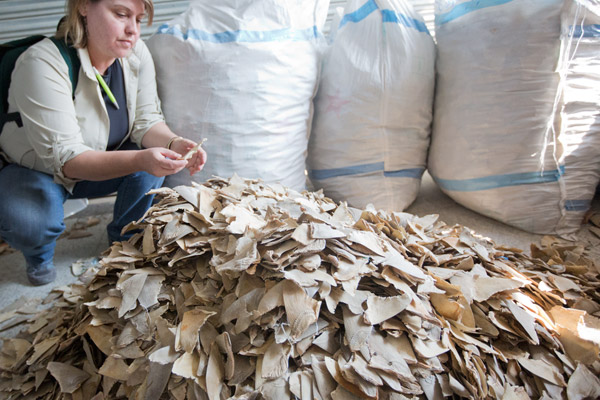 Shark fins are usually sliced off the animal while its still alive. Photo by: WildAid/Hilton. Shark fin demand has dropped precipitously in China in just a few years, according to a new report by WildAid. The wildlife NGO has spearheaded a major media campaign, incorporating celebrities like Yao Ming, to raise awareness about the impacts […]
Shark fins are usually sliced off the animal while its still alive. Photo by: WildAid/Hilton. Shark fin demand has dropped precipitously in China in just a few years, according to a new report by WildAid. The wildlife NGO has spearheaded a major media campaign, incorporating celebrities like Yao Ming, to raise awareness about the impacts […]
China failing to take effective action against timber smugglers
 Shipment of Malagasy rosewood intercepted in Sri Lanka in early April 2014. Courtesy of Sri Lanka Customs. Voluntary guidelines established by the Chinese government won’t be enough to curb rampant timber smuggling by Chinese companies, putting ‘responsible’ actors at risk of having their reputations tarnished, argues a new campaign by the Environmental Investigation Agency (EIA). […]
Shipment of Malagasy rosewood intercepted in Sri Lanka in early April 2014. Courtesy of Sri Lanka Customs. Voluntary guidelines established by the Chinese government won’t be enough to curb rampant timber smuggling by Chinese companies, putting ‘responsible’ actors at risk of having their reputations tarnished, argues a new campaign by the Environmental Investigation Agency (EIA). […]
Chinese poachers caught with 555 marine turtles, most dead (PHOTOS)
 Dead sea turtles confiscated by the Philippine National Police (PNP). Photo by: PNP-SBU/PIA. On Friday, eleven Chinese fishermen were caught by Filipino police with 555 marine turtles, 378 of which were dead. Officials in the Philippines have since released the 177 living turtles. But the incident has sparked an international standoff between the Philippines and […]
Dead sea turtles confiscated by the Philippine National Police (PNP). Photo by: PNP-SBU/PIA. On Friday, eleven Chinese fishermen were caught by Filipino police with 555 marine turtles, 378 of which were dead. Officials in the Philippines have since released the 177 living turtles. But the incident has sparked an international standoff between the Philippines and […]
China pledges $10 million to combat poaching in Africa
 The Chinese Premier, Li Keqiang, has pledged $10 million [see note below] to combat poaching in Africa during a visit to the African Union headquarters in Addis Ababa. The fund is a part of a much larger loan package for the continent from China, totaling $10 billion in credit and $2 billion in aid. The […]
The Chinese Premier, Li Keqiang, has pledged $10 million [see note below] to combat poaching in Africa during a visit to the African Union headquarters in Addis Ababa. The fund is a part of a much larger loan package for the continent from China, totaling $10 billion in credit and $2 billion in aid. The […]
Illegal logging makes up 70 percent of Papua New Guinea’s timber industry
 Aerial view of jungle river on the island of New Guinea. Photo by: Rhett A. Butler. Corruption, weak governance, and powerful timber barons are illegally stripping the forests of Papua New Guinea, according to a new report from the Chatham House. The policy institute finds that 70 percent of logging in Papua New Guinea is […]
Aerial view of jungle river on the island of New Guinea. Photo by: Rhett A. Butler. Corruption, weak governance, and powerful timber barons are illegally stripping the forests of Papua New Guinea, according to a new report from the Chatham House. The policy institute finds that 70 percent of logging in Papua New Guinea is […]
Investigation finds Chinese factory slaughters 600 whale sharks a year
 Living whale shark. All photos courtesy of WildLifeRisk A four-year investigation by WildLifeRisk, a Hong Kong-based marine conservation group, has found that a single factory in China’s Zhejiang Province slaughters some 600 whale sharks a year to produce oil for cosmetics and health supplements. While trade in whale shark products is prohibited under the the […]
Living whale shark. All photos courtesy of WildLifeRisk A four-year investigation by WildLifeRisk, a Hong Kong-based marine conservation group, has found that a single factory in China’s Zhejiang Province slaughters some 600 whale sharks a year to produce oil for cosmetics and health supplements. While trade in whale shark products is prohibited under the the […]
Hong Kong to destroy 4,000 dead elephants’ worth of ivory
 Elephants in Namibia. Photo by Rhett A. Butler The government of Hong Kong will destroy 28 tons of ivory confiscated from traffickers, reports CNN. The announcement, which comes just weeks after China destroyed six tons of seized ivory, suggests that the leaders of the world’s largest market for ivory may be getting more serious about […]
Elephants in Namibia. Photo by Rhett A. Butler The government of Hong Kong will destroy 28 tons of ivory confiscated from traffickers, reports CNN. The announcement, which comes just weeks after China destroyed six tons of seized ivory, suggests that the leaders of the world’s largest market for ivory may be getting more serious about […]
Anti-elephant poaching story goes viral in China
 Elephant in South Africa. Photo by Rhett A. Butler. A newspaper story about the impact of the ivory trade has gone viral in China, raising awareness among millions of Chinese, reports the Wildlife Conservation Society (WCS). The story, published November 15 in Southern Weekly, has been shared widely across Chinese web sites and social media, […]
Elephant in South Africa. Photo by Rhett A. Butler. A newspaper story about the impact of the ivory trade has gone viral in China, raising awareness among millions of Chinese, reports the Wildlife Conservation Society (WCS). The story, published November 15 in Southern Weekly, has been shared widely across Chinese web sites and social media, […]
China bans shark fin, bird’s nest soup from state banquets
 Great white shark in South Africa. China has banned shark fin and bird’s nest soup from being served at official state banquets, reports Chinese state media. The move, announced Sunday via a notice from the Community Party’s Central Committee and the State Council, is part of a broader move to crack down on corruption and […]
Great white shark in South Africa. China has banned shark fin and bird’s nest soup from being served at official state banquets, reports Chinese state media. The move, announced Sunday via a notice from the Community Party’s Central Committee and the State Council, is part of a broader move to crack down on corruption and […]
Illegal timber, rhino horn, elephant ivory seized in raids across Africa
 Illegal elephant ivory. Courtesy of Interpol Raids in southern and eastern Africa yielded a stash of contraband linked to poaching and illegal logging, reports Interpol, which coordinated the operation. The month-long operation, which took place from late September to late October, was conducted under Interpol’s Project Wisdom and Project Leaf programs, which aim to combat […]
Illegal elephant ivory. Courtesy of Interpol Raids in southern and eastern Africa yielded a stash of contraband linked to poaching and illegal logging, reports Interpol, which coordinated the operation. The month-long operation, which took place from late September to late October, was conducted under Interpol’s Project Wisdom and Project Leaf programs, which aim to combat […]
Indonesia’s national airline carrier bans shark fins
 Indonesia’s flag carrier won’t transport shark fins any more Indonesia’s national carrier Garuda Indonesia has joined a growing number of airlines looking to curb the international shark fin trade by banning the transport of shark fins and other shark products on their aircraft. WWF-Indonesia, which helped campaign for the ban, called the new Garuda policy […]
Indonesia’s flag carrier won’t transport shark fins any more Indonesia’s national carrier Garuda Indonesia has joined a growing number of airlines looking to curb the international shark fin trade by banning the transport of shark fins and other shark products on their aircraft. WWF-Indonesia, which helped campaign for the ban, called the new Garuda policy […]
China to build $17B worth of dams in Indonesian Borneo
Two Chinese companies — China Power Investment Corporation and Anhui Conch Cement — will invest $17 billion in dams in North Kalimantan, Indonesia’s newest province located on the island of Borneo, reports the Jakarta Globe. The Indonesian government granted permission for the project on the Tayan River late last month. Indonesia’s Energy and Mineral Resources […]
Elephants massacred for ivory in Central African Republic
 As anticipated earlier in the week by conservationists, poachers enter Dzanga Bai and slaughter dozens elephants for ivory. Dozens of elephants have been slaughtered in the Dzanga Bai World Heritage Site in the Central African Republic just days after conservationists warned about an impending threat from the movement of 17 heavily armed poachers. The massacre […]
As anticipated earlier in the week by conservationists, poachers enter Dzanga Bai and slaughter dozens elephants for ivory. Dozens of elephants have been slaughtered in the Dzanga Bai World Heritage Site in the Central African Republic just days after conservationists warned about an impending threat from the movement of 17 heavily armed poachers. The massacre […]
China ‘looting’ Africa of its fish
 Just 9% of the millions of tonnes of fish caught by China’s giant fishing fleet in African and other international waters is officially reported to the UN, say researchers using a new way to estimate the size and value of catches. Fisheries experts have long considered that the catches reported by China to the UN’s […]
Just 9% of the millions of tonnes of fish caught by China’s giant fishing fleet in African and other international waters is officially reported to the UN, say researchers using a new way to estimate the size and value of catches. Fisheries experts have long considered that the catches reported by China to the UN’s […]
China’s hunger for resources has big environmental impact in Latin America
 Gold mining in the Peruvian Amazon Amazonian forest cleared in Ecuador, a mountain leveled in Peru, the Cerrado savannah converted to soy fields in Brazil and oil fields under development in Venezuela’s Orinoco belt. These recent reports of environmental degradation in Latin America may be thousands of miles apart in different countries and for different […]
Gold mining in the Peruvian Amazon Amazonian forest cleared in Ecuador, a mountain leveled in Peru, the Cerrado savannah converted to soy fields in Brazil and oil fields under development in Venezuela’s Orinoco belt. These recent reports of environmental degradation in Latin America may be thousands of miles apart in different countries and for different […]
China’s 80 billion-a-year chopstick habit impacts forests
China’s surging demand for disposable chopsticks is taking an increasing toll on the country’s forests, reports Chinese state media. According to Bai Guangxin, chairman of Jilin Forestry Industry Group, China produces 80 billion disposable chopsticks per year, up sharply from the 57 billion estimated by the state forestry administration in 2010. Bai told Xinhua that […]
62% of all Africa’s forest elephants killed in 10 years (warning: graphic images)
 Forest elephant in Gabon More than 60 percent of Africa’s forest elephants have been killed in the past decade due to the ivory trade, reports a new study published in the online journal PLOS ONE. The study warns that the diminutive elephant species — genetically distinct from the better-known savanna elephant — is rapidly heading […]
Forest elephant in Gabon More than 60 percent of Africa’s forest elephants have been killed in the past decade due to the ivory trade, reports a new study published in the online journal PLOS ONE. The study warns that the diminutive elephant species — genetically distinct from the better-known savanna elephant — is rapidly heading […]
New illegal logging ban in EU could sever all ties with companies working in DRC
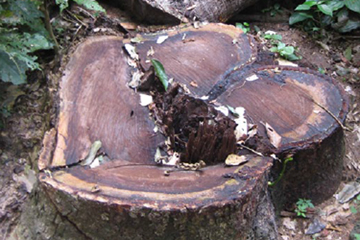 Yesterday, the EU joined the U.S. and Australia in banning all timber that was illegally harvested abroad. The new regulation could have a major impact on where the EU sources its timber, and no where more so than the Democratic Republic of Congo (DRC). According to a new report by Greenpeace, the DRC’s current moratorium […]
Yesterday, the EU joined the U.S. and Australia in banning all timber that was illegally harvested abroad. The new regulation could have a major impact on where the EU sources its timber, and no where more so than the Democratic Republic of Congo (DRC). According to a new report by Greenpeace, the DRC’s current moratorium […]
Elephant and Rhino issues to be debated at CITES 16th Conference of Parties
 Part 2 of 3PART 1: Overview | PART 2: Reflections of CITES Secretary-General John Scanlon This interview is an excerpt from The WildLife with Laurel Neme, a program that explores the mysteries of the animal world through interviews with scientists and other wildlife investigators. “The WildLife” airs every Monday from 1-2 pm EST on WOMM-LP, […]
Part 2 of 3PART 1: Overview | PART 2: Reflections of CITES Secretary-General John Scanlon This interview is an excerpt from The WildLife with Laurel Neme, a program that explores the mysteries of the animal world through interviews with scientists and other wildlife investigators. “The WildLife” airs every Monday from 1-2 pm EST on WOMM-LP, […]
Elephant massacre in the Democratic Republic of the Congo
 Guards from the Okapi Faunal Reserve with confiscated ivory from poachers. Credit: Okapi Conservation Project A key Congo wildlife reserve has lost 75 percent of its elephants in just 15 years due to poaching to meet Asian demand for ivory, reports a new survey by the Wildlife Conservation Society (WCS) and Democratic Republic of the […]
Guards from the Okapi Faunal Reserve with confiscated ivory from poachers. Credit: Okapi Conservation Project A key Congo wildlife reserve has lost 75 percent of its elephants in just 15 years due to poaching to meet Asian demand for ivory, reports a new survey by the Wildlife Conservation Society (WCS) and Democratic Republic of the […]
Chinese government creating secret demand for tiger trade alleges NGO (warning: graphic images)
 Tiger bodies in freezer in Guilin Tiger Bear Farm. Photo by: Belinda Wright/WPSI. The number of tigers being captive bred in China for consumption exceed those surviving in the wild—across 13 countries—by over a third, according to a new report by the Environmental Investigation Agency (EIA). The report, Hidden in Plain Sight, alleges that while […]
Tiger bodies in freezer in Guilin Tiger Bear Farm. Photo by: Belinda Wright/WPSI. The number of tigers being captive bred in China for consumption exceed those surviving in the wild—across 13 countries—by over a third, according to a new report by the Environmental Investigation Agency (EIA). The report, Hidden in Plain Sight, alleges that while […]
Nitrogen pollution in China increased 60% annually between 1980 and 2010
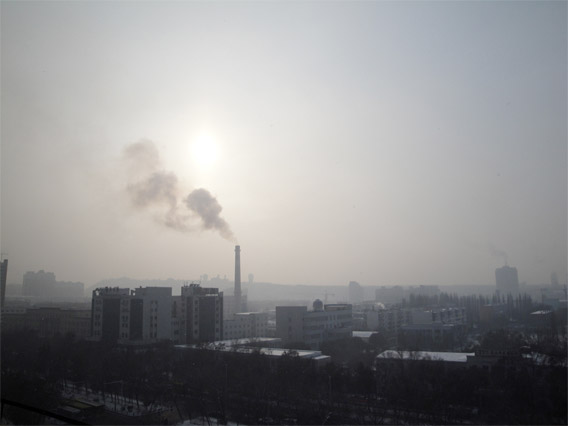 Heavy air pollution, smog and deposition of N in the city centre of Urumqi, China. Credit: Mr. Liu Xuejun Nitrogen deposited on land and water in China increased 60 percent annually from the 1980s to the 2000s due to rising use of fertilizer, growth in livestock production, increased coal burning, and a sharp rise in […]
Heavy air pollution, smog and deposition of N in the city centre of Urumqi, China. Credit: Mr. Liu Xuejun Nitrogen deposited on land and water in China increased 60 percent annually from the 1980s to the 2000s due to rising use of fertilizer, growth in livestock production, increased coal burning, and a sharp rise in […]
Religion, Chinese government drive global elephant slaughter
 The 3rd Annual New York Wildlife Conservation Film Festival (WFCC.org) runs from January 30 – February 2, 2013. Ahead of the event, Mongabay.com is running a series of Q&As with filmmakers and presenters. For more interviews, please see our WCFF feed. Elephant in Kenya. Photo by Rhett A. Butler. By some estimates, more than 30,000 […]
The 3rd Annual New York Wildlife Conservation Film Festival (WFCC.org) runs from January 30 – February 2, 2013. Ahead of the event, Mongabay.com is running a series of Q&As with filmmakers and presenters. For more interviews, please see our WCFF feed. Elephant in Kenya. Photo by Rhett A. Butler. By some estimates, more than 30,000 […]
Rhino poaching hits new record in 2012
 Indian rhino with its horn sawed off. A cut-off horn may help keep poachers away, but doesn’t guarantee it. Photo: Rhett A. Butler. 668 rhinos were killed in South Africa during 2012 according to new figures released by the South African government. The total, which represents a 49 percent rise over the 448 killed in […]
Indian rhino with its horn sawed off. A cut-off horn may help keep poachers away, but doesn’t guarantee it. Photo: Rhett A. Butler. 668 rhinos were killed in South Africa during 2012 according to new figures released by the South African government. The total, which represents a 49 percent rise over the 448 killed in […]
African governments and China must respond as ivory trade reaches preposterous proportions
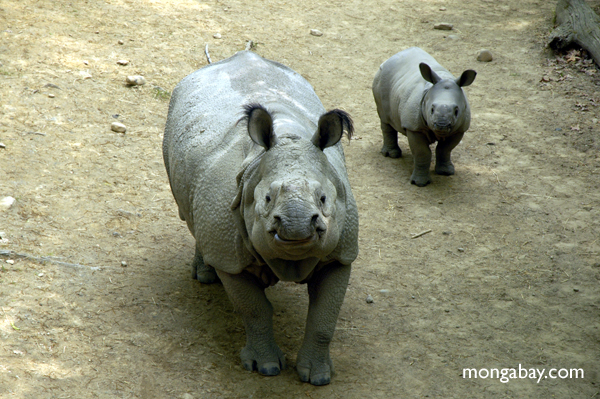 Indian one-horned rhinos. Photo by Rhett Butler. Royal Malaysian Customs have just announced the seizure of 24 tons of ivory in Port Klang. This is the largest-ever seizure of ivory in transit through the country. The 1,500 pieces of ivory came from over 750 elephants and were exported from Togo, a tiny west African country […]
Indian one-horned rhinos. Photo by Rhett Butler. Royal Malaysian Customs have just announced the seizure of 24 tons of ivory in Port Klang. This is the largest-ever seizure of ivory in transit through the country. The 1,500 pieces of ivory came from over 750 elephants and were exported from Togo, a tiny west African country […]
Malaysia intercepts 24 tons of elephant ivory being smuggled to China
 Photo by Rhett Butler. Malaysian authorities made their largest-ever ivory bust after uncovering 24 tons of “white gold” hidden in crates designed to look like stacks of sawn wood. The street value of the ivory may exceed $25 million. The ivory comes from over 750 elephants, according to conservationist Paula Kahumbu. The shipment originated in […]
Photo by Rhett Butler. Malaysian authorities made their largest-ever ivory bust after uncovering 24 tons of “white gold” hidden in crates designed to look like stacks of sawn wood. The street value of the ivory may exceed $25 million. The ivory comes from over 750 elephants, according to conservationist Paula Kahumbu. The shipment originated in […]
‘Exporting deforestation’: China is the kingpin of illegal logging
-EIA.568.jpg) Logs smuggled across the border from Myanmar to China. Photo © : EIA. Runaway economic growth comes with costs: in the case of China’s economic engine, one of them has been the world’s forests. According to a new report by the Environmental Investigation Agency (EIA), China has become the number one importer of illegal wood […]
Logs smuggled across the border from Myanmar to China. Photo © : EIA. Runaway economic growth comes with costs: in the case of China’s economic engine, one of them has been the world’s forests. According to a new report by the Environmental Investigation Agency (EIA), China has become the number one importer of illegal wood […]
Hong Kong authorities intercept shipment with 200 dead elephants’ worth of ivory
 Officials in Hong Kong have made a second major ivory bust in less than a month, reports the Associated Press. Customs agents at Hong Kong’s port on Thursday discovered 1.33 tons of ivory tusks hidden among some 400 bags of sunflower seeds in a shipping container. The street value of the contraband is estimated at […]
Officials in Hong Kong have made a second major ivory bust in less than a month, reports the Associated Press. Customs agents at Hong Kong’s port on Thursday discovered 1.33 tons of ivory tusks hidden among some 400 bags of sunflower seeds in a shipping container. The street value of the contraband is estimated at […]
Foreign loggers and corrupt officials flouting logging moratorium in the Democratic Republic of Congo
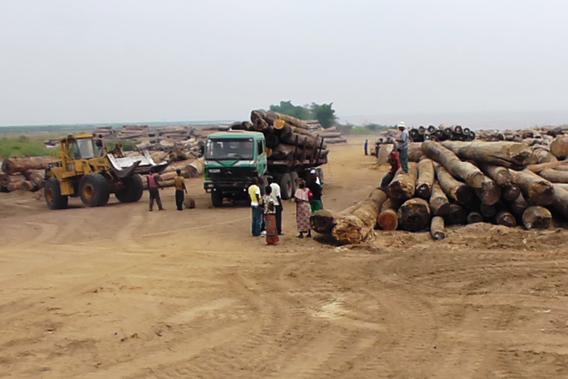 Raw logs cut with artisanal permits at Kinkole port near Kinshasa. Photo courtesy of Global Witness. In 2002 the Democratic Republic of Congo (DRC) announced a moratorium on commercial logging in a bid to save rapidly falling forests, however a new report by Global Witness alleges that industrial loggers are finding a way around the […]
Raw logs cut with artisanal permits at Kinkole port near Kinshasa. Photo courtesy of Global Witness. In 2002 the Democratic Republic of Congo (DRC) announced a moratorium on commercial logging in a bid to save rapidly falling forests, however a new report by Global Witness alleges that industrial loggers are finding a way around the […]
China’s timber imports plunge
Imports of logs and timber to China plunged 19 percent during the first eight months of 2012 relative to the same period a year earlier reports the Wood Resource Quarterly. The slowdown is attributed to a drop in demand due to reduced construction. China imported $4.3 billion worth of logs and lumber through the end […]
Corruption still plundering forests in Laos for furniture
 Deforestation in Laos for a rubber plantation. Raw logs from such deforestation often make their way to Vietnam. Photo by: Rhett A. Butler. The forests of Lao are still suffering from widespread destruction with the government turning a blind eye to a thriving black market logging trade on the border of Laos and Vietnam, according […]
Deforestation in Laos for a rubber plantation. Raw logs from such deforestation often make their way to Vietnam. Photo by: Rhett A. Butler. The forests of Lao are still suffering from widespread destruction with the government turning a blind eye to a thriving black market logging trade on the border of Laos and Vietnam, according […]
Wildlife trade bans may be worsening trafficking of some species, argues paper
 Malayan tiger. Photo by Rhett A. Butler. While founded with good intentions, wildlife trade bans may in some cases be worsening the plight of some endangered species, argues a commentary published in the journal Tropical Conservation Science. Looking at three animals listed under the CITES (Convention on International Trade in Endangered Species of Wild Fauna […]
Malayan tiger. Photo by Rhett A. Butler. While founded with good intentions, wildlife trade bans may in some cases be worsening the plight of some endangered species, argues a commentary published in the journal Tropical Conservation Science. Looking at three animals listed under the CITES (Convention on International Trade in Endangered Species of Wild Fauna […]
Religious fervor drives elephant slaughter
 Legal ivory trade failing to protect elephants The legal ivory trade is failing to protect elephants which are being slaughtered en mass across the African continent to meet demand for religious trinkets, argues a new investigative report published in National Geographic by Bryan Christy. The report, researched and written over a three year period, looked […]
Legal ivory trade failing to protect elephants The legal ivory trade is failing to protect elephants which are being slaughtered en mass across the African continent to meet demand for religious trinkets, argues a new investigative report published in National Geographic by Bryan Christy. The report, researched and written over a three year period, looked […]
Yuppies are killing rhinos, tigers, elephants
 Average rhino horn consumer: wealthy urban male in Asia between the ages of 25-45 Yao Ming walks with Kinango, an infant elephant whose mother was killed by poachers at the David Sheldrick Wildlife Trust in Kenya. Photo by: Kristian Schmidt/WildAid. Yuppies, not elderly rural consumer, are driving the trade that is decimating some of the […]
Average rhino horn consumer: wealthy urban male in Asia between the ages of 25-45 Yao Ming walks with Kinango, an infant elephant whose mother was killed by poachers at the David Sheldrick Wildlife Trust in Kenya. Photo by: Kristian Schmidt/WildAid. Yuppies, not elderly rural consumer, are driving the trade that is decimating some of the […]
Guilty pleas in NYC ivory bust
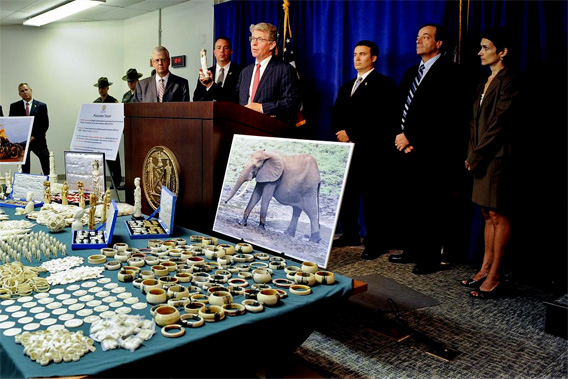 Pictured: Ivory seized by Manhattan District Attorney’s Office, New York State Department of Environmental Conservation, and the United States Fish and Wildlife Service Two ivory dealers pled guilty to trafficking some $2 million worth of elephant ivory. According to Manhattan District Attorney Cyrus R. Vance, Jr., Mukesh Gupta pled guilty to one count of Illegal […]
Pictured: Ivory seized by Manhattan District Attorney’s Office, New York State Department of Environmental Conservation, and the United States Fish and Wildlife Service Two ivory dealers pled guilty to trafficking some $2 million worth of elephant ivory. According to Manhattan District Attorney Cyrus R. Vance, Jr., Mukesh Gupta pled guilty to one count of Illegal […]
The rarest rhino’s last stand
- Trekking through deep mud and sawgrass we find a stinking wallow.
- The elite rangers, dressed completely in black despite the tropical heat, mark the site with the GPS unit, measure the mucky puddle’s depth, and move on.
- This is the first sign of one of the planet’s rarest animals—the Javan rhino.
- Only 35 or so remain, including none in captivity. This patch of rainforest and swamp in Ujung Kulon National Park—on the very tip of West Java—is their last and only refuge.
Rangers now allowed to shoot tiger poachers on sight in Indian state
 In the wake of a surge in tiger poaching, the state government of Maharashtra, India will no longer consider the shooting of wildlife poachers by forest rangers a crime, reports the Associated Press. Rangers will not should not be “booked for human rights violations when they have taken action against poachers,” said Maharashtra Forest Minister […]
In the wake of a surge in tiger poaching, the state government of Maharashtra, India will no longer consider the shooting of wildlife poachers by forest rangers a crime, reports the Associated Press. Rangers will not should not be “booked for human rights violations when they have taken action against poachers,” said Maharashtra Forest Minister […]
Charting a new environmental course in China
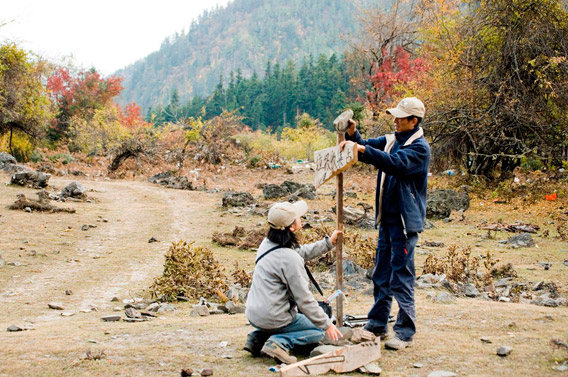 An interview with the Nature Conservancy’s China Program. TNC staff and volunteers repairing signage at Meili Snow Mountain National Park in northwest Yunnan. Community benefits and ecotourism are at the heart of TNC’s program to establish national parks in China. Photo by: Tang Ling. Founded in 1951, The Nature Conservancy (TNC) works in more than […]
An interview with the Nature Conservancy’s China Program. TNC staff and volunteers repairing signage at Meili Snow Mountain National Park in northwest Yunnan. Community benefits and ecotourism are at the heart of TNC’s program to establish national parks in China. Photo by: Tang Ling. Founded in 1951, The Nature Conservancy (TNC) works in more than […]
Papua New Guinea halts controversial nickel mine – for now
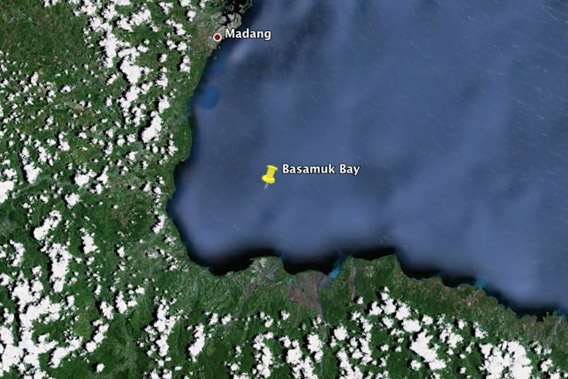 Basamuk Bay in Madang, Papua New Guinea. Photo produced using Google Earth. A massive, controversial nickel mine has been shut down in Papua New Guinea due to the environmental concerns of its slurry pipeline, reports Cultural Survival. Inspections of the 83 mile (134 kilometer) slurry pipeline found that it had been built too close to […]
Basamuk Bay in Madang, Papua New Guinea. Photo produced using Google Earth. A massive, controversial nickel mine has been shut down in Papua New Guinea due to the environmental concerns of its slurry pipeline, reports Cultural Survival. Inspections of the 83 mile (134 kilometer) slurry pipeline found that it had been built too close to […]
Elephant massacre in Cameroon (warning: graphic photo)
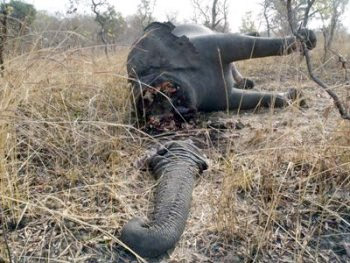 More than 200 elephants have been slaughtered for their tusks in less than a month in Cameroon, reports the International Fund for Animal Welfare (IFAW). The group blames Sudanese poachers for cross-border raids from Chad into Bouba Ndjida National Park in northern Cameroon. “The ivory is smuggled out of West and Central Africa for markets […]
More than 200 elephants have been slaughtered for their tusks in less than a month in Cameroon, reports the International Fund for Animal Welfare (IFAW). The group blames Sudanese poachers for cross-border raids from Chad into Bouba Ndjida National Park in northern Cameroon. “The ivory is smuggled out of West and Central Africa for markets […]
Tropical ecologist: Australia must follow U.S. and EU in banning illegally logged wood
 Illegally logged tree in Indonesia. Photo by: Rhett A. Butler. Australia should join the widening effort to stamp out illegal logging, according to testimony given this week by tropical ecologist William Laurance with James Cook University. Presenting before the Australian Senate’s rural affairs committee, Laurance argued that the massive environmental and economic costs of illegal […]
Illegally logged tree in Indonesia. Photo by: Rhett A. Butler. Australia should join the widening effort to stamp out illegal logging, according to testimony given this week by tropical ecologist William Laurance with James Cook University. Presenting before the Australian Senate’s rural affairs committee, Laurance argued that the massive environmental and economic costs of illegal […]
Elephant poachers kill unarmed wildlife ranger in Kenya
 Juvenile African bush elephant in Kenya. Photo by: Rhett A. Butler. Abdullahi Mohammed, an wildlife ranger, was killed in the line of duty in Kenya this weekend by elephant poachers. A ranger with the conservation organization Wildlife Works, Mohammed was shot by poachers in Wildlife Works Kasigau Corridor project, a REDD program (Reduced Emissions From […]
Juvenile African bush elephant in Kenya. Photo by: Rhett A. Butler. Abdullahi Mohammed, an wildlife ranger, was killed in the line of duty in Kenya this weekend by elephant poachers. A ranger with the conservation organization Wildlife Works, Mohammed was shot by poachers in Wildlife Works Kasigau Corridor project, a REDD program (Reduced Emissions From […]
Camera traps snap first ever photo of Myanmar snub-nosed monkey
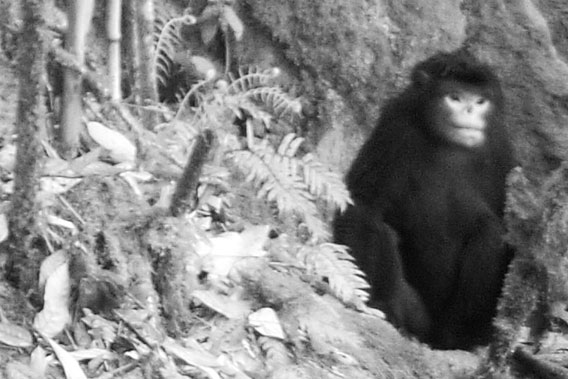 Close-up from world’s first photo of a living Myanmar snub-nosed monkey. Photo by: FFI/BANCA/PRCF. In 2010 researchers described a new species of primate that reportedly sneezes when it rains. Unfortunately, the new species was only known from a carcass killed by a local hunter. Now, however, remote camera traps have taken the first ever photo […]
Close-up from world’s first photo of a living Myanmar snub-nosed monkey. Photo by: FFI/BANCA/PRCF. In 2010 researchers described a new species of primate that reportedly sneezes when it rains. Unfortunately, the new species was only known from a carcass killed by a local hunter. Now, however, remote camera traps have taken the first ever photo […]
Will ‘sustainable’ palm oil sell in China?
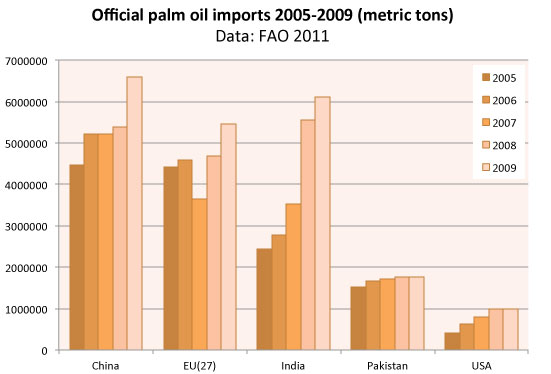 Owing to the high yield of the African oil palm tree, palm oil is today the cheapest commercial source of edible oil. But oil palm expansion in recent decades has at times had high indirect costs, including destruction of biologically diverse rainforests and further marginalization of forest-dependent people, especially in southeast Asia. Concerns over the […]
Owing to the high yield of the African oil palm tree, palm oil is today the cheapest commercial source of edible oil. But oil palm expansion in recent decades has at times had high indirect costs, including destruction of biologically diverse rainforests and further marginalization of forest-dependent people, especially in southeast Asia. Concerns over the […]
World’s most endangered primate still losing habitat
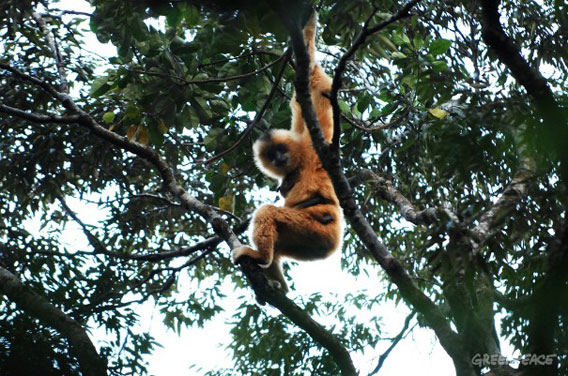 One of the very last Hainan gibbons (Nomascus hainanus), this one is a female. Photo courtesy of: Greenpeace. Just twenty-three Hainan gibbons (Nomascus hainanus) survive in the world. Confined to a single protected area on a lone island, Hainan gibbons are losing their habitat at a steady rate of 20 hectares per day finds a […]
One of the very last Hainan gibbons (Nomascus hainanus), this one is a female. Photo courtesy of: Greenpeace. Just twenty-three Hainan gibbons (Nomascus hainanus) survive in the world. Confined to a single protected area on a lone island, Hainan gibbons are losing their habitat at a steady rate of 20 hectares per day finds a […]
China’s imports of hardwood chips hit record volume
Chinese pulp mills are importing record amounts of hardwood chips from Vietnam, Thailand and Indonesia, reports the Wood Resource Quarterly, an industry trade journal. Growing imports are the product of rapid expansion of pulp production and lack of domestic fiber sources in China, according to the Wood Resource Quarterly. China’s pulp mills predominantly consume hardwood […]
The dam-maker: China involved in 289 dam projects worldwide
China is currently involved in 289 hydroelectric projects worldwide, as reported by International Rivers. Most of the dams are planned for hydropower, and over half are considered ‘large’ projects. The list includes completed dams, one currently under construction, and ones in early planning stages. While dams are often considered ‘green’ power, those in the tropics […]
Losing our pigs and our ancestors: threats to the livelihoods and environment of Papua New Guinea
 In 1968, distinguished anthropologist Roy Rappaport wrote a seminal publication of human ecology: “Pigs for the Ancestors: Rituals in the Ecology of a New Guinea People” which integrated cultural ritual with the necessity of maintaining pre-existing relationships with the environment. Documenting the behavior activities of the Tsembaga Maring tribe in the Highlands of Papua New […]
In 1968, distinguished anthropologist Roy Rappaport wrote a seminal publication of human ecology: “Pigs for the Ancestors: Rituals in the Ecology of a New Guinea People” which integrated cultural ritual with the necessity of maintaining pre-existing relationships with the environment. Documenting the behavior activities of the Tsembaga Maring tribe in the Highlands of Papua New […]
New Zealand’s log exports to China surging
New Zealand’s log exports to China are surging, reports the Wood Resource Quarterly. Log exports from New Zealand in 2011 are running 25 percent of last year’s rate and are expected to hit a record. Total log exports may reach 13 million cubic meters, which would represent a doubling over 2008. One third of New […]
Costa Rican fishermen plundering Colombian waters for sharks
Costa Rican fishermen have killed some 2,000 sharks in Colombian waters off Malpelo island, a protected area renowned for its marine life, reports Colombia Reports. Sandra Bessudo, special advisor on biodiversity to Colombia President Juan Manuel Santos, said that Costa Rican boats have been setting long lines near Malpelo. The fishermen cut off the fins […]
Public opposition pushes Myanmar to suspend giant Chinese dam
 Large-scale opposition has pushed the Myanmar government to suspend construction of a massive Chinese dam. Being built on the confluence of the Mayhka amd Malihka rivers at the head of Irrawaddy River, the Myitsone Dam would have created a reservoir the size of Singapore and has already pushed 12,000 people off their land. China Power […]
Large-scale opposition has pushed the Myanmar government to suspend construction of a massive Chinese dam. Being built on the confluence of the Mayhka amd Malihka rivers at the head of Irrawaddy River, the Myitsone Dam would have created a reservoir the size of Singapore and has already pushed 12,000 people off their land. China Power […]
Rhino poaching on record pace
 One-horned rhino (Rhinoceros unicornis) with its horn cut off to protect it from poachers Nearly 200 rhinos have been killed in South Africa through the first six months of 2011, reports TRAFFIC, the wildlife trade monitoring network. Statistics from South Africa’s national parks department show that rhino poaching is on track to break 2010’s record […]
One-horned rhino (Rhinoceros unicornis) with its horn cut off to protect it from poachers Nearly 200 rhinos have been killed in South Africa through the first six months of 2011, reports TRAFFIC, the wildlife trade monitoring network. Statistics from South Africa’s national parks department show that rhino poaching is on track to break 2010’s record […]
Laos announces crackdown on illegal logging, timber smuggling
 Laos Prime Minister Thongsing Thammavong ordered authorities to crack down on illegal logging and timber trafficking in the midst of accelerating forest loss, reports the Vientiane Times. Under Thongsing’s directive, police and the Ministry of Agriculture and Forestry will set up inspection teams on roads that run to China and Vietnam, the destination of most […]
Laos Prime Minister Thongsing Thammavong ordered authorities to crack down on illegal logging and timber trafficking in the midst of accelerating forest loss, reports the Vientiane Times. Under Thongsing’s directive, police and the Ministry of Agriculture and Forestry will set up inspection teams on roads that run to China and Vietnam, the destination of most […]
Traditional Chinese medicine trade takes toll on Indonesia’s geckos
 This commentary original appeared at the Jakarta Globe as Where Have All the Geckos Gone? and has been posted here with the permission of the authors. The call of the tokek, or gecko, is one of the most familiar sounds in Indonesia. Next to the smell of clove cigarettes, the calls to prayer, the friendly […]
This commentary original appeared at the Jakarta Globe as Where Have All the Geckos Gone? and has been posted here with the permission of the authors. The call of the tokek, or gecko, is one of the most familiar sounds in Indonesia. Next to the smell of clove cigarettes, the calls to prayer, the friendly […]
China failing commitment to save tigers
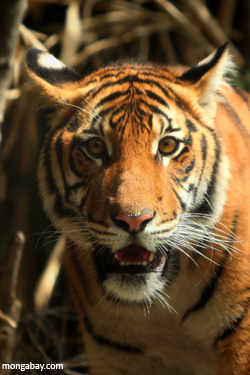 Chinese Premier Wen Jiabao pledged that China would work with other nations to end the trade in tiger parts and revive tiger populations at the Global Tiger Forum last fall, but the country has since fallen short of its commitments, says an environmental group. The Environmental Investigation Agency (EIA) has written to Premier Jiabao to […]
Chinese Premier Wen Jiabao pledged that China would work with other nations to end the trade in tiger parts and revive tiger populations at the Global Tiger Forum last fall, but the country has since fallen short of its commitments, says an environmental group. The Environmental Investigation Agency (EIA) has written to Premier Jiabao to […]
China’s log, sawnwood imports jump
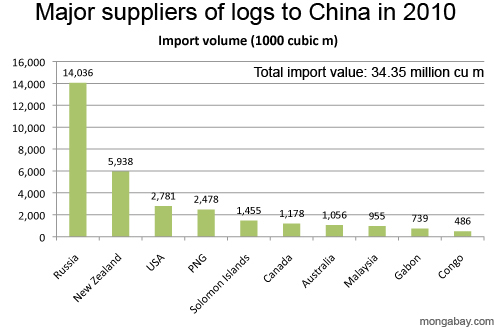 China imported $6.1 billion worth of logs in 2010, a 22.4 percent increase over 2009, according to the country’s customs bureau. Russia dominated the trade, accounting for 41 percent by volume and 30 percent by value. New Zealand (17.3 percent and 13.1 percent, respectively) and the United States (8.1 percent and 9.6 percent) were second […]
China imported $6.1 billion worth of logs in 2010, a 22.4 percent increase over 2009, according to the country’s customs bureau. Russia dominated the trade, accounting for 41 percent by volume and 30 percent by value. New Zealand (17.3 percent and 13.1 percent, respectively) and the United States (8.1 percent and 9.6 percent) were second […]
From the Serengeti to Lake Natron: is the Tanzanian government aiming to destroy its wildlife and lands?
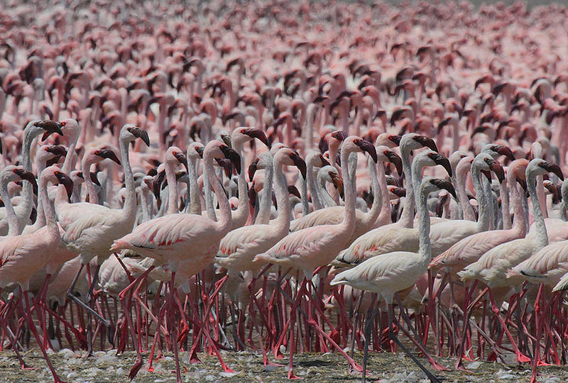 Thousands of lesser flamingoes (Phoenicopterus minor) crowd in Lake Bogoria in Kenya. Nearly all of these flamingoes will breed in Tanzania’s Lake Natron, now a proposed site for soda ash mining. Photo by: Steve Garvie. What’s happening in Tanzania? This is a question making the rounds in conservation and environmental circles. Why is a nation […]
Thousands of lesser flamingoes (Phoenicopterus minor) crowd in Lake Bogoria in Kenya. Nearly all of these flamingoes will breed in Tanzania’s Lake Natron, now a proposed site for soda ash mining. Photo by: Steve Garvie. What’s happening in Tanzania? This is a question making the rounds in conservation and environmental circles. Why is a nation […]
5 million hectares of Papua New Guinea forests handed to foreign corporations
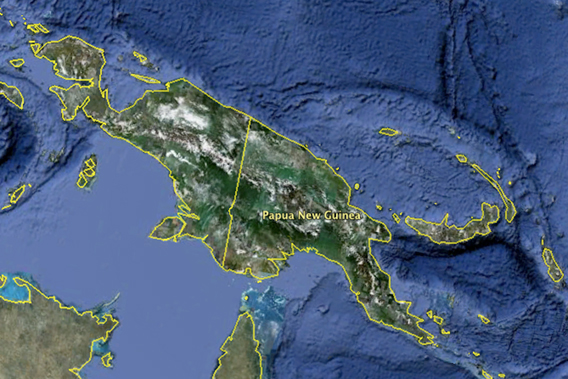 Papua New Guinea, as viewed from Google Earth, covers the eastern half of the island of New Guinea, as well as other Pacific Islands. During a meeting in March 2011 twenty-six experts—from biologists to social scientists to NGO staff—crafted a statement calling on the Papua New Guinea government to stop granting Special Agricultural and Business […]
Papua New Guinea, as viewed from Google Earth, covers the eastern half of the island of New Guinea, as well as other Pacific Islands. During a meeting in March 2011 twenty-six experts—from biologists to social scientists to NGO staff—crafted a statement calling on the Papua New Guinea government to stop granting Special Agricultural and Business […]
‘Land grab’ fears in Africa legitimate
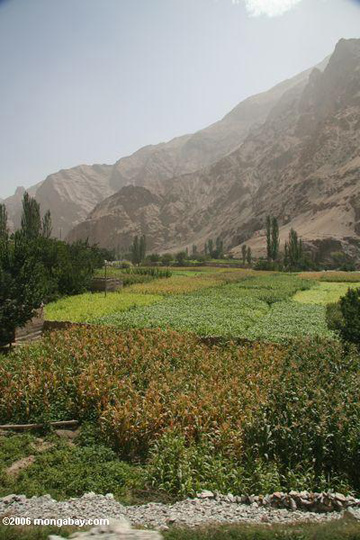 ‘Land grab’ fears in Africa legitimate A new report by the International Institute for Environment and Development (IIED) has found that recent large-scale land deals in Africa are likely to provide scant benefit to some of the world’s poorest and most famine-prone nations and will probably create new social and environmental problems. Analyzing 12 recent […]
‘Land grab’ fears in Africa legitimate A new report by the International Institute for Environment and Development (IIED) has found that recent large-scale land deals in Africa are likely to provide scant benefit to some of the world’s poorest and most famine-prone nations and will probably create new social and environmental problems. Analyzing 12 recent […]
Good stewards of forests at home outsource deforestation abroad
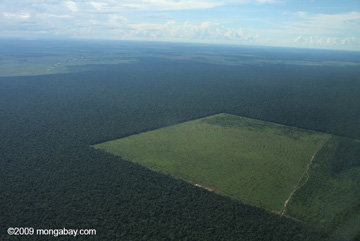 As more nations adopt better laws and policies to save and restore forests at home, they may, in fact, be outsourcing deforestation to other parts of the world, according to a new study in the Proceedings of the National Academy of Sciences (PNAS). Looking at six developing nations where forests are recovering—instead of receding—the study […]
As more nations adopt better laws and policies to save and restore forests at home, they may, in fact, be outsourcing deforestation to other parts of the world, according to a new study in the Proceedings of the National Academy of Sciences (PNAS). Looking at six developing nations where forests are recovering—instead of receding—the study […]
Picture: new monkey discovered in Myanmar
 New primate is on the edge of extinction. With no photos yet of a living Myanmar snub-nosed monkey, this image was reconstructed using Photoshop, based on a Yunnan snub-nosed monkey and the carcass of the newly discovered species, the Myanmar snub-nosed monkey. Image by: Dr. Thomas Geissmann. Hunters’ reports have led scientists to discover a […]
New primate is on the edge of extinction. With no photos yet of a living Myanmar snub-nosed monkey, this image was reconstructed using Photoshop, based on a Yunnan snub-nosed monkey and the carcass of the newly discovered species, the Myanmar snub-nosed monkey. Image by: Dr. Thomas Geissmann. Hunters’ reports have led scientists to discover a […]
The $1M bed: why Madagascar’s rainforests are being destroyed
 Consumer demand for rosewood furniture and musical instruments is driving illegal logging in Madagascar’s national parks, endangering wildlife and undermining local community livelihoods, according to a new report from the Environmental Investigation Agency (EIA) and Global Witness. The report, based on more than a year of investigations, shows that Madagascar’s valuable hardwoods—including ebony, pallisander, and […]
Consumer demand for rosewood furniture and musical instruments is driving illegal logging in Madagascar’s national parks, endangering wildlife and undermining local community livelihoods, according to a new report from the Environmental Investigation Agency (EIA) and Global Witness. The report, based on more than a year of investigations, shows that Madagascar’s valuable hardwoods—including ebony, pallisander, and […]
Foreign corporations devastating Papua New Guinea rainforests
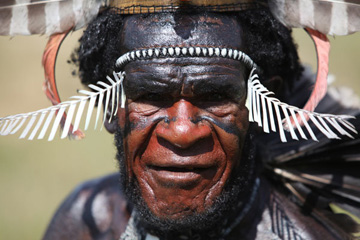 A letter in Nature from seven top scientists warns that Papua New Guinea’s accessible forest will be lost or heavily logged in just ten to twenty years if swift action isn’t taken. A potent mix of poor governance, corruption, and corporate disregard is leading to the rapid loss of Papua New Guinea’s much-heralded rainforests, home […]
A letter in Nature from seven top scientists warns that Papua New Guinea’s accessible forest will be lost or heavily logged in just ten to twenty years if swift action isn’t taken. A potent mix of poor governance, corruption, and corporate disregard is leading to the rapid loss of Papua New Guinea’s much-heralded rainforests, home […]
Interpol pounces on tiger traffickers
INTERPOL, the world’s largest international police organization, is stepping up the fight to end the illegal tiger trade. A two-month law enforcement operation coordinated by INTERPOL resulted in the arrest of 25 individuals suspected of taking part in the booming trade in tiger parts and derivatives. The effort involved national enforcement agencies in six tiger-range […]
The Nestlé example: how responsible companies could end deforestation
 An interview with Scott Poynton of The Forest Trust. The NGO, The Forest Trust (TFT), made international headlines this year after food giant Nestlé chose them to monitor their sustainability efforts. Nestlé’s move followed a Greenpeace campaign that blew-up into a blistering free-for-all on social media sites. For months Nestle was dogged online not just […]
An interview with Scott Poynton of The Forest Trust. The NGO, The Forest Trust (TFT), made international headlines this year after food giant Nestlé chose them to monitor their sustainability efforts. Nestlé’s move followed a Greenpeace campaign that blew-up into a blistering free-for-all on social media sites. For months Nestle was dogged online not just […]
Pedagang Cina Takut Akan Peraturan Impor Baru Atas Kayu Ilegal
China Timber and Wood Products Circulation Association (CTWPCA) berusaha mendirikan suatu badan untuk membantu para importir mengikuti peraturan lingkungan baru di Amerika Serikat dan Eropa yang melarang perdagangan kayu yang ditebang secara ilegal, menurut laporan International Tropical Timber Organization (ITTO). Dalam edisi Tropical Timber Market Report 16-31 Agustus, ITTO melaporkan bahwa importir Cina takut gagal […]
Chinese traders fear new import restrictions on illegal timber
The China Timber and Wood Products Circulation Association (CTWPCA) is seeking to establish a body to help importers navigate new environmental regulations in the United States and Europe that restrict trade in illegally logged timber, reports the International Tropical Timber Organization (ITTO). In its August 16-31 Tropical Timber Market Report, ITTO reports that Chinese importers […]
Secret titanium mine threatens Cambodia’s most untouched forest
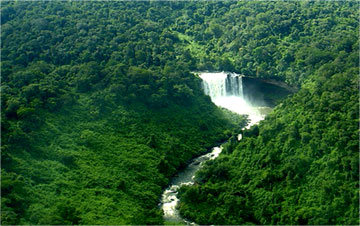 Although the mining consortium, United Khmer Group, has been drawing up plans to build a massive titanium mine in a Cambodian protected forest for three years, the development did not become public knowledge until rural villagers came face-to-face with bulldozers and trucks building access roads. Reaction against the secret mine was swift as environmentalists feared […]
Although the mining consortium, United Khmer Group, has been drawing up plans to build a massive titanium mine in a Cambodian protected forest for three years, the development did not become public knowledge until rural villagers came face-to-face with bulldozers and trucks building access roads. Reaction against the secret mine was swift as environmentalists feared […]
Meski Menurun, Pembalakan Liar Masih Masalah Besar
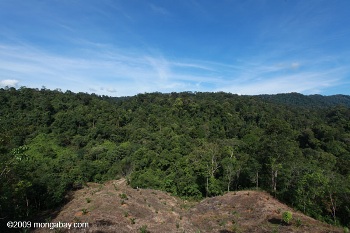 Laporan terbaru dari Chatham House mengungkapkan pembalakan liar di hutan tropis nasional di seluruh dunia secara umum menurun. Temuan ini membuktikan regulasi-regulasi baru dan usaha internasional dalam memerangi pembalakan liar berdampak positif. Menurut laporan tersebut, total kayu ilegal yang dihasilkan di seluruh dunia turun hingga 22% sejak tahun 2002. Chatham House juga menyebutkan negara penghasil […]
Laporan terbaru dari Chatham House mengungkapkan pembalakan liar di hutan tropis nasional di seluruh dunia secara umum menurun. Temuan ini membuktikan regulasi-regulasi baru dan usaha internasional dalam memerangi pembalakan liar berdampak positif. Menurut laporan tersebut, total kayu ilegal yang dihasilkan di seluruh dunia turun hingga 22% sejak tahun 2002. Chatham House juga menyebutkan negara penghasil […]
Timber barons linked to illegal logging in Indonesian New Guinea
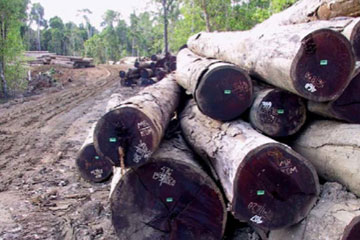 Timber barons are illegally exploiting Indonesia’s increasingly threatened lowland rainforests on the island of New Guinea for merbau wood, found an undercover investigation conducted by the Environmental Investigation Agency (EIA) and its Indonesian partner Telapak. The sting, launched after Indonesian customs officers discovered 23 containers of merbau logs during a routine inspection in October 2009 […]
Timber barons are illegally exploiting Indonesia’s increasingly threatened lowland rainforests on the island of New Guinea for merbau wood, found an undercover investigation conducted by the Environmental Investigation Agency (EIA) and its Indonesian partner Telapak. The sting, launched after Indonesian customs officers discovered 23 containers of merbau logs during a routine inspection in October 2009 […]
Citibank’s shark fin soup promotion draws ire, ends early
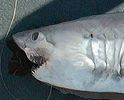 Citibank Hong Kong has canceled its promotion of shark fin soup after activists cried foul, according to the New York Times. The branch had offered Citibank card holders 15 percent off a shark fin soup dinner at Maxim’s Chinese Cuisine for the month of July. But the bank has since canceled the promotion early after […]
Citibank Hong Kong has canceled its promotion of shark fin soup after activists cried foul, according to the New York Times. The branch had offered Citibank card holders 15 percent off a shark fin soup dinner at Maxim’s Chinese Cuisine for the month of July. But the bank has since canceled the promotion early after […]
The growing impacts of China’s oil spill
 Two oil pipelines exploded Friday in the Chinese province of Liaoning beginning China’s worst oil spill; nearly a week later 400,000 gallons of oil have spread over 166 square miles, according to China’s state media. The pipeline has since been fixed and is operating again. While the spill is small compared to the BP oil […]
Two oil pipelines exploded Friday in the Chinese province of Liaoning beginning China’s worst oil spill; nearly a week later 400,000 gallons of oil have spread over 166 square miles, according to China’s state media. The pipeline has since been fixed and is operating again. While the spill is small compared to the BP oil […]
Cina Sita Sekitar 2.000 Trenggiling yang Diperdagangkan Ilegal
 Memasuki sebuah kapal pengangkut parang pagi-pagi di tanggal 6 Juni, pegawai bea cukai menemukan 2.090 trenggiling beku dan 92 bungkus sisik trenggiling, seberat 3.960 pound. Dijalankan oleh lima orang Cina dan satu Malaysia, kapal tersebut sedang menunggu instruksi melalui telepon satelit untuk bertemu dengan kapal lain untuk transfer kargo ilegal saat masih di laut. “Penggunaan […]
Memasuki sebuah kapal pengangkut parang pagi-pagi di tanggal 6 Juni, pegawai bea cukai menemukan 2.090 trenggiling beku dan 92 bungkus sisik trenggiling, seberat 3.960 pound. Dijalankan oleh lima orang Cina dan satu Malaysia, kapal tersebut sedang menunggu instruksi melalui telepon satelit untuk bertemu dengan kapal lain untuk transfer kargo ilegal saat masih di laut. “Penggunaan […]
Illegal logging declining worldwide, but still ‘major problem’
 Global production of illegal timber down by 22 percent from 2002. A new report by the Chatham House finds that illegal logging in tropical forest nation is primarily on the decline, providing evidence that new laws and international efforts on the issue are having a positive impact. According to the report, the total global production […]
Global production of illegal timber down by 22 percent from 2002. A new report by the Chatham House finds that illegal logging in tropical forest nation is primarily on the decline, providing evidence that new laws and international efforts on the issue are having a positive impact. According to the report, the total global production […]
China seizes over 2,000 illegally trafficked pangolins
 Boarding a suspect fishing vessel in the early morning of June 6th, Chinese customs officials discovered 2,090 frozen pangolins and 92 cases of pangolin scales, weighing an astounding 3,960 pounds. Manned by five Chinese and one Malaysian national, the boat was awaiting instructions via satellite phone as to where to meet another ship to transfer […]
Boarding a suspect fishing vessel in the early morning of June 6th, Chinese customs officials discovered 2,090 frozen pangolins and 92 cases of pangolin scales, weighing an astounding 3,960 pounds. Manned by five Chinese and one Malaysian national, the boat was awaiting instructions via satellite phone as to where to meet another ship to transfer […]
Dangerous and exploitative: a look at pet wild cats
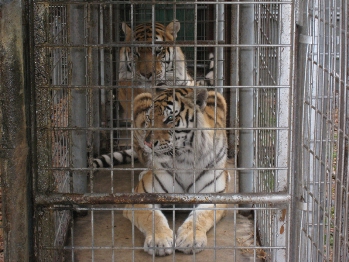 Lisa Tekancic, president of the WildCat Conservation Legal Aid Society spoke with Laurel Neme on her “The WildLife” radio show and podcast about captive wildcats and the wildcat pet trade. During her interview, Lisa describes the history of wildcats in captivity—from the Roman spectator games and royal menageries—to their current status as private pets; for […]
Lisa Tekancic, president of the WildCat Conservation Legal Aid Society spoke with Laurel Neme on her “The WildLife” radio show and podcast about captive wildcats and the wildcat pet trade. During her interview, Lisa describes the history of wildcats in captivity—from the Roman spectator games and royal menageries—to their current status as private pets; for […]
Tiger farming and traditional Chinese medicine
 Grace Ge Gabriel, Asia Regional Director for the International Fund for Animal Welfare (IFAW) spoke with Laurel Neme on her “The WildLife” radio show and podcast about tiger conservation the international trade in tiger parts, and how the booming industry of tiger farms in China is killing to make a living. This interview originally aired […]
Grace Ge Gabriel, Asia Regional Director for the International Fund for Animal Welfare (IFAW) spoke with Laurel Neme on her “The WildLife” radio show and podcast about tiger conservation the international trade in tiger parts, and how the booming industry of tiger farms in China is killing to make a living. This interview originally aired […]
12,000 Critically Endangered antelopes found dead
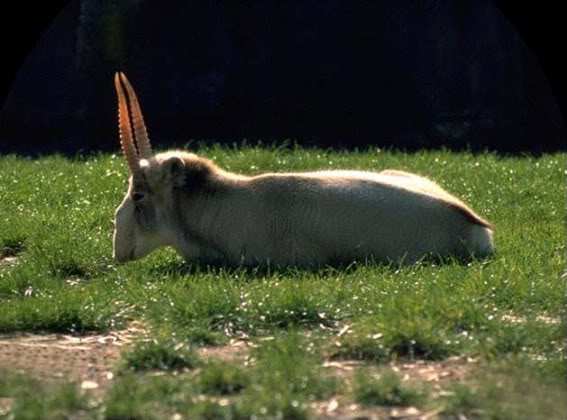 The Ural population of the Critically Endangered saiga, a curious-looking Asian antelope, has been decimated by an unknown assailant. 12,000 saigas, mostly females and their calves, were found dead in western Kazakhstan reports the Saiga Conservation Alliance. Researchers are currently investigating the cause of the deaths. However, they have linked the mass mortality to a […]
The Ural population of the Critically Endangered saiga, a curious-looking Asian antelope, has been decimated by an unknown assailant. 12,000 saigas, mostly females and their calves, were found dead in western Kazakhstan reports the Saiga Conservation Alliance. Researchers are currently investigating the cause of the deaths. However, they have linked the mass mortality to a […]
Buku anak-anak tentang hutan hujan terkait dengan perusakan hutan hujan
Membeli buku anak-anak kemungkinan sebabkan penggundulan hutan di hutan hujan padat karbon dan keragamanhayati secara langsung, menurut laporan baru dari Rainforest Action Network (RAN). Dalam penemuan yang menggarisbawahi ironi masalah tersebut, RAN bahkan menemukan bahwa buku tentang perlindungan hutan hujan mengandung serat dari hutan di Indonesia. Setelah menguji serat kertas dari 30 buku anak-anak, RAN […]
Plight of the Bengal: India awakens to the reality of its tigers—and their fate
 An Interview with Belinda Wright, Founder & Executive Director of the Wildlife Protection Society of India (www.wpsi-india.org) Over the past 100 years wild tiger numbers have declined 97% worldwide. In India, where there are 39 tiger reserves and 663 protected areas, there may be only 1,400 wild tigers left, according to a 2008 census, and […]
An Interview with Belinda Wright, Founder & Executive Director of the Wildlife Protection Society of India (www.wpsi-india.org) Over the past 100 years wild tiger numbers have declined 97% worldwide. In India, where there are 39 tiger reserves and 663 protected areas, there may be only 1,400 wild tigers left, according to a 2008 census, and […]
A total ban on primary forest logging needed to save the world, an interview with activist Glen Barry
 Radical, controversial, ahead-of-his-time, brilliant, or extremist: call Dr. Glen Barry, the head of Ecological Internet, what you will, but there is no question that his environmental advocacy group has achieved major successes in the past years, even if many of these are below the radar of big conservation groups and mainstream media. “We tend to […]
Radical, controversial, ahead-of-his-time, brilliant, or extremist: call Dr. Glen Barry, the head of Ecological Internet, what you will, but there is no question that his environmental advocacy group has achieved major successes in the past years, even if many of these are below the radar of big conservation groups and mainstream media. “We tend to […]
India menjadi pembeli minyak kelapa terbesar
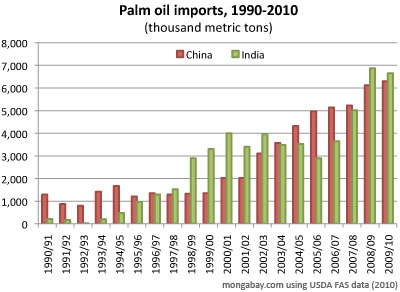 India mengalahkan Cina sebagai pembeli minyak kelapa terbesar di dunia pada tahun 2009, tulis Bloomberg. Berdasarkan angka-angka dari Solvent Extractors’ Association di India, kelompok prosesor berbasis di Mumbai, India mengimpor 7 juta metrik ton minyak kelapa pada tahun 2009. Cina mengimpor 6,4 juta ton tahun lalu. B.V Mehta, direktur eksekutif dari asosiasi, mengatakan bahwa kenaikan […]
India mengalahkan Cina sebagai pembeli minyak kelapa terbesar di dunia pada tahun 2009, tulis Bloomberg. Berdasarkan angka-angka dari Solvent Extractors’ Association di India, kelompok prosesor berbasis di Mumbai, India mengimpor 7 juta metrik ton minyak kelapa pada tahun 2009. Cina mengimpor 6,4 juta ton tahun lalu. B.V Mehta, direktur eksekutif dari asosiasi, mengatakan bahwa kenaikan […]
Children’s books about rainforests linked to rainforest destruction
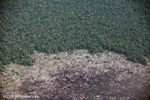 Purchasing a children’s book may be directly causing deforestation of biodiverse and carbon-heavy rainforests, according to a new report by the Rainforest Action Network (RAN). In a discovery that highlights the irony of the issue, RAN even found children’s books about protecting rainforests contained fiber from Indonesian forests. Testing paper fiber from 30 children’s books, […]
Purchasing a children’s book may be directly causing deforestation of biodiverse and carbon-heavy rainforests, according to a new report by the Rainforest Action Network (RAN). In a discovery that highlights the irony of the issue, RAN even found children’s books about protecting rainforests contained fiber from Indonesian forests. Testing paper fiber from 30 children’s books, […]
Researchers: Madagascar rosewoods deserve CITES protection
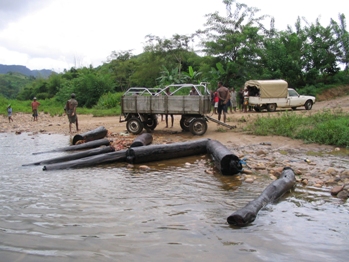 A new policy paper in Science warns that several species of Madagascar’s rosewood could be pushed to extinction due to a current illegal logging crisis on the island. These hardwood species should be considered for protection under Convention of International Trade in Endangered Species of Wild Fauna and Flora (CITES), the researchers conclude. “Forty-seven of […]
A new policy paper in Science warns that several species of Madagascar’s rosewood could be pushed to extinction due to a current illegal logging crisis on the island. These hardwood species should be considered for protection under Convention of International Trade in Endangered Species of Wild Fauna and Flora (CITES), the researchers conclude. “Forty-seven of […]
A nation of tragedies: the unseen elephant wars of Chad
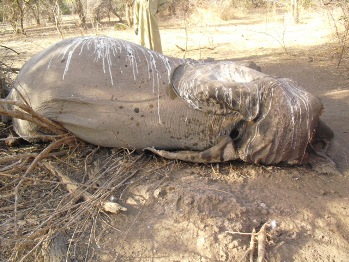 Chad’s few remaining elephants are “survivors of a ‘holocaust'”. [warning: graphic images of killed elephants] Stephanie Vergniault, head of SOS Elephants in Chad, says she has seen more beheaded corpses of elephants in her life than living animals. In the central African nation, against the backdrop of a vast human tragedy—poverty, hunger, violence, and hundreds […]
Chad’s few remaining elephants are “survivors of a ‘holocaust'”. [warning: graphic images of killed elephants] Stephanie Vergniault, head of SOS Elephants in Chad, says she has seen more beheaded corpses of elephants in her life than living animals. In the central African nation, against the backdrop of a vast human tragedy—poverty, hunger, violence, and hundreds […]
Poachers kill world’s rarest rhino in Vietnam
 Poachers have killed a Javan rhino in Vietnam for its horn according to the World Wildlife Fund (WWF). With only an estimated 60 individuals left the Javan rhino is the world’s rarest and classified by the IUCN Red List as Critically Endangered. The rhino was found dead from a gunshot wound and its horn cut […]
Poachers have killed a Javan rhino in Vietnam for its horn according to the World Wildlife Fund (WWF). With only an estimated 60 individuals left the Javan rhino is the world’s rarest and classified by the IUCN Red List as Critically Endangered. The rhino was found dead from a gunshot wound and its horn cut […]
Half a trillion spent on fossil fuel subsidies mostly “a complete waste of money”
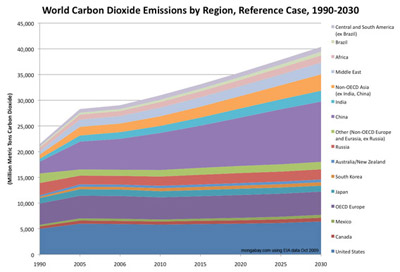 Despite a warming planet linked to the burning of fossil fuels, governments around the world still spend 500 billion US dollars a year subsidizing fossil fuel industries. A new study from the Global Subsidies Initiative (GSI) of the International Institute for Sustainable Development looks at the difficult political situation behind ending fossil fuel subsidies. “Fossil […]
Despite a warming planet linked to the burning of fossil fuels, governments around the world still spend 500 billion US dollars a year subsidizing fossil fuel industries. A new study from the Global Subsidies Initiative (GSI) of the International Institute for Sustainable Development looks at the difficult political situation behind ending fossil fuel subsidies. “Fossil […]
World failing on every environmental issue: an op-ed for Earth Day
 The biodiversity crisis, the climate crisis, the deforestation crisis: we are living in an age when environmental issues have moved from regional problems to global ones. A generation or two before ours and one might speak of saving the beauty of Northern California; conserving a single species—say the white rhino—from extinction; or preserving an ecological […]
The biodiversity crisis, the climate crisis, the deforestation crisis: we are living in an age when environmental issues have moved from regional problems to global ones. A generation or two before ours and one might speak of saving the beauty of Northern California; conserving a single species—say the white rhino—from extinction; or preserving an ecological […]
What happened to China?: the nation’s environmental woes and its future
 China has long been an example of what not to do to achieve environmentally sustainability. Ranking 133rd out of 146 countries in 2005 for environmental performance, China faces major environmental problems including severe air and water pollution, deforestation, water-issues, desertification, extinction, and overpopulation. A new article in Science discusses the complex issues that have led […]
China has long been an example of what not to do to achieve environmentally sustainability. Ranking 133rd out of 146 countries in 2005 for environmental performance, China faces major environmental problems including severe air and water pollution, deforestation, water-issues, desertification, extinction, and overpopulation. A new article in Science discusses the complex issues that have led […]
Environmental groups call on Delmas to cancel shipment of illegally logged wood from Madagascar
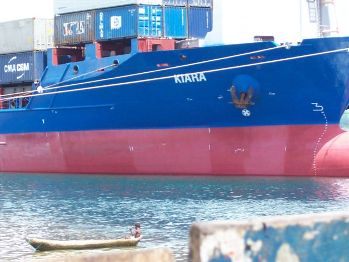 Pressure is building on the French shipping company Delmas to cancel large shipments of rosewood, which was illegally logged in Madagascar during the nation’s recent coup. Today two environmental groups, Global Witness and the Environmental Investigation Agency (EIA) called on Delmas to cancel the shipment, which is currently being loaded onto the Delmas operated ship […]
Pressure is building on the French shipping company Delmas to cancel large shipments of rosewood, which was illegally logged in Madagascar during the nation’s recent coup. Today two environmental groups, Global Witness and the Environmental Investigation Agency (EIA) called on Delmas to cancel the shipment, which is currently being loaded onto the Delmas operated ship […]
Thousands of tons of illegal timber in Madagascar readied for export
 As the President of France, Nicholas Sarkozy, argues in Paris that more funding is needed to stop deforestation and mitigate climate change, a shipment of illegal rosewood is being readied for export in Madagascar by a French company with the tacit approval of the French government. The shipment of some 4,000-5,000 tons of rosewood will […]
As the President of France, Nicholas Sarkozy, argues in Paris that more funding is needed to stop deforestation and mitigate climate change, a shipment of illegal rosewood is being readied for export in Madagascar by a French company with the tacit approval of the French government. The shipment of some 4,000-5,000 tons of rosewood will […]
Iceland leads world on environmental issues, but China, US, and Canada plummet
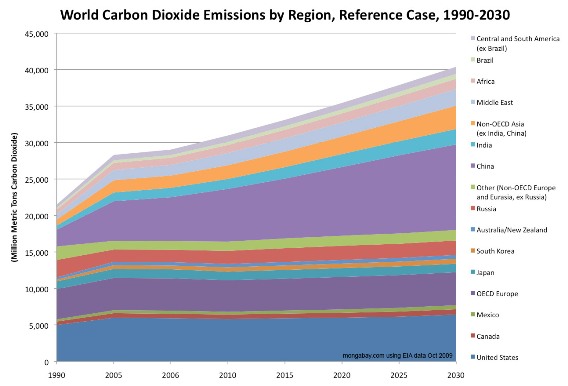 Evaluating 163 nations on their environmental performance, the Environmental Performance Index (EPI) has named Iceland the most environmental nation. Released every two years, the EPI also found that the world’s two largest super-powers—China and the US—have both fallen behind on confronting environmental challenges. Despite being at the top of the list, Iceland continues to face […]
Evaluating 163 nations on their environmental performance, the Environmental Performance Index (EPI) has named Iceland the most environmental nation. Released every two years, the EPI also found that the world’s two largest super-powers—China and the US—have both fallen behind on confronting environmental challenges. Despite being at the top of the list, Iceland continues to face […]
India becomes largest buyer of palm oil
 India surpassed China as the world’s largest buyer of palm oil in 2009, reports Bloomberg. According to figures from the Solvent Extractors’ Association of India, a processor group based in Mumbai, India imported 7 million metric tons of palm oil in 2009. China imported 6.4 million tons last year. B.V. Mehta, executive director of the […]
India surpassed China as the world’s largest buyer of palm oil in 2009, reports Bloomberg. According to figures from the Solvent Extractors’ Association of India, a processor group based in Mumbai, India imported 7 million metric tons of palm oil in 2009. China imported 6.4 million tons last year. B.V. Mehta, executive director of the […]
Malaysia and China agree to $11 billion deal to build mines, dams in Borneo
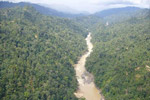 Malaysia and China have agreed to an $11 billion deal that will turn a vast area of Sarawak, a Malaysian state in northern Borneo, into an industrial corridor for mining and energy development, reports The Financial Times. The suite of projects includes at least four hydroelectric dams (up to 28,000MW of power), aluminum-smelting and steel […]
Malaysia and China have agreed to an $11 billion deal that will turn a vast area of Sarawak, a Malaysian state in northern Borneo, into an industrial corridor for mining and energy development, reports The Financial Times. The suite of projects includes at least four hydroelectric dams (up to 28,000MW of power), aluminum-smelting and steel […]
Rainforest conservation: a year in review
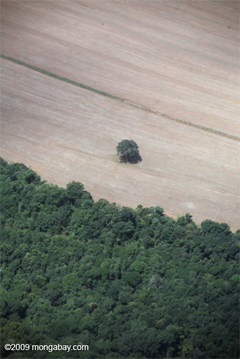 2009 may prove to be an important turning point for tropical forests. Lead by Brazil, which had the lowest extent of deforestation since at least the 1980s, global forest loss likely declined to its lowest level in more than a decade. Critical to the fall in deforestation was the global financial crisis, which dried up […]
2009 may prove to be an important turning point for tropical forests. Lead by Brazil, which had the lowest extent of deforestation since at least the 1980s, global forest loss likely declined to its lowest level in more than a decade. Critical to the fall in deforestation was the global financial crisis, which dried up […]
Major international banks, shipping companies, and consumers play key role in Madagascar’s logging crisis
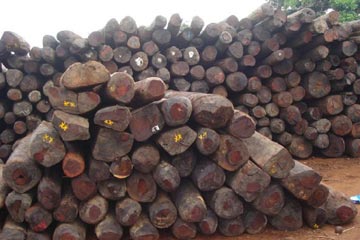 Illegal Logging and Impotent Government in Madagascar’s Northeast In the midst of cyclone season, a ‘dead’ period for tourism to Madagascar’s east coast, Vohémar, a sleepy town dominated by the vanilla trade, is abuzz. Vanilla prices have hardly ever been lower, but the hotels are full and the port is busy. “This afternoon, it was […]
Illegal Logging and Impotent Government in Madagascar’s Northeast In the midst of cyclone season, a ‘dead’ period for tourism to Madagascar’s east coast, Vohémar, a sleepy town dominated by the vanilla trade, is abuzz. Vanilla prices have hardly ever been lower, but the hotels are full and the port is busy. “This afternoon, it was […]
Hunting across Southeast Asia weakens forests’ survival, An interview with Richard Corlett
 Seventh in a series of interviews with participants at the 2009 Association of Tropical Biology and Conservation (ATBC) conference. A large flying fox eats a fruit ingesting its seeds. Flying over the tropical forests it eventually deposits the seeds at the base of another tree far from the first. One of these seeds takes root, […]
Seventh in a series of interviews with participants at the 2009 Association of Tropical Biology and Conservation (ATBC) conference. A large flying fox eats a fruit ingesting its seeds. Flying over the tropical forests it eventually deposits the seeds at the base of another tree far from the first. One of these seeds takes root, […]
Illegal logging trade from Myanmar to China slows, but doesn’t stop
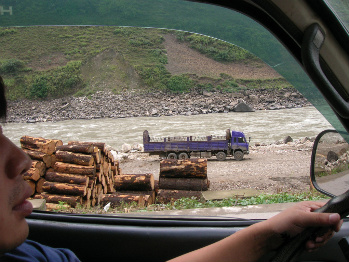 The illegal wood trade from Myanmar (also known as Burma) to China has slowed, but it still threatens Myanmar’s tropical forests and species, according to a new report by Global Witness. From 2005 and 2008 improved border controls into China led to a drop in imports of logs and sawn wood by 70 percent. “Clearly […]
The illegal wood trade from Myanmar (also known as Burma) to China has slowed, but it still threatens Myanmar’s tropical forests and species, according to a new report by Global Witness. From 2005 and 2008 improved border controls into China led to a drop in imports of logs and sawn wood by 70 percent. “Clearly […]
The Yangtze River may have lost another inhabitant: the Chinese paddlefish
- In December of 2006 it was announced that the Yangtze River dolphin, commonly known as the baiji, had succumbed to extinction.
- The dolphin had survived on earth for 20 million years, but the species couldn’t survive the combined onslaught of pollution, habitat loss, boat traffic, entanglement in fishing hooks, death from illegal electric fishing, and the construction of several massive dams.
- Now, another flagship species of the Yangtze River appears to have vanished.
Roads are enablers of rainforest destruction
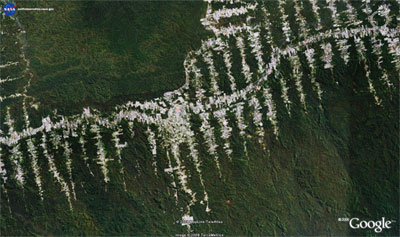 Chainsaws, bulldozers, and fires are tools of rainforest destruction, but roads are enablers. Roads link markets to resources, enabling loggers, farmers, ranchers, miners, and land speculators to convert remote forests into economic opportunities. But the ecological cost is high: 95 percent of deforestation in the Brazilian Amazon occurs within 50-kilometers of a road, while in […]
Chainsaws, bulldozers, and fires are tools of rainforest destruction, but roads are enablers. Roads link markets to resources, enabling loggers, farmers, ranchers, miners, and land speculators to convert remote forests into economic opportunities. But the ecological cost is high: 95 percent of deforestation in the Brazilian Amazon occurs within 50-kilometers of a road, while in […]
After declining 95% in 15 years, Saiga antelope begins to rebound with help from conservationists
 An interview with Elena Bykova, founder of the Saiga Conservation Alliance In a decline on par with that suffered by the American bison in the Nineteenth Century, in the 1990s the saiga antelope of the Central Asian steppe plummeted from over one million individuals to 50,000, dropping a staggering 95 percent in a decade and […]
An interview with Elena Bykova, founder of the Saiga Conservation Alliance In a decline on par with that suffered by the American bison in the Nineteenth Century, in the 1990s the saiga antelope of the Central Asian steppe plummeted from over one million individuals to 50,000, dropping a staggering 95 percent in a decade and […]
Saving the last megafauna of Malaysia, an interview with Reuben Clements
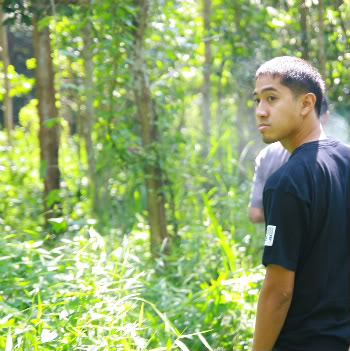 Reuben Clements is the species conservation manager for WWF-Malaysia’s Malayan tiger and Sumatran rhino projects. Mongabay.com’s fifth in a series of interviews with ‘Young Scientists’. And second in a series of interviews with participants at the 2009 Association of Tropical Biology and Conservation (ATBC) conference. Reuben Clements has achieved one success after another since graduating […]
Reuben Clements is the species conservation manager for WWF-Malaysia’s Malayan tiger and Sumatran rhino projects. Mongabay.com’s fifth in a series of interviews with ‘Young Scientists’. And second in a series of interviews with participants at the 2009 Association of Tropical Biology and Conservation (ATBC) conference. Reuben Clements has achieved one success after another since graduating […]
Gold mining threatens world’s most infamous reptile, the Komodo dragon
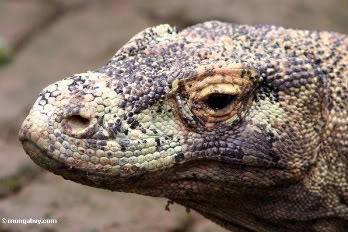
Lessons from the crisis in Madagascar, an interview with Erik Patel
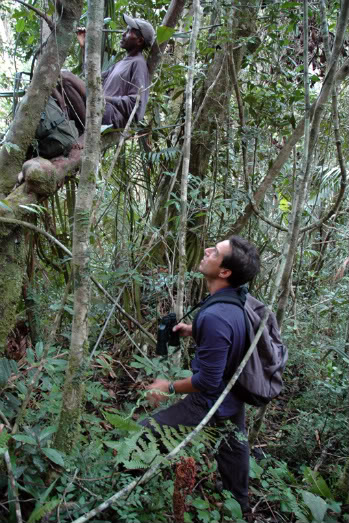
Chinese companies to be held liable for environmental damage caused overseas
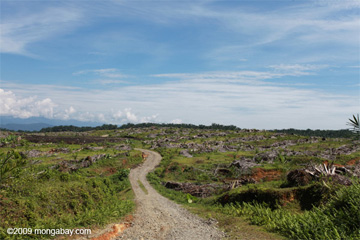 Chinese companies operating overseas may soon be held responsible for damage caused in their host countries, reports China state media. The Ministry of Environmental Protection (MEP) and the Ministry of Commerce (MOFCOM) have drafted a set of regulations that will apply to all Chinese companies operating abroad. Chinese companies will be required to comply with […]
Chinese companies operating overseas may soon be held responsible for damage caused in their host countries, reports China state media. The Ministry of Environmental Protection (MEP) and the Ministry of Commerce (MOFCOM) have drafted a set of regulations that will apply to all Chinese companies operating abroad. Chinese companies will be required to comply with […]
Indian tiger reserve no longer has tigers
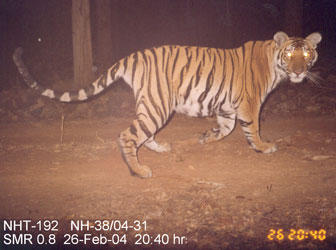 Panna National Park, one of India’s tiger reserves, no longer supports tigers, reports BBC News. State Minister of Forests Rajendra Shukla said a recent survey found the reserve no longer has any tigers. Three years ago it had 24. BBC reports Panna is the second tiger reserve in India where the tiger population has fallen […]
Panna National Park, one of India’s tiger reserves, no longer supports tigers, reports BBC News. State Minister of Forests Rajendra Shukla said a recent survey found the reserve no longer has any tigers. Three years ago it had 24. BBC reports Panna is the second tiger reserve in India where the tiger population has fallen […]
China to support greener palm oil
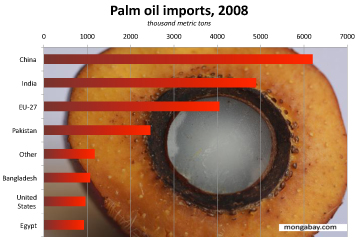 Comments from Chinese official don’t commit the world’s largest palm oil importer to buying eco-certified palm oil but suggest interest in the environmetal performance of the vegetable oil linked to widespread deforestation in southeast Asia. China-based producers and users of palm oil said they will provide more support for sustainable palm oil, reports WWF. The […]
Comments from Chinese official don’t commit the world’s largest palm oil importer to buying eco-certified palm oil but suggest interest in the environmetal performance of the vegetable oil linked to widespread deforestation in southeast Asia. China-based producers and users of palm oil said they will provide more support for sustainable palm oil, reports WWF. The […]
Pangolins threatened by illegal trade for traditional Chinese medicine
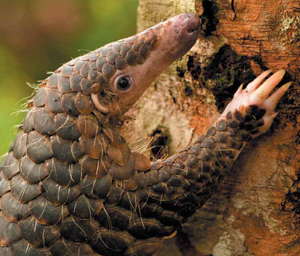 While their trade has been prohibited under the Convention on International Trade in Endangered Species of Wild Fauna and Flora (CITES) since 2002, Asian pangolin populations are rapidly declining due to poaching for use in traditional Chinese medicine, report conservationists. Trade has nearly wiped out the species in Cambodia, Viet Nam and Laos, once strongholds […]
While their trade has been prohibited under the Convention on International Trade in Endangered Species of Wild Fauna and Flora (CITES) since 2002, Asian pangolin populations are rapidly declining due to poaching for use in traditional Chinese medicine, report conservationists. Trade has nearly wiped out the species in Cambodia, Viet Nam and Laos, once strongholds […]
China to establish giant oil palm plantation in DR Congo
ZTE Agribusiness Company Ltd, a Chinese firm, plans to establish a one million hectare oil palm plantation in the Democratic Republic of Congo (DR Congo) for biofuel production, reports China state media. Zhang Peng, ZTE’s regional manager, told Xinhua that the plantation could yield up to 5 million tons of palm oil per year, 90 […]
International community calls for action against gangs’ illegal logging in Madagascar
Six nations and three conservation organizations have issued a statement calling for action against illegal logging in Madagascar’s protected areas. Following a political coup, in which former President Marc Ravalomanana was driven out of power and replaced by Andry Rajoelina, park rangers abandoned their positions and armed bands raided Marojejy and Masoala National Parks for […]
Rich countries buy up agricultural land in poor countries
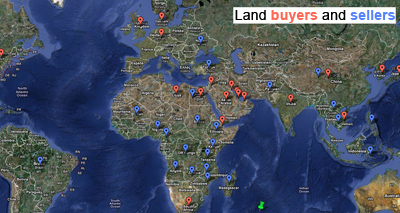 Over two-and-half million hectares in the Democratic Republic of the Congo; half a million hectares in Tanzania; and a quarter of a million hectares in Libya: these figures represent just some of the recent international land deals where wealthy countries buy up land in poorer nations for food, and sometimes biofuel, production. The controversial trend […]
Over two-and-half million hectares in the Democratic Republic of the Congo; half a million hectares in Tanzania; and a quarter of a million hectares in Libya: these figures represent just some of the recent international land deals where wealthy countries buy up land in poorer nations for food, and sometimes biofuel, production. The controversial trend […]
Vietnam’s commercial wildlife farms threaten Asia’s species
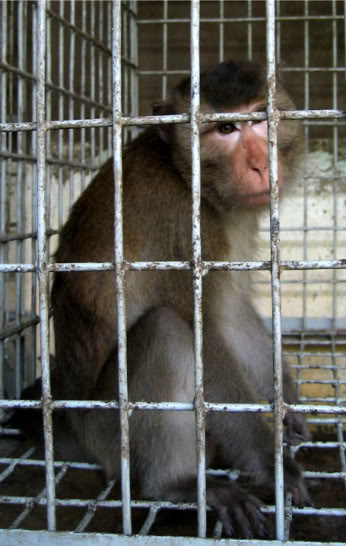 Commercial wildlife farms are not alleviating pressure on wild populations as claimed by proponents, but exacerbating the problem according to a new report by the Wildlife Conservation Society (WCS) and Vietnam’s Forest Protection Department. Such farms, which rear snakes, turtles, crocodiles, tigers, monkeys, and other—often rare—species, are meant to provide customers throughout Southeast Asia with […]
Commercial wildlife farms are not alleviating pressure on wild populations as claimed by proponents, but exacerbating the problem according to a new report by the Wildlife Conservation Society (WCS) and Vietnam’s Forest Protection Department. Such farms, which rear snakes, turtles, crocodiles, tigers, monkeys, and other—often rare—species, are meant to provide customers throughout Southeast Asia with […]
Approximately 200 new frogs discovered in Madagascar threatened by political instability
 Amid the amphibian extinction crisis—where amphibians worldwide are disappearing due to habitat loss, pollution, and a devastating fungal epidemic—the Spanish Scientific Research Council (CSIC) has announced some good news. In a survey of the island-nation of Madagascar they have identified between 129 and 221 new species of frogs. The discovery of so many new species […]
Amid the amphibian extinction crisis—where amphibians worldwide are disappearing due to habitat loss, pollution, and a devastating fungal epidemic—the Spanish Scientific Research Council (CSIC) has announced some good news. In a survey of the island-nation of Madagascar they have identified between 129 and 221 new species of frogs. The discovery of so many new species […]
The EU and Republic of Congo announce system to eradicate illegal logging
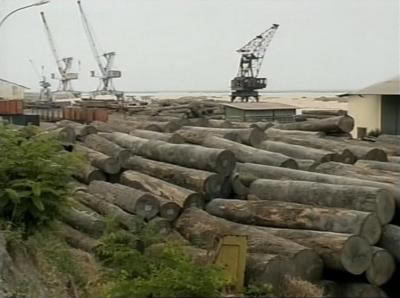 The Republic of Congo and the EU have announced a new system to ensure that by 2011 no illegal timber will reach European Union member nations from the Republic of Congo. Under the system all wood products will be required to carry a license showing that the timber was obtained legally. Approximately half of the […]
The Republic of Congo and the EU have announced a new system to ensure that by 2011 no illegal timber will reach European Union member nations from the Republic of Congo. Under the system all wood products will be required to carry a license showing that the timber was obtained legally. Approximately half of the […]
Gabonese environmental activist receives prize for standing up to government, Chinese company
 Marc Ona Essangui is a beloved environmental leader in his native Gabon, however by winning the prestigious Goldman Environmental Prize he is now being introduced to a larger audience: the world. Essangui received the prize for exposing unsavory truths about a deal between the Gabon government and a Chinese company, CMEC, to mine for iron […]
Marc Ona Essangui is a beloved environmental leader in his native Gabon, however by winning the prestigious Goldman Environmental Prize he is now being introduced to a larger audience: the world. Essangui received the prize for exposing unsavory truths about a deal between the Gabon government and a Chinese company, CMEC, to mine for iron […]
Illegal hunting in Laos takes toll on wildlife
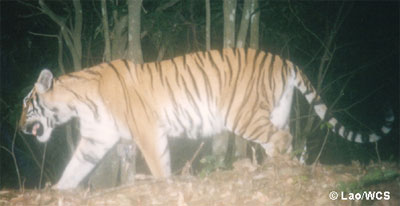 A condensed version of this article can be found at Yale e360. Deep in the rugged mountains of Nam Et-Phou Louey National Protected Area (NEPL) on the Laos–Vietnam border, men smoke cigarettes and talk in hushed voices as they tramp through the forest. Approaching a baited trap, they hear the frantic snarls of an ensnared […]
A condensed version of this article can be found at Yale e360. Deep in the rugged mountains of Nam Et-Phou Louey National Protected Area (NEPL) on the Laos–Vietnam border, men smoke cigarettes and talk in hushed voices as they tramp through the forest. Approaching a baited trap, they hear the frantic snarls of an ensnared […]
China’s emissions rise 45%, but Western demand accounts for 30% of increase
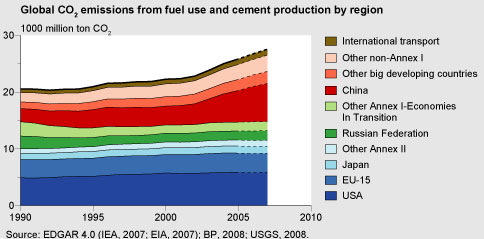
Wildlife trade creating ’empty forest syndrome’ across the globe
 China and USA largest importers of illegal wildlife goods For many endangered species it is not the lack of suitable habitat that has imperiled them, but hunting. In a talk at a Smithsonian Symposium on tropical forests, Elizabeth Bennett of the Wildlife Conservation Society (WCS) outlined the perils for many species of the booming and […]
China and USA largest importers of illegal wildlife goods For many endangered species it is not the lack of suitable habitat that has imperiled them, but hunting. In a talk at a Smithsonian Symposium on tropical forests, Elizabeth Bennett of the Wildlife Conservation Society (WCS) outlined the perils for many species of the booming and […]
China delays massive water scheme to redirect rivers from south to north
Limiting global warming to 2-degree rise will require $180/t carbon price says energy think tank
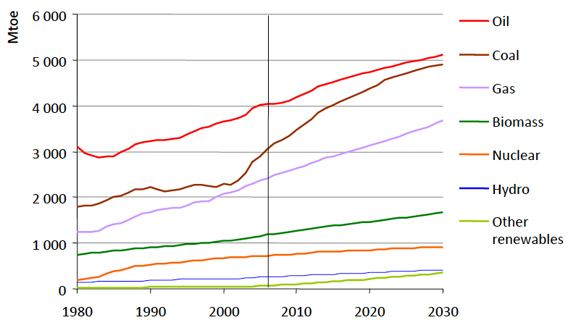 Developing countries must limit emissions to prevent global warming, says energy agency Developing countries must limit emissions to prevent global warming, says energy agency mongabay.com November 13, 2008 Limiting global warming to 2-degree rise will require $180/t carbon price says energy think tank
Developing countries must limit emissions to prevent global warming, says energy agency Developing countries must limit emissions to prevent global warming, says energy agency mongabay.com November 13, 2008 Limiting global warming to 2-degree rise will require $180/t carbon price says energy think tank
South Africa auctions last of ‘legal’ elephant ivory to China, Japan
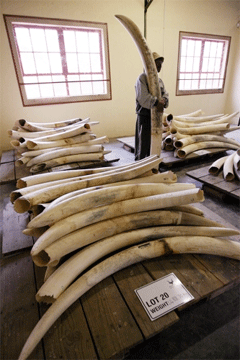 South Africa auctions last of ‘legal’ elephant ivory to China, Japan South Africa auctions last of ‘legal’ elephant ivory to China, Japan mongabay.com November 7, 2008
South Africa auctions last of ‘legal’ elephant ivory to China, Japan South Africa auctions last of ‘legal’ elephant ivory to China, Japan mongabay.com November 7, 2008
20 convicted for poaching Asiatic lions in their last refuge
20 convicted for poaching Asiatic lions in their last refuge 20 convicted for poaching Asiatic lions in their last refuge Jeremy Hance, mongabay.com November 6, 2008
Sharks in trouble after nations fail to create sustainable management programs
 Sharks in trouble after nations fail to create sustainable management programs Sharks in trouble after nations fail to create sustainable management programs Jeremy Hance, mongabay.com November 6, 2008
Sharks in trouble after nations fail to create sustainable management programs Sharks in trouble after nations fail to create sustainable management programs Jeremy Hance, mongabay.com November 6, 2008
Obama may bring leadership, rather than obstruction, to climate change talks
 Obama may bring leadership, rather than obstruction, to climate change talks Obama may bring leadership, rather than obstruction, to climate change talks mongabay.com November 6, 2008
Obama may bring leadership, rather than obstruction, to climate change talks Obama may bring leadership, rather than obstruction, to climate change talks mongabay.com November 6, 2008
Elephant ivory auction produces low prices, controversy
 Elephant ivory auction produces low prices, controversy Elephant ivory auction produces low prices, controversy mongabay.com October 30, 2008
Elephant ivory auction produces low prices, controversy Elephant ivory auction produces low prices, controversy mongabay.com October 30, 2008
Illegal wildlife trade devastating Asia’s pangolins
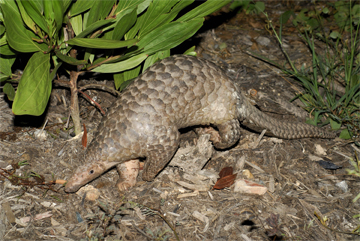 Illegal wildlife trade devastating Asia’s pangolins Illegal wildlife trade devastating Asia’s pangolins Jeremy Hance, mongabay.com October 15, 2008
Illegal wildlife trade devastating Asia’s pangolins Illegal wildlife trade devastating Asia’s pangolins Jeremy Hance, mongabay.com October 15, 2008
Trafficking of tiger parts is rife in Myanmar
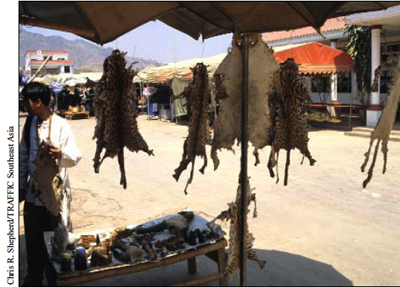 Trafficking of tiger parts is rife in Myanmar Trafficking of tiger parts is rife in Myanmar mongabay.com October 15, 2008
Trafficking of tiger parts is rife in Myanmar Trafficking of tiger parts is rife in Myanmar mongabay.com October 15, 2008
CO2 emissions accelerate 400% as world turns to dirtier fuels
 CO2 emissions accelerate 400% as world turns to dirtier fuels CO2 emissions accelerate 400% as world turns to dirtier fuels mongabay.com September 26, 2008 With emissions growth accelerating 400 percent this decade, atmospheric carbon dioxide levels rose at a record clip in 2007, reports the Global Carbon Project's annual overview of the greenhouse gas. Atmospheric […]
CO2 emissions accelerate 400% as world turns to dirtier fuels CO2 emissions accelerate 400% as world turns to dirtier fuels mongabay.com September 26, 2008 With emissions growth accelerating 400 percent this decade, atmospheric carbon dioxide levels rose at a record clip in 2007, reports the Global Carbon Project's annual overview of the greenhouse gas. Atmospheric […]
Indonesian raids on tiger traffickers yielding arrests in Sumatra
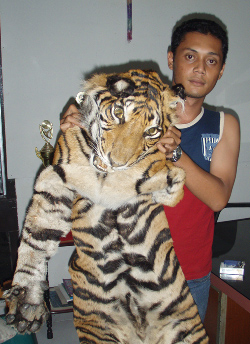 Raid on tiger traffickers yields 4 arrests in Sumatra Indonesian raids on tiger traffickers yielding arrests in Sumatra mongabay.com September 2, 2008 A raid on illegal tiger traders in Indonesia resulted in four arrests in Sumatra, reports the Wildlife Conservation Society (WCS). The arrests come under a new crack-down by Indonesian authorities on the sales […]
Raid on tiger traffickers yields 4 arrests in Sumatra Indonesian raids on tiger traffickers yielding arrests in Sumatra mongabay.com September 2, 2008 A raid on illegal tiger traders in Indonesia resulted in four arrests in Sumatra, reports the Wildlife Conservation Society (WCS). The arrests come under a new crack-down by Indonesian authorities on the sales […]
China’s log imports fall 19% in first half of 2008 due to high prices
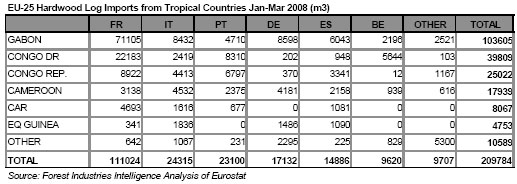 China’s log imports fall 19% in first half of 2008 due to high prices China’s log imports fall 19% in first half of 2008 due to high prices mongabay.com August 27, 2008 PNG remains the largest official source for tropical logs; E.U. log imports also dip. China’s imports of raw logs plunged 18.7 percent by […]
China’s log imports fall 19% in first half of 2008 due to high prices China’s log imports fall 19% in first half of 2008 due to high prices mongabay.com August 27, 2008 PNG remains the largest official source for tropical logs; E.U. log imports also dip. China’s imports of raw logs plunged 18.7 percent by […]
Shift from poverty-driven to industry-driven deforestation may help conservation
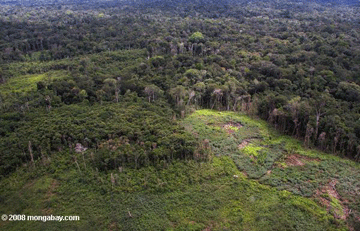 Shift from poverty-driven to industry-driven deforestation may help conservation Shift from poverty-driven to industry-driven deforestation may help conservation mongabay.com August 6, 2008 A shift from poverty-driven deforestation to industry-driven deforestation in the tropics may offer new opportunities for forest conservation, argues a new paper published in the journal Trends in Ecology & Evolution. Citing research […]
Shift from poverty-driven to industry-driven deforestation may help conservation Shift from poverty-driven to industry-driven deforestation may help conservation mongabay.com August 6, 2008 A shift from poverty-driven deforestation to industry-driven deforestation in the tropics may offer new opportunities for forest conservation, argues a new paper published in the journal Trends in Ecology & Evolution. Citing research […]
Corporations become prime driver of deforestation, providing clear target for environmentalists
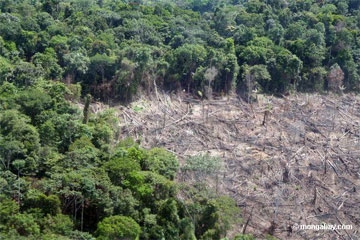 The major drivers of tropical deforestation have changed in recent decades. According to a forthcoming article, deforestation has shifted from poverty-driven subsistence farming to major corporations razing forests for large-scale projects in mining, logging, oil and gas development, and agriculture. While this change makes many scientists and conservationists uneasy, it may allow for more effective […]
The major drivers of tropical deforestation have changed in recent decades. According to a forthcoming article, deforestation has shifted from poverty-driven subsistence farming to major corporations razing forests for large-scale projects in mining, logging, oil and gas development, and agriculture. While this change makes many scientists and conservationists uneasy, it may allow for more effective […]
Nepal’s tiger population plummets due to poaching
Nepal’s tiger population plummets due to poaching Nepal’s tiger population plummets due to poaching mongabay.com July 2, 2008 Nepal’s tiger population have plummeted due to poaching and a booming trade in their parts, according to a government survey released Tuesday. Employing camera traps to census Suklaphanta Wildlife Conservation Park in western Nepal, authorities from the […]
China’s log imports fall in Q1 2008
China’s log imports fall in Q1 2008 China’s log imports fall in Q1 2008 mongabay.com June 20, 2008 China’s log imports fell 11.5 percent in volume during the first quarter of 2008, but higher prices resulted in an 8.2 percent rise in the value of imports, reports the International Tropical Timber Organization’s (ITTO) Tropical Timber […]
Rainforests face array of emerging threats
 Emerging threats to rainforests Rainforests face array of emerging threats Rhett Butler, mongabay.com June 15, 2008 Tropical forests face a number of emerging threats said a leading biologist speaking at a scientific conference in Paramaribo, Suriname. William F. Laurance, a researcher at the Smithsonian Tropical Research Center (STRI), told the annual meeting of the Association […]
Emerging threats to rainforests Rainforests face array of emerging threats Rhett Butler, mongabay.com June 15, 2008 Tropical forests face a number of emerging threats said a leading biologist speaking at a scientific conference in Paramaribo, Suriname. William F. Laurance, a researcher at the Smithsonian Tropical Research Center (STRI), told the annual meeting of the Association […]
Will earthquake slow dam-building spree in China?
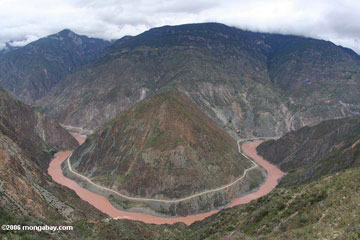 Will earthquake slow dam-building spree in China? Will earthquake slow enthusiasm for dam-building in China? mongabay.com May 14, 2008 Monday’s 7.9 magnitude earthquake in Sichuan province left more than 15,000 dead, 26,000 missing, and 64,000 injured, according to state media. The quake also “seriously damaged” two hydroelectric stations in Maoxian county, leading authorities to warn […]
Will earthquake slow dam-building spree in China? Will earthquake slow enthusiasm for dam-building in China? mongabay.com May 14, 2008 Monday’s 7.9 magnitude earthquake in Sichuan province left more than 15,000 dead, 26,000 missing, and 64,000 injured, according to state media. The quake also “seriously damaged” two hydroelectric stations in Maoxian county, leading authorities to warn […]
China to push for overseas acquisition of farmland to improve food security
China to push for overseas acquisition of farmland to improve food security China to push for overseas acquisition of farmland to improve food security mongabay.com May 13, 2008 Worries over food security may drive China to seek agricultural lands abroad, according to a report from the Financial Times. Under a proposal by the Ministry of […]
China’s emissions growth 2-4 times greater than expected
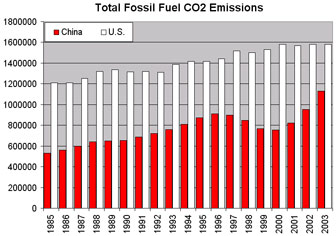 China’s emissions growth 2-4 times greater than expected China’s emissions growth 2-4 times greater than expected mongabay.com March 10, 2008 China’s carbon dioxide emissions are growing far faster than anticipated according to according to a new analysis by economists at the University of California, Berkeley, and the University of California, San Diego. The study, published […]
China’s emissions growth 2-4 times greater than expected China’s emissions growth 2-4 times greater than expected mongabay.com March 10, 2008 China’s carbon dioxide emissions are growing far faster than anticipated according to according to a new analysis by economists at the University of California, Berkeley, and the University of California, San Diego. The study, published […]
China’s wood industry fueled by illegal log imports from rainforest countries
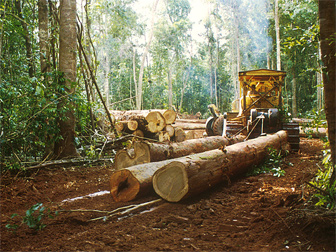 China’s wood industry fueled by illegal log imports from rainforest countries China’s wood industry fueled by illegal log imports from rainforest countries mongabay.com February 29, 2008 While China has improved management of its forestry sector, expanding forest plantation cover and banning harvesting of natural forests, China’s recent growth as wood-products exporter is built on timber […]
China’s wood industry fueled by illegal log imports from rainforest countries China’s wood industry fueled by illegal log imports from rainforest countries mongabay.com February 29, 2008 While China has improved management of its forestry sector, expanding forest plantation cover and banning harvesting of natural forests, China’s recent growth as wood-products exporter is built on timber […]
Carbon tax would make China greener and reduce warming risks
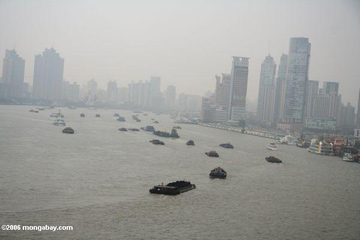 Carbon tax would make China greener and reduce warming risks Carbon tax would make China greener and reduce warming risks Rhett Butler, mongabay.com February 7, 2008 Driven by booming economic growth and rapid urbanization, China’s carbon dioxide emissions are surging. At the same time, forecasts suggest climate change will have an immense impact on the […]
Carbon tax would make China greener and reduce warming risks Carbon tax would make China greener and reduce warming risks Rhett Butler, mongabay.com February 7, 2008 Driven by booming economic growth and rapid urbanization, China’s carbon dioxide emissions are surging. At the same time, forecasts suggest climate change will have an immense impact on the […]
Sierra Leone bans timber exports
Sierra Leone bans timber exports Sierra Leone bans timber exports mongabay.com January 15, 2008 Sierra Leone has re-imposed a timber export ban after accusing foreign companies of illegally logging its forests, according to BBC News. The ban will remain in effect until the government develops a policy to ensure that local communities benefit from forestry. […]
China relaxing its control over the forestry sector
China relaxing its control over the forestry sector China relaxing its control over the forestry sector mongabay.com December 6, 2007 Public sector has growing role in China’s forest management according to a new paper published in the journal Science China’s reforms in its forestry sector have slowed deforestation, improved environmental quality, and enhanced the competitiveness […]
China boosts wheat production with new high-yielding varieties
China boosts wheat production with new high-yielding varieties China boosts wheat production with new high-yielding varieties mongabay.com December 4, 2007 A research initiative to boost China’s wheat production has yielded new high-quality, high-yielding varieties that have added 2.4 million tons to Chinese harvests and generated an extra US$411 million in farm income over the past […]
Sun Bears reclassified by IUCN as Vulnerable
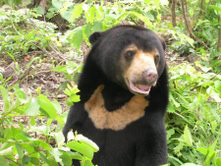 Sun Bears reclassified by IUCN as Vulnerable Sun Bears reclassified by IUCN as Vulnerable Jeremy Hance, special to mongabay.com November 13, 2007 The world’s smallest bear has been recently classified as vulnerable by the IUCN due to habitat loss and poaching. Co-chair of the IUCN Bear Specialist Group, Dave Garshelis, states that “although we do […]
Sun Bears reclassified by IUCN as Vulnerable Sun Bears reclassified by IUCN as Vulnerable Jeremy Hance, special to mongabay.com November 13, 2007 The world’s smallest bear has been recently classified as vulnerable by the IUCN due to habitat loss and poaching. Co-chair of the IUCN Bear Specialist Group, Dave Garshelis, states that “although we do […]
China begins blocking river for second largest dam
China begins blocking river for second largest dam China begins blocking river for second largest dam mongabay.com November 12, 2007 China began damming the Jinsha River for its biggest hydroelectric project after the Three Gorges Project, reports Chinese state media. The Xiluodu dam on the Jinsha River, a major tributary of the Yangtze River, will […]
Sun bear gets ‘vulnerable’ listing due to deforestation, poaching
Sun bear gets ‘vulnerable’ listing due to deforestation, poaching Sun bear gets ‘vulnerable’ listing due to deforestation, poaching mongabay.com November 12, 2007 The sun bear, the world’s smallest bear, has been added to the global list of species threatened with extinction, said the World Conservation Union (IUCN). The bear, found in the tropical forests of […]
Central Africa’s ‘Most Beautiful Waterfall’ to be destroyed
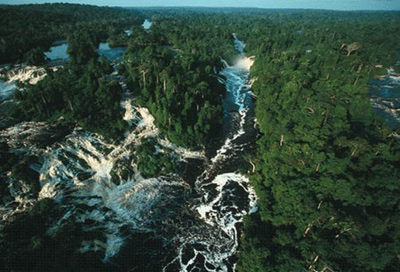 Central Africa’s ‘Most Beautiful Waterfall’ to be destroyed Central Africa’s ‘Most Beautiful Waterfall’ to be destroyed mongabay.com November 4, 2007 One of Africa’s most dramatic waterfalls will be destroyed by a hydroelectric project in Gabon, according to reports from a Gabonese NGO and the Inter Press Service (IPS). Kongou Falls, a 184-foot (5 6m) two-mile-wide […]
Central Africa’s ‘Most Beautiful Waterfall’ to be destroyed Central Africa’s ‘Most Beautiful Waterfall’ to be destroyed mongabay.com November 4, 2007 One of Africa’s most dramatic waterfalls will be destroyed by a hydroelectric project in Gabon, according to reports from a Gabonese NGO and the Inter Press Service (IPS). Kongou Falls, a 184-foot (5 6m) two-mile-wide […]
China urged to join sustainable soy efforts in the Amazon
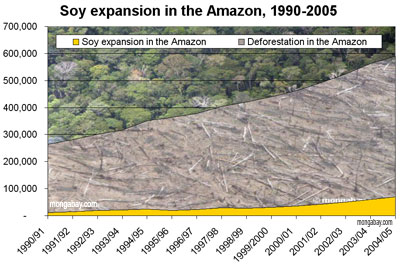 China urged to join sustainable soy efforts in the Amazon China urged to join sustainable soy efforts in the Amazon mongabay.com September 12, 2007 Brazilian soy crushers have urged China to join an alliance to promote sustainable soybean production in the Amazon, according to Reuters. “Sustainability is a huge issue,” Robert Broeska, president of International […]
China urged to join sustainable soy efforts in the Amazon China urged to join sustainable soy efforts in the Amazon mongabay.com September 12, 2007 Brazilian soy crushers have urged China to join an alliance to promote sustainable soybean production in the Amazon, according to Reuters. “Sustainability is a huge issue,” Robert Broeska, president of International […]
Chinese demand takes toll on wildlife in Burma (Myanmar)
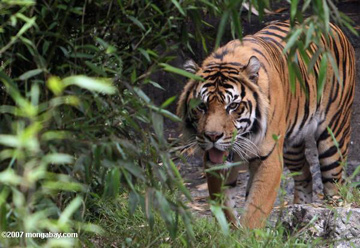 Chinese demand takes toll on wildlife in Burma (Myanmar) Chinese demand takes toll on wildlife in Burma (Myanmar) Reuters September 4, 2007 If the market of Mong La is anything to go by, the remaining wild elephants, tigers and bears in Myanmar’s forests are being hunted down slowly and sold to China. Nestled in hills […]
Chinese demand takes toll on wildlife in Burma (Myanmar) Chinese demand takes toll on wildlife in Burma (Myanmar) Reuters September 4, 2007 If the market of Mong La is anything to go by, the remaining wild elephants, tigers and bears in Myanmar’s forests are being hunted down slowly and sold to China. Nestled in hills […]
China to miss pollution goals for 2007
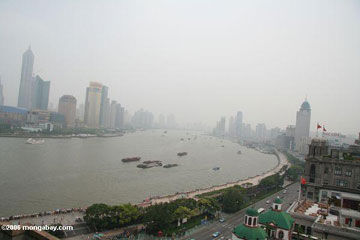 China to miss pollution goals for 2007 China to miss pollution goals for 2007 mongabay.com August 22, 2007 China has managed to cut emissions of sulphur dioxide, an acid-rain causing pollutant, during the first half of 2007 but is likely to miss reduction targets for the year, reports the State Environmental Protection Administration (SEPA). SEPA […]
China to miss pollution goals for 2007 China to miss pollution goals for 2007 mongabay.com August 22, 2007 China has managed to cut emissions of sulphur dioxide, an acid-rain causing pollutant, during the first half of 2007 but is likely to miss reduction targets for the year, reports the State Environmental Protection Administration (SEPA). SEPA […]
U.S. firms driving pollution in China
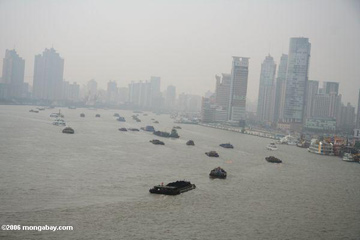 U.S. firms driving pollution in China U.S. firms driving pollution in China mongabay.com August 22, 2007 U.S. firms are helping drive environmental degradation in China, putting the health of millions of Chinese at risk, reports The Wall Street Journal. The paper says that by demanding ever lower products for goods, manufacturers are forced to reduced […]
U.S. firms driving pollution in China U.S. firms driving pollution in China mongabay.com August 22, 2007 U.S. firms are helping drive environmental degradation in China, putting the health of millions of Chinese at risk, reports The Wall Street Journal. The paper says that by demanding ever lower products for goods, manufacturers are forced to reduced […]
China’s paper recycling industry can help shield forests from destruction
China’s paper recycling industry can help shield forests from destruction China’s paper recycling industry can help shield forests from destruction mongabay.com July 15, 2007 China’s massive paper recycling capacity is helping shield global forests worldwide from destruction by supporting an international market for wastepaper as an alternative to pulpwood, says a new report released by […]
China calls for sustainable logging by Chinese firms overseas
China calls for sustainable logging overseas China calls for sustainable logging by Chinese firms overseas mongabay.com July 11, 2007 China unveiled a draft sustainable forestry handbook for Chinese companies operating overseas. The move comes as the country faces increasing criticism from environmentalists who say China’s booming demand for timber and other materials is destroying the […]
Home improvement giant bans illegal wood products
 Home improvement giant bans illegal wood products Home improvement giant bans illegal wood products mongabay.com July 8, 2007 B&Q, the third largest retailer of home improvement materials, announced that within three years, all Brazilian wood products sold in China would come from certified sources. B&Q has 60 stores in China. Environmentalists say the announcement, made […]
Home improvement giant bans illegal wood products Home improvement giant bans illegal wood products mongabay.com July 8, 2007 B&Q, the third largest retailer of home improvement materials, announced that within three years, all Brazilian wood products sold in China would come from certified sources. B&Q has 60 stores in China. Environmentalists say the announcement, made […]
Rare three-legged tiger photographed in Sumatra
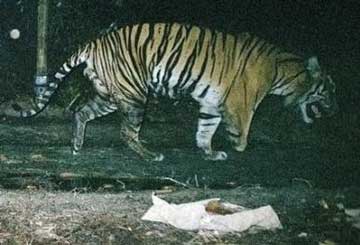 Rare three-legged tiger photographed in Sumatra Rare three-legged tiger photographed in Sumatra mongabay.com July 6, 2007 A WWF camera trap has captured photos of a three-legged Sumatran tiger on the Indonesian island of Sumatra. WWF says the rare tiger likely escaped from a snare. The big cat seems otherwise healthy. The Sumatran tiger is the […]
Rare three-legged tiger photographed in Sumatra Rare three-legged tiger photographed in Sumatra mongabay.com July 6, 2007 A WWF camera trap has captured photos of a three-legged Sumatran tiger on the Indonesian island of Sumatra. WWF says the rare tiger likely escaped from a snare. The big cat seems otherwise healthy. The Sumatran tiger is the […]
China will not commit to CO2 limits
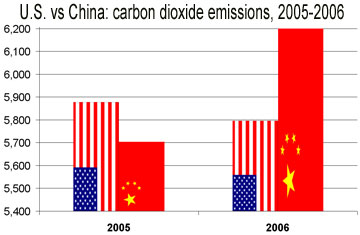 China will not commit to CO2 limits China will not commit to CO2 limits mongabay.com July 6, 2007 China will not commit to binding greenhouse gas emissions cuts, reports the BBC. Lu Xuedu, deputy director-general of China’s Office of Global Environmental Affairs, told British parliamentarians that China does not presently have the “capability to make […]
China will not commit to CO2 limits China will not commit to CO2 limits mongabay.com July 6, 2007 China will not commit to binding greenhouse gas emissions cuts, reports the BBC. Lu Xuedu, deputy director-general of China’s Office of Global Environmental Affairs, told British parliamentarians that China does not presently have the “capability to make […]
Feeds: news | india | latam | brasil | indonesia
 A white rhino in Kruger National Park in South Africa. Photo by: Rhett A. Butler. When it comes to trafficking rhino, elephant, and tiger parts the biggest players are China, Kenya, India, Vietnam, South Africa and Thailand, according to a new paper in the Proceedings of the National Academy of Sciences (PNAS). Examining news media […]
A white rhino in Kruger National Park in South Africa. Photo by: Rhett A. Butler. When it comes to trafficking rhino, elephant, and tiger parts the biggest players are China, Kenya, India, Vietnam, South Africa and Thailand, according to a new paper in the Proceedings of the National Academy of Sciences (PNAS). Examining news media […] Elephant in South Africa. Photos by Rhett A. Butler. The Chinese government announced today that it will “eventually” shut down its legal domestic ivory market. The move, which surprised conservationists, could provide a major boost in efforts to stop the mass killing of elephants for their ivory. The announcement came during a public event where […]
Elephant in South Africa. Photos by Rhett A. Butler. The Chinese government announced today that it will “eventually” shut down its legal domestic ivory market. The move, which surprised conservationists, could provide a major boost in efforts to stop the mass killing of elephants for their ivory. The announcement came during a public event where […] River in the Peruvian Amazon. Chinese Premier Li Keqiang has defended a plan to build a railway across the South American continent as a way to protect the environment and grow the region’s economy, reports AFP. Speaking upon his arrival in Lima on Friday, Li asserted that China’s investment in the $10 billion project, which […]
River in the Peruvian Amazon. Chinese Premier Li Keqiang has defended a plan to build a railway across the South American continent as a way to protect the environment and grow the region’s economy, reports AFP. Speaking upon his arrival in Lima on Friday, Li asserted that China’s investment in the $10 billion project, which […] Sloth on all fours seeking salt. Photo courtesy of camera trap video compilation from Tiputini Biodiversity Station. A compilation of new camera trap videos from Yasuni National Park shows off rarely seen species like the rufous-vented ground cuckoo (Neomorphus geoffroyi) and the short-eared dog (Atelocynus microtis) as well as odd behavior, like sloths licking salt […]
Sloth on all fours seeking salt. Photo courtesy of camera trap video compilation from Tiputini Biodiversity Station. A compilation of new camera trap videos from Yasuni National Park shows off rarely seen species like the rufous-vented ground cuckoo (Neomorphus geoffroyi) and the short-eared dog (Atelocynus microtis) as well as odd behavior, like sloths licking salt […] Elephant in South Africa.. Photo by Rhett A. Butler. China has established a one-year ban on imports of carved African elephant ivory. Conservationists say the move, effective immediately, sends an important signal, but alone won’t be enough to slow elephant poaching. “This announcement is an encouraging signal that the Chinese government is ratcheting down the […]
Elephant in South Africa.. Photo by Rhett A. Butler. China has established a one-year ban on imports of carved African elephant ivory. Conservationists say the move, effective immediately, sends an important signal, but alone won’t be enough to slow elephant poaching. “This announcement is an encouraging signal that the Chinese government is ratcheting down the […] Truck carrying raw logs in Myanmar. Photo courtesy of EIA 155 Chinese citizens have been arrested in Myanmar for illegal logging, reports Agence France-Presse. According to a statement from China’s foreign ministry, the Chinese nationals were arrested in Myanmar’s Kachin state. Few details about the circumstances of their arrest were available. Unregulated logging in Myanmar’s […]
Truck carrying raw logs in Myanmar. Photo courtesy of EIA 155 Chinese citizens have been arrested in Myanmar for illegal logging, reports Agence France-Presse. According to a statement from China’s foreign ministry, the Chinese nationals were arrested in Myanmar’s Kachin state. Few details about the circumstances of their arrest were available. Unregulated logging in Myanmar’s […] The most important environmental and wildlife stories from the last year Also see our Top 10 HAPPY Environmental Stories of 2014 1. The Year of Zero Deforestation Pledges: In 2014, the unimaginable happened: companies representing the majority of palm oil production and trade agreed to stop cutting down rainforests and draining peatlands for new oil […]
The most important environmental and wildlife stories from the last year Also see our Top 10 HAPPY Environmental Stories of 2014 1. The Year of Zero Deforestation Pledges: In 2014, the unimaginable happened: companies representing the majority of palm oil production and trade agreed to stop cutting down rainforests and draining peatlands for new oil […] Known for his opposition to Chinese mine project, indigenous leader found bound and buried in Ecuador Days before José Isidro Tendetza Antún was supposed to travel to the UN Climate Summit in Lima to publicly file a complaint against a massive mining operation, he went missing. Now, the Guardian reports that the body of the […]
Known for his opposition to Chinese mine project, indigenous leader found bound and buried in Ecuador Days before José Isidro Tendetza Antún was supposed to travel to the UN Climate Summit in Lima to publicly file a complaint against a massive mining operation, he went missing. Now, the Guardian reports that the body of the […] Elephants in Tanzania. All photos by Rhett A. Butler Corruption in Tanzania is enabling large volumes of illegal elephant ivory to be smuggled out of the country, alleges a new report from the Environmental Investigation Agency (EIA) The report, titled Vanishing Point, says that high ranking officials are involved in the illicit trade, which have […]
Elephants in Tanzania. All photos by Rhett A. Butler Corruption in Tanzania is enabling large volumes of illegal elephant ivory to be smuggled out of the country, alleges a new report from the Environmental Investigation Agency (EIA) The report, titled Vanishing Point, says that high ranking officials are involved in the illicit trade, which have […] Four commodities produced in just eight countries are responsible for a third of the world’s forest loss, according to a new report. Those familiar with the long-standing effort to stop deforestation won’t be surprised by the commodities named: beef, palm oil, soy, and wood products (including timber and paper). Nor will they be very surprised […]
Four commodities produced in just eight countries are responsible for a third of the world’s forest loss, according to a new report. Those familiar with the long-standing effort to stop deforestation won’t be surprised by the commodities named: beef, palm oil, soy, and wood products (including timber and paper). Nor will they be very surprised […] Shark fins are usually sliced off the animal while its still alive. Photo by: WildAid/Hilton. Shark fin demand has dropped precipitously in China in just a few years, according to a new report by WildAid. The wildlife NGO has spearheaded a major media campaign, incorporating celebrities like Yao Ming, to raise awareness about the impacts […]
Shark fins are usually sliced off the animal while its still alive. Photo by: WildAid/Hilton. Shark fin demand has dropped precipitously in China in just a few years, according to a new report by WildAid. The wildlife NGO has spearheaded a major media campaign, incorporating celebrities like Yao Ming, to raise awareness about the impacts […] Shipment of Malagasy rosewood intercepted in Sri Lanka in early April 2014. Courtesy of Sri Lanka Customs. Voluntary guidelines established by the Chinese government won’t be enough to curb rampant timber smuggling by Chinese companies, putting ‘responsible’ actors at risk of having their reputations tarnished, argues a new campaign by the Environmental Investigation Agency (EIA). […]
Shipment of Malagasy rosewood intercepted in Sri Lanka in early April 2014. Courtesy of Sri Lanka Customs. Voluntary guidelines established by the Chinese government won’t be enough to curb rampant timber smuggling by Chinese companies, putting ‘responsible’ actors at risk of having their reputations tarnished, argues a new campaign by the Environmental Investigation Agency (EIA). […] Dead sea turtles confiscated by the Philippine National Police (PNP). Photo by: PNP-SBU/PIA. On Friday, eleven Chinese fishermen were caught by Filipino police with 555 marine turtles, 378 of which were dead. Officials in the Philippines have since released the 177 living turtles. But the incident has sparked an international standoff between the Philippines and […]
Dead sea turtles confiscated by the Philippine National Police (PNP). Photo by: PNP-SBU/PIA. On Friday, eleven Chinese fishermen were caught by Filipino police with 555 marine turtles, 378 of which were dead. Officials in the Philippines have since released the 177 living turtles. But the incident has sparked an international standoff between the Philippines and […] The Chinese Premier, Li Keqiang, has pledged $10 million [see note below] to combat poaching in Africa during a visit to the African Union headquarters in Addis Ababa. The fund is a part of a much larger loan package for the continent from China, totaling $10 billion in credit and $2 billion in aid. The […]
The Chinese Premier, Li Keqiang, has pledged $10 million [see note below] to combat poaching in Africa during a visit to the African Union headquarters in Addis Ababa. The fund is a part of a much larger loan package for the continent from China, totaling $10 billion in credit and $2 billion in aid. The […] Aerial view of jungle river on the island of New Guinea. Photo by: Rhett A. Butler. Corruption, weak governance, and powerful timber barons are illegally stripping the forests of Papua New Guinea, according to a new report from the Chatham House. The policy institute finds that 70 percent of logging in Papua New Guinea is […]
Aerial view of jungle river on the island of New Guinea. Photo by: Rhett A. Butler. Corruption, weak governance, and powerful timber barons are illegally stripping the forests of Papua New Guinea, according to a new report from the Chatham House. The policy institute finds that 70 percent of logging in Papua New Guinea is […] Living whale shark. All photos courtesy of WildLifeRisk A four-year investigation by WildLifeRisk, a Hong Kong-based marine conservation group, has found that a single factory in China’s Zhejiang Province slaughters some 600 whale sharks a year to produce oil for cosmetics and health supplements. While trade in whale shark products is prohibited under the the […]
Living whale shark. All photos courtesy of WildLifeRisk A four-year investigation by WildLifeRisk, a Hong Kong-based marine conservation group, has found that a single factory in China’s Zhejiang Province slaughters some 600 whale sharks a year to produce oil for cosmetics and health supplements. While trade in whale shark products is prohibited under the the […] Elephants in Namibia. Photo by Rhett A. Butler The government of Hong Kong will destroy 28 tons of ivory confiscated from traffickers, reports CNN. The announcement, which comes just weeks after China destroyed six tons of seized ivory, suggests that the leaders of the world’s largest market for ivory may be getting more serious about […]
Elephants in Namibia. Photo by Rhett A. Butler The government of Hong Kong will destroy 28 tons of ivory confiscated from traffickers, reports CNN. The announcement, which comes just weeks after China destroyed six tons of seized ivory, suggests that the leaders of the world’s largest market for ivory may be getting more serious about […] Elephant in South Africa. Photo by Rhett A. Butler. A newspaper story about the impact of the ivory trade has gone viral in China, raising awareness among millions of Chinese, reports the Wildlife Conservation Society (WCS). The story, published November 15 in Southern Weekly, has been shared widely across Chinese web sites and social media, […]
Elephant in South Africa. Photo by Rhett A. Butler. A newspaper story about the impact of the ivory trade has gone viral in China, raising awareness among millions of Chinese, reports the Wildlife Conservation Society (WCS). The story, published November 15 in Southern Weekly, has been shared widely across Chinese web sites and social media, […] Great white shark in South Africa. China has banned shark fin and bird’s nest soup from being served at official state banquets, reports Chinese state media. The move, announced Sunday via a notice from the Community Party’s Central Committee and the State Council, is part of a broader move to crack down on corruption and […]
Great white shark in South Africa. China has banned shark fin and bird’s nest soup from being served at official state banquets, reports Chinese state media. The move, announced Sunday via a notice from the Community Party’s Central Committee and the State Council, is part of a broader move to crack down on corruption and […] Illegal elephant ivory. Courtesy of Interpol Raids in southern and eastern Africa yielded a stash of contraband linked to poaching and illegal logging, reports Interpol, which coordinated the operation. The month-long operation, which took place from late September to late October, was conducted under Interpol’s Project Wisdom and Project Leaf programs, which aim to combat […]
Illegal elephant ivory. Courtesy of Interpol Raids in southern and eastern Africa yielded a stash of contraband linked to poaching and illegal logging, reports Interpol, which coordinated the operation. The month-long operation, which took place from late September to late October, was conducted under Interpol’s Project Wisdom and Project Leaf programs, which aim to combat […] Indonesia’s flag carrier won’t transport shark fins any more Indonesia’s national carrier Garuda Indonesia has joined a growing number of airlines looking to curb the international shark fin trade by banning the transport of shark fins and other shark products on their aircraft. WWF-Indonesia, which helped campaign for the ban, called the new Garuda policy […]
Indonesia’s flag carrier won’t transport shark fins any more Indonesia’s national carrier Garuda Indonesia has joined a growing number of airlines looking to curb the international shark fin trade by banning the transport of shark fins and other shark products on their aircraft. WWF-Indonesia, which helped campaign for the ban, called the new Garuda policy […] As anticipated earlier in the week by conservationists, poachers enter Dzanga Bai and slaughter dozens elephants for ivory. Dozens of elephants have been slaughtered in the Dzanga Bai World Heritage Site in the Central African Republic just days after conservationists warned about an impending threat from the movement of 17 heavily armed poachers. The massacre […]
As anticipated earlier in the week by conservationists, poachers enter Dzanga Bai and slaughter dozens elephants for ivory. Dozens of elephants have been slaughtered in the Dzanga Bai World Heritage Site in the Central African Republic just days after conservationists warned about an impending threat from the movement of 17 heavily armed poachers. The massacre […] Just 9% of the millions of tonnes of fish caught by China’s giant fishing fleet in African and other international waters is officially reported to the UN, say researchers using a new way to estimate the size and value of catches. Fisheries experts have long considered that the catches reported by China to the UN’s […]
Just 9% of the millions of tonnes of fish caught by China’s giant fishing fleet in African and other international waters is officially reported to the UN, say researchers using a new way to estimate the size and value of catches. Fisheries experts have long considered that the catches reported by China to the UN’s […] Gold mining in the Peruvian Amazon Amazonian forest cleared in Ecuador, a mountain leveled in Peru, the Cerrado savannah converted to soy fields in Brazil and oil fields under development in Venezuela’s Orinoco belt. These recent reports of environmental degradation in Latin America may be thousands of miles apart in different countries and for different […]
Gold mining in the Peruvian Amazon Amazonian forest cleared in Ecuador, a mountain leveled in Peru, the Cerrado savannah converted to soy fields in Brazil and oil fields under development in Venezuela’s Orinoco belt. These recent reports of environmental degradation in Latin America may be thousands of miles apart in different countries and for different […] Forest elephant in Gabon More than 60 percent of Africa’s forest elephants have been killed in the past decade due to the ivory trade, reports a new study published in the online journal PLOS ONE. The study warns that the diminutive elephant species — genetically distinct from the better-known savanna elephant — is rapidly heading […]
Forest elephant in Gabon More than 60 percent of Africa’s forest elephants have been killed in the past decade due to the ivory trade, reports a new study published in the online journal PLOS ONE. The study warns that the diminutive elephant species — genetically distinct from the better-known savanna elephant — is rapidly heading […] Yesterday, the EU joined the U.S. and Australia in banning all timber that was illegally harvested abroad. The new regulation could have a major impact on where the EU sources its timber, and no where more so than the Democratic Republic of Congo (DRC). According to a new report by Greenpeace, the DRC’s current moratorium […]
Yesterday, the EU joined the U.S. and Australia in banning all timber that was illegally harvested abroad. The new regulation could have a major impact on where the EU sources its timber, and no where more so than the Democratic Republic of Congo (DRC). According to a new report by Greenpeace, the DRC’s current moratorium […] Part 2 of 3PART 1: Overview | PART 2: Reflections of CITES Secretary-General John Scanlon This interview is an excerpt from The WildLife with Laurel Neme, a program that explores the mysteries of the animal world through interviews with scientists and other wildlife investigators. “The WildLife” airs every Monday from 1-2 pm EST on WOMM-LP, […]
Part 2 of 3PART 1: Overview | PART 2: Reflections of CITES Secretary-General John Scanlon This interview is an excerpt from The WildLife with Laurel Neme, a program that explores the mysteries of the animal world through interviews with scientists and other wildlife investigators. “The WildLife” airs every Monday from 1-2 pm EST on WOMM-LP, […] Guards from the Okapi Faunal Reserve with confiscated ivory from poachers. Credit: Okapi Conservation Project A key Congo wildlife reserve has lost 75 percent of its elephants in just 15 years due to poaching to meet Asian demand for ivory, reports a new survey by the Wildlife Conservation Society (WCS) and Democratic Republic of the […]
Guards from the Okapi Faunal Reserve with confiscated ivory from poachers. Credit: Okapi Conservation Project A key Congo wildlife reserve has lost 75 percent of its elephants in just 15 years due to poaching to meet Asian demand for ivory, reports a new survey by the Wildlife Conservation Society (WCS) and Democratic Republic of the […] Tiger bodies in freezer in Guilin Tiger Bear Farm. Photo by: Belinda Wright/WPSI. The number of tigers being captive bred in China for consumption exceed those surviving in the wild—across 13 countries—by over a third, according to a new report by the Environmental Investigation Agency (EIA). The report, Hidden in Plain Sight, alleges that while […]
Tiger bodies in freezer in Guilin Tiger Bear Farm. Photo by: Belinda Wright/WPSI. The number of tigers being captive bred in China for consumption exceed those surviving in the wild—across 13 countries—by over a third, according to a new report by the Environmental Investigation Agency (EIA). The report, Hidden in Plain Sight, alleges that while […] Heavy air pollution, smog and deposition of N in the city centre of Urumqi, China. Credit: Mr. Liu Xuejun Nitrogen deposited on land and water in China increased 60 percent annually from the 1980s to the 2000s due to rising use of fertilizer, growth in livestock production, increased coal burning, and a sharp rise in […]
Heavy air pollution, smog and deposition of N in the city centre of Urumqi, China. Credit: Mr. Liu Xuejun Nitrogen deposited on land and water in China increased 60 percent annually from the 1980s to the 2000s due to rising use of fertilizer, growth in livestock production, increased coal burning, and a sharp rise in […] The 3rd Annual New York Wildlife Conservation Film Festival (WFCC.org) runs from January 30 – February 2, 2013. Ahead of the event, Mongabay.com is running a series of Q&As with filmmakers and presenters. For more interviews, please see our WCFF feed. Elephant in Kenya. Photo by Rhett A. Butler. By some estimates, more than 30,000 […]
The 3rd Annual New York Wildlife Conservation Film Festival (WFCC.org) runs from January 30 – February 2, 2013. Ahead of the event, Mongabay.com is running a series of Q&As with filmmakers and presenters. For more interviews, please see our WCFF feed. Elephant in Kenya. Photo by Rhett A. Butler. By some estimates, more than 30,000 […] Indian one-horned rhinos. Photo by Rhett Butler. Royal Malaysian Customs have just announced the seizure of 24 tons of ivory in Port Klang. This is the largest-ever seizure of ivory in transit through the country. The 1,500 pieces of ivory came from over 750 elephants and were exported from Togo, a tiny west African country […]
Indian one-horned rhinos. Photo by Rhett Butler. Royal Malaysian Customs have just announced the seizure of 24 tons of ivory in Port Klang. This is the largest-ever seizure of ivory in transit through the country. The 1,500 pieces of ivory came from over 750 elephants and were exported from Togo, a tiny west African country […] Photo by Rhett Butler. Malaysian authorities made their largest-ever ivory bust after uncovering 24 tons of “white gold” hidden in crates designed to look like stacks of sawn wood. The street value of the ivory may exceed $25 million. The ivory comes from over 750 elephants, according to conservationist Paula Kahumbu. The shipment originated in […]
Photo by Rhett Butler. Malaysian authorities made their largest-ever ivory bust after uncovering 24 tons of “white gold” hidden in crates designed to look like stacks of sawn wood. The street value of the ivory may exceed $25 million. The ivory comes from over 750 elephants, according to conservationist Paula Kahumbu. The shipment originated in […]-EIA.568.jpg) Logs smuggled across the border from Myanmar to China. Photo © : EIA. Runaway economic growth comes with costs: in the case of China’s economic engine, one of them has been the world’s forests. According to a new report by the Environmental Investigation Agency (EIA), China has become the number one importer of illegal wood […]
Logs smuggled across the border from Myanmar to China. Photo © : EIA. Runaway economic growth comes with costs: in the case of China’s economic engine, one of them has been the world’s forests. According to a new report by the Environmental Investigation Agency (EIA), China has become the number one importer of illegal wood […] Officials in Hong Kong have made a second major ivory bust in less than a month, reports the Associated Press. Customs agents at Hong Kong’s port on Thursday discovered 1.33 tons of ivory tusks hidden among some 400 bags of sunflower seeds in a shipping container. The street value of the contraband is estimated at […]
Officials in Hong Kong have made a second major ivory bust in less than a month, reports the Associated Press. Customs agents at Hong Kong’s port on Thursday discovered 1.33 tons of ivory tusks hidden among some 400 bags of sunflower seeds in a shipping container. The street value of the contraband is estimated at […] Raw logs cut with artisanal permits at Kinkole port near Kinshasa. Photo courtesy of Global Witness. In 2002 the Democratic Republic of Congo (DRC) announced a moratorium on commercial logging in a bid to save rapidly falling forests, however a new report by Global Witness alleges that industrial loggers are finding a way around the […]
Raw logs cut with artisanal permits at Kinkole port near Kinshasa. Photo courtesy of Global Witness. In 2002 the Democratic Republic of Congo (DRC) announced a moratorium on commercial logging in a bid to save rapidly falling forests, however a new report by Global Witness alleges that industrial loggers are finding a way around the […] Deforestation in Laos for a rubber plantation. Raw logs from such deforestation often make their way to Vietnam. Photo by: Rhett A. Butler. The forests of Lao are still suffering from widespread destruction with the government turning a blind eye to a thriving black market logging trade on the border of Laos and Vietnam, according […]
Deforestation in Laos for a rubber plantation. Raw logs from such deforestation often make their way to Vietnam. Photo by: Rhett A. Butler. The forests of Lao are still suffering from widespread destruction with the government turning a blind eye to a thriving black market logging trade on the border of Laos and Vietnam, according […] Malayan tiger. Photo by Rhett A. Butler. While founded with good intentions, wildlife trade bans may in some cases be worsening the plight of some endangered species, argues a commentary published in the journal Tropical Conservation Science. Looking at three animals listed under the CITES (Convention on International Trade in Endangered Species of Wild Fauna […]
Malayan tiger. Photo by Rhett A. Butler. While founded with good intentions, wildlife trade bans may in some cases be worsening the plight of some endangered species, argues a commentary published in the journal Tropical Conservation Science. Looking at three animals listed under the CITES (Convention on International Trade in Endangered Species of Wild Fauna […] Legal ivory trade failing to protect elephants The legal ivory trade is failing to protect elephants which are being slaughtered en mass across the African continent to meet demand for religious trinkets, argues a new investigative report published in National Geographic by Bryan Christy. The report, researched and written over a three year period, looked […]
Legal ivory trade failing to protect elephants The legal ivory trade is failing to protect elephants which are being slaughtered en mass across the African continent to meet demand for religious trinkets, argues a new investigative report published in National Geographic by Bryan Christy. The report, researched and written over a three year period, looked […] Average rhino horn consumer: wealthy urban male in Asia between the ages of 25-45 Yao Ming walks with Kinango, an infant elephant whose mother was killed by poachers at the David Sheldrick Wildlife Trust in Kenya. Photo by: Kristian Schmidt/WildAid. Yuppies, not elderly rural consumer, are driving the trade that is decimating some of the […]
Average rhino horn consumer: wealthy urban male in Asia between the ages of 25-45 Yao Ming walks with Kinango, an infant elephant whose mother was killed by poachers at the David Sheldrick Wildlife Trust in Kenya. Photo by: Kristian Schmidt/WildAid. Yuppies, not elderly rural consumer, are driving the trade that is decimating some of the […] Pictured: Ivory seized by Manhattan District Attorney’s Office, New York State Department of Environmental Conservation, and the United States Fish and Wildlife Service Two ivory dealers pled guilty to trafficking some $2 million worth of elephant ivory. According to Manhattan District Attorney Cyrus R. Vance, Jr., Mukesh Gupta pled guilty to one count of Illegal […]
Pictured: Ivory seized by Manhattan District Attorney’s Office, New York State Department of Environmental Conservation, and the United States Fish and Wildlife Service Two ivory dealers pled guilty to trafficking some $2 million worth of elephant ivory. According to Manhattan District Attorney Cyrus R. Vance, Jr., Mukesh Gupta pled guilty to one count of Illegal […] In the wake of a surge in tiger poaching, the state government of Maharashtra, India will no longer consider the shooting of wildlife poachers by forest rangers a crime, reports the Associated Press. Rangers will not should not be “booked for human rights violations when they have taken action against poachers,” said Maharashtra Forest Minister […]
In the wake of a surge in tiger poaching, the state government of Maharashtra, India will no longer consider the shooting of wildlife poachers by forest rangers a crime, reports the Associated Press. Rangers will not should not be “booked for human rights violations when they have taken action against poachers,” said Maharashtra Forest Minister […] An interview with the Nature Conservancy’s China Program. TNC staff and volunteers repairing signage at Meili Snow Mountain National Park in northwest Yunnan. Community benefits and ecotourism are at the heart of TNC’s program to establish national parks in China. Photo by: Tang Ling. Founded in 1951, The Nature Conservancy (TNC) works in more than […]
An interview with the Nature Conservancy’s China Program. TNC staff and volunteers repairing signage at Meili Snow Mountain National Park in northwest Yunnan. Community benefits and ecotourism are at the heart of TNC’s program to establish national parks in China. Photo by: Tang Ling. Founded in 1951, The Nature Conservancy (TNC) works in more than […] Basamuk Bay in Madang, Papua New Guinea. Photo produced using Google Earth. A massive, controversial nickel mine has been shut down in Papua New Guinea due to the environmental concerns of its slurry pipeline, reports Cultural Survival. Inspections of the 83 mile (134 kilometer) slurry pipeline found that it had been built too close to […]
Basamuk Bay in Madang, Papua New Guinea. Photo produced using Google Earth. A massive, controversial nickel mine has been shut down in Papua New Guinea due to the environmental concerns of its slurry pipeline, reports Cultural Survival. Inspections of the 83 mile (134 kilometer) slurry pipeline found that it had been built too close to […] More than 200 elephants have been slaughtered for their tusks in less than a month in Cameroon, reports the International Fund for Animal Welfare (IFAW). The group blames Sudanese poachers for cross-border raids from Chad into Bouba Ndjida National Park in northern Cameroon. “The ivory is smuggled out of West and Central Africa for markets […]
More than 200 elephants have been slaughtered for their tusks in less than a month in Cameroon, reports the International Fund for Animal Welfare (IFAW). The group blames Sudanese poachers for cross-border raids from Chad into Bouba Ndjida National Park in northern Cameroon. “The ivory is smuggled out of West and Central Africa for markets […] Illegally logged tree in Indonesia. Photo by: Rhett A. Butler. Australia should join the widening effort to stamp out illegal logging, according to testimony given this week by tropical ecologist William Laurance with James Cook University. Presenting before the Australian Senate’s rural affairs committee, Laurance argued that the massive environmental and economic costs of illegal […]
Illegally logged tree in Indonesia. Photo by: Rhett A. Butler. Australia should join the widening effort to stamp out illegal logging, according to testimony given this week by tropical ecologist William Laurance with James Cook University. Presenting before the Australian Senate’s rural affairs committee, Laurance argued that the massive environmental and economic costs of illegal […] Juvenile African bush elephant in Kenya. Photo by: Rhett A. Butler. Abdullahi Mohammed, an wildlife ranger, was killed in the line of duty in Kenya this weekend by elephant poachers. A ranger with the conservation organization Wildlife Works, Mohammed was shot by poachers in Wildlife Works Kasigau Corridor project, a REDD program (Reduced Emissions From […]
Juvenile African bush elephant in Kenya. Photo by: Rhett A. Butler. Abdullahi Mohammed, an wildlife ranger, was killed in the line of duty in Kenya this weekend by elephant poachers. A ranger with the conservation organization Wildlife Works, Mohammed was shot by poachers in Wildlife Works Kasigau Corridor project, a REDD program (Reduced Emissions From […] Close-up from world’s first photo of a living Myanmar snub-nosed monkey. Photo by: FFI/BANCA/PRCF. In 2010 researchers described a new species of primate that reportedly sneezes when it rains. Unfortunately, the new species was only known from a carcass killed by a local hunter. Now, however, remote camera traps have taken the first ever photo […]
Close-up from world’s first photo of a living Myanmar snub-nosed monkey. Photo by: FFI/BANCA/PRCF. In 2010 researchers described a new species of primate that reportedly sneezes when it rains. Unfortunately, the new species was only known from a carcass killed by a local hunter. Now, however, remote camera traps have taken the first ever photo […] Owing to the high yield of the African oil palm tree, palm oil is today the cheapest commercial source of edible oil. But oil palm expansion in recent decades has at times had high indirect costs, including destruction of biologically diverse rainforests and further marginalization of forest-dependent people, especially in southeast Asia. Concerns over the […]
Owing to the high yield of the African oil palm tree, palm oil is today the cheapest commercial source of edible oil. But oil palm expansion in recent decades has at times had high indirect costs, including destruction of biologically diverse rainforests and further marginalization of forest-dependent people, especially in southeast Asia. Concerns over the […] One of the very last Hainan gibbons (Nomascus hainanus), this one is a female. Photo courtesy of: Greenpeace. Just twenty-three Hainan gibbons (Nomascus hainanus) survive in the world. Confined to a single protected area on a lone island, Hainan gibbons are losing their habitat at a steady rate of 20 hectares per day finds a […]
One of the very last Hainan gibbons (Nomascus hainanus), this one is a female. Photo courtesy of: Greenpeace. Just twenty-three Hainan gibbons (Nomascus hainanus) survive in the world. Confined to a single protected area on a lone island, Hainan gibbons are losing their habitat at a steady rate of 20 hectares per day finds a […] In 1968, distinguished anthropologist Roy Rappaport wrote a seminal publication of human ecology: “Pigs for the Ancestors: Rituals in the Ecology of a New Guinea People” which integrated cultural ritual with the necessity of maintaining pre-existing relationships with the environment. Documenting the behavior activities of the Tsembaga Maring tribe in the Highlands of Papua New […]
In 1968, distinguished anthropologist Roy Rappaport wrote a seminal publication of human ecology: “Pigs for the Ancestors: Rituals in the Ecology of a New Guinea People” which integrated cultural ritual with the necessity of maintaining pre-existing relationships with the environment. Documenting the behavior activities of the Tsembaga Maring tribe in the Highlands of Papua New […] Large-scale opposition has pushed the Myanmar government to suspend construction of a massive Chinese dam. Being built on the confluence of the Mayhka amd Malihka rivers at the head of Irrawaddy River, the Myitsone Dam would have created a reservoir the size of Singapore and has already pushed 12,000 people off their land. China Power […]
Large-scale opposition has pushed the Myanmar government to suspend construction of a massive Chinese dam. Being built on the confluence of the Mayhka amd Malihka rivers at the head of Irrawaddy River, the Myitsone Dam would have created a reservoir the size of Singapore and has already pushed 12,000 people off their land. China Power […] Laos Prime Minister Thongsing Thammavong ordered authorities to crack down on illegal logging and timber trafficking in the midst of accelerating forest loss, reports the Vientiane Times. Under Thongsing’s directive, police and the Ministry of Agriculture and Forestry will set up inspection teams on roads that run to China and Vietnam, the destination of most […]
Laos Prime Minister Thongsing Thammavong ordered authorities to crack down on illegal logging and timber trafficking in the midst of accelerating forest loss, reports the Vientiane Times. Under Thongsing’s directive, police and the Ministry of Agriculture and Forestry will set up inspection teams on roads that run to China and Vietnam, the destination of most […] This commentary original appeared at the Jakarta Globe as Where Have All the Geckos Gone? and has been posted here with the permission of the authors. The call of the tokek, or gecko, is one of the most familiar sounds in Indonesia. Next to the smell of clove cigarettes, the calls to prayer, the friendly […]
This commentary original appeared at the Jakarta Globe as Where Have All the Geckos Gone? and has been posted here with the permission of the authors. The call of the tokek, or gecko, is one of the most familiar sounds in Indonesia. Next to the smell of clove cigarettes, the calls to prayer, the friendly […] Chinese Premier Wen Jiabao pledged that China would work with other nations to end the trade in tiger parts and revive tiger populations at the Global Tiger Forum last fall, but the country has since fallen short of its commitments, says an environmental group. The Environmental Investigation Agency (EIA) has written to Premier Jiabao to […]
Chinese Premier Wen Jiabao pledged that China would work with other nations to end the trade in tiger parts and revive tiger populations at the Global Tiger Forum last fall, but the country has since fallen short of its commitments, says an environmental group. The Environmental Investigation Agency (EIA) has written to Premier Jiabao to […] China imported $6.1 billion worth of logs in 2010, a 22.4 percent increase over 2009, according to the country’s customs bureau. Russia dominated the trade, accounting for 41 percent by volume and 30 percent by value. New Zealand (17.3 percent and 13.1 percent, respectively) and the United States (8.1 percent and 9.6 percent) were second […]
China imported $6.1 billion worth of logs in 2010, a 22.4 percent increase over 2009, according to the country’s customs bureau. Russia dominated the trade, accounting for 41 percent by volume and 30 percent by value. New Zealand (17.3 percent and 13.1 percent, respectively) and the United States (8.1 percent and 9.6 percent) were second […] Thousands of lesser flamingoes (Phoenicopterus minor) crowd in Lake Bogoria in Kenya. Nearly all of these flamingoes will breed in Tanzania’s Lake Natron, now a proposed site for soda ash mining. Photo by: Steve Garvie. What’s happening in Tanzania? This is a question making the rounds in conservation and environmental circles. Why is a nation […]
Thousands of lesser flamingoes (Phoenicopterus minor) crowd in Lake Bogoria in Kenya. Nearly all of these flamingoes will breed in Tanzania’s Lake Natron, now a proposed site for soda ash mining. Photo by: Steve Garvie. What’s happening in Tanzania? This is a question making the rounds in conservation and environmental circles. Why is a nation […] Papua New Guinea, as viewed from Google Earth, covers the eastern half of the island of New Guinea, as well as other Pacific Islands. During a meeting in March 2011 twenty-six experts—from biologists to social scientists to NGO staff—crafted a statement calling on the Papua New Guinea government to stop granting Special Agricultural and Business […]
Papua New Guinea, as viewed from Google Earth, covers the eastern half of the island of New Guinea, as well as other Pacific Islands. During a meeting in March 2011 twenty-six experts—from biologists to social scientists to NGO staff—crafted a statement calling on the Papua New Guinea government to stop granting Special Agricultural and Business […] ‘Land grab’ fears in Africa legitimate A new report by the International Institute for Environment and Development (IIED) has found that recent large-scale land deals in Africa are likely to provide scant benefit to some of the world’s poorest and most famine-prone nations and will probably create new social and environmental problems. Analyzing 12 recent […]
‘Land grab’ fears in Africa legitimate A new report by the International Institute for Environment and Development (IIED) has found that recent large-scale land deals in Africa are likely to provide scant benefit to some of the world’s poorest and most famine-prone nations and will probably create new social and environmental problems. Analyzing 12 recent […] As more nations adopt better laws and policies to save and restore forests at home, they may, in fact, be outsourcing deforestation to other parts of the world, according to a new study in the Proceedings of the National Academy of Sciences (PNAS). Looking at six developing nations where forests are recovering—instead of receding—the study […]
As more nations adopt better laws and policies to save and restore forests at home, they may, in fact, be outsourcing deforestation to other parts of the world, according to a new study in the Proceedings of the National Academy of Sciences (PNAS). Looking at six developing nations where forests are recovering—instead of receding—the study […] New primate is on the edge of extinction. With no photos yet of a living Myanmar snub-nosed monkey, this image was reconstructed using Photoshop, based on a Yunnan snub-nosed monkey and the carcass of the newly discovered species, the Myanmar snub-nosed monkey. Image by: Dr. Thomas Geissmann. Hunters’ reports have led scientists to discover a […]
New primate is on the edge of extinction. With no photos yet of a living Myanmar snub-nosed monkey, this image was reconstructed using Photoshop, based on a Yunnan snub-nosed monkey and the carcass of the newly discovered species, the Myanmar snub-nosed monkey. Image by: Dr. Thomas Geissmann. Hunters’ reports have led scientists to discover a […] Consumer demand for rosewood furniture and musical instruments is driving illegal logging in Madagascar’s national parks, endangering wildlife and undermining local community livelihoods, according to a new report from the Environmental Investigation Agency (EIA) and Global Witness. The report, based on more than a year of investigations, shows that Madagascar’s valuable hardwoods—including ebony, pallisander, and […]
Consumer demand for rosewood furniture and musical instruments is driving illegal logging in Madagascar’s national parks, endangering wildlife and undermining local community livelihoods, according to a new report from the Environmental Investigation Agency (EIA) and Global Witness. The report, based on more than a year of investigations, shows that Madagascar’s valuable hardwoods—including ebony, pallisander, and […] A letter in Nature from seven top scientists warns that Papua New Guinea’s accessible forest will be lost or heavily logged in just ten to twenty years if swift action isn’t taken. A potent mix of poor governance, corruption, and corporate disregard is leading to the rapid loss of Papua New Guinea’s much-heralded rainforests, home […]
A letter in Nature from seven top scientists warns that Papua New Guinea’s accessible forest will be lost or heavily logged in just ten to twenty years if swift action isn’t taken. A potent mix of poor governance, corruption, and corporate disregard is leading to the rapid loss of Papua New Guinea’s much-heralded rainforests, home […] An interview with Scott Poynton of The Forest Trust. The NGO, The Forest Trust (TFT), made international headlines this year after food giant Nestlé chose them to monitor their sustainability efforts. Nestlé’s move followed a Greenpeace campaign that blew-up into a blistering free-for-all on social media sites. For months Nestle was dogged online not just […]
An interview with Scott Poynton of The Forest Trust. The NGO, The Forest Trust (TFT), made international headlines this year after food giant Nestlé chose them to monitor their sustainability efforts. Nestlé’s move followed a Greenpeace campaign that blew-up into a blistering free-for-all on social media sites. For months Nestle was dogged online not just […] Although the mining consortium, United Khmer Group, has been drawing up plans to build a massive titanium mine in a Cambodian protected forest for three years, the development did not become public knowledge until rural villagers came face-to-face with bulldozers and trucks building access roads. Reaction against the secret mine was swift as environmentalists feared […]
Although the mining consortium, United Khmer Group, has been drawing up plans to build a massive titanium mine in a Cambodian protected forest for three years, the development did not become public knowledge until rural villagers came face-to-face with bulldozers and trucks building access roads. Reaction against the secret mine was swift as environmentalists feared […] Laporan terbaru dari Chatham House mengungkapkan pembalakan liar di hutan tropis nasional di seluruh dunia secara umum menurun. Temuan ini membuktikan regulasi-regulasi baru dan usaha internasional dalam memerangi pembalakan liar berdampak positif. Menurut laporan tersebut, total kayu ilegal yang dihasilkan di seluruh dunia turun hingga 22% sejak tahun 2002. Chatham House juga menyebutkan negara penghasil […]
Laporan terbaru dari Chatham House mengungkapkan pembalakan liar di hutan tropis nasional di seluruh dunia secara umum menurun. Temuan ini membuktikan regulasi-regulasi baru dan usaha internasional dalam memerangi pembalakan liar berdampak positif. Menurut laporan tersebut, total kayu ilegal yang dihasilkan di seluruh dunia turun hingga 22% sejak tahun 2002. Chatham House juga menyebutkan negara penghasil […] Timber barons are illegally exploiting Indonesia’s increasingly threatened lowland rainforests on the island of New Guinea for merbau wood, found an undercover investigation conducted by the Environmental Investigation Agency (EIA) and its Indonesian partner Telapak. The sting, launched after Indonesian customs officers discovered 23 containers of merbau logs during a routine inspection in October 2009 […]
Timber barons are illegally exploiting Indonesia’s increasingly threatened lowland rainforests on the island of New Guinea for merbau wood, found an undercover investigation conducted by the Environmental Investigation Agency (EIA) and its Indonesian partner Telapak. The sting, launched after Indonesian customs officers discovered 23 containers of merbau logs during a routine inspection in October 2009 […] Citibank Hong Kong has canceled its promotion of shark fin soup after activists cried foul, according to the New York Times. The branch had offered Citibank card holders 15 percent off a shark fin soup dinner at Maxim’s Chinese Cuisine for the month of July. But the bank has since canceled the promotion early after […]
Citibank Hong Kong has canceled its promotion of shark fin soup after activists cried foul, according to the New York Times. The branch had offered Citibank card holders 15 percent off a shark fin soup dinner at Maxim’s Chinese Cuisine for the month of July. But the bank has since canceled the promotion early after […] Two oil pipelines exploded Friday in the Chinese province of Liaoning beginning China’s worst oil spill; nearly a week later 400,000 gallons of oil have spread over 166 square miles, according to China’s state media. The pipeline has since been fixed and is operating again. While the spill is small compared to the BP oil […]
Two oil pipelines exploded Friday in the Chinese province of Liaoning beginning China’s worst oil spill; nearly a week later 400,000 gallons of oil have spread over 166 square miles, according to China’s state media. The pipeline has since been fixed and is operating again. While the spill is small compared to the BP oil […] Memasuki sebuah kapal pengangkut parang pagi-pagi di tanggal 6 Juni, pegawai bea cukai menemukan 2.090 trenggiling beku dan 92 bungkus sisik trenggiling, seberat 3.960 pound. Dijalankan oleh lima orang Cina dan satu Malaysia, kapal tersebut sedang menunggu instruksi melalui telepon satelit untuk bertemu dengan kapal lain untuk transfer kargo ilegal saat masih di laut. “Penggunaan […]
Memasuki sebuah kapal pengangkut parang pagi-pagi di tanggal 6 Juni, pegawai bea cukai menemukan 2.090 trenggiling beku dan 92 bungkus sisik trenggiling, seberat 3.960 pound. Dijalankan oleh lima orang Cina dan satu Malaysia, kapal tersebut sedang menunggu instruksi melalui telepon satelit untuk bertemu dengan kapal lain untuk transfer kargo ilegal saat masih di laut. “Penggunaan […] Global production of illegal timber down by 22 percent from 2002. A new report by the Chatham House finds that illegal logging in tropical forest nation is primarily on the decline, providing evidence that new laws and international efforts on the issue are having a positive impact. According to the report, the total global production […]
Global production of illegal timber down by 22 percent from 2002. A new report by the Chatham House finds that illegal logging in tropical forest nation is primarily on the decline, providing evidence that new laws and international efforts on the issue are having a positive impact. According to the report, the total global production […] Boarding a suspect fishing vessel in the early morning of June 6th, Chinese customs officials discovered 2,090 frozen pangolins and 92 cases of pangolin scales, weighing an astounding 3,960 pounds. Manned by five Chinese and one Malaysian national, the boat was awaiting instructions via satellite phone as to where to meet another ship to transfer […]
Boarding a suspect fishing vessel in the early morning of June 6th, Chinese customs officials discovered 2,090 frozen pangolins and 92 cases of pangolin scales, weighing an astounding 3,960 pounds. Manned by five Chinese and one Malaysian national, the boat was awaiting instructions via satellite phone as to where to meet another ship to transfer […] Lisa Tekancic, president of the WildCat Conservation Legal Aid Society spoke with Laurel Neme on her “The WildLife” radio show and podcast about captive wildcats and the wildcat pet trade. During her interview, Lisa describes the history of wildcats in captivity—from the Roman spectator games and royal menageries—to their current status as private pets; for […]
Lisa Tekancic, president of the WildCat Conservation Legal Aid Society spoke with Laurel Neme on her “The WildLife” radio show and podcast about captive wildcats and the wildcat pet trade. During her interview, Lisa describes the history of wildcats in captivity—from the Roman spectator games and royal menageries—to their current status as private pets; for […] Grace Ge Gabriel, Asia Regional Director for the International Fund for Animal Welfare (IFAW) spoke with Laurel Neme on her “The WildLife” radio show and podcast about tiger conservation the international trade in tiger parts, and how the booming industry of tiger farms in China is killing to make a living. This interview originally aired […]
Grace Ge Gabriel, Asia Regional Director for the International Fund for Animal Welfare (IFAW) spoke with Laurel Neme on her “The WildLife” radio show and podcast about tiger conservation the international trade in tiger parts, and how the booming industry of tiger farms in China is killing to make a living. This interview originally aired […] The Ural population of the Critically Endangered saiga, a curious-looking Asian antelope, has been decimated by an unknown assailant. 12,000 saigas, mostly females and their calves, were found dead in western Kazakhstan reports the Saiga Conservation Alliance. Researchers are currently investigating the cause of the deaths. However, they have linked the mass mortality to a […]
The Ural population of the Critically Endangered saiga, a curious-looking Asian antelope, has been decimated by an unknown assailant. 12,000 saigas, mostly females and their calves, were found dead in western Kazakhstan reports the Saiga Conservation Alliance. Researchers are currently investigating the cause of the deaths. However, they have linked the mass mortality to a […] An Interview with Belinda Wright, Founder & Executive Director of the Wildlife Protection Society of India (www.wpsi-india.org) Over the past 100 years wild tiger numbers have declined 97% worldwide. In India, where there are 39 tiger reserves and 663 protected areas, there may be only 1,400 wild tigers left, according to a 2008 census, and […]
An Interview with Belinda Wright, Founder & Executive Director of the Wildlife Protection Society of India (www.wpsi-india.org) Over the past 100 years wild tiger numbers have declined 97% worldwide. In India, where there are 39 tiger reserves and 663 protected areas, there may be only 1,400 wild tigers left, according to a 2008 census, and […] Radical, controversial, ahead-of-his-time, brilliant, or extremist: call Dr. Glen Barry, the head of Ecological Internet, what you will, but there is no question that his environmental advocacy group has achieved major successes in the past years, even if many of these are below the radar of big conservation groups and mainstream media. “We tend to […]
Radical, controversial, ahead-of-his-time, brilliant, or extremist: call Dr. Glen Barry, the head of Ecological Internet, what you will, but there is no question that his environmental advocacy group has achieved major successes in the past years, even if many of these are below the radar of big conservation groups and mainstream media. “We tend to […] India mengalahkan Cina sebagai pembeli minyak kelapa terbesar di dunia pada tahun 2009, tulis Bloomberg. Berdasarkan angka-angka dari Solvent Extractors’ Association di India, kelompok prosesor berbasis di Mumbai, India mengimpor 7 juta metrik ton minyak kelapa pada tahun 2009. Cina mengimpor 6,4 juta ton tahun lalu. B.V Mehta, direktur eksekutif dari asosiasi, mengatakan bahwa kenaikan […]
India mengalahkan Cina sebagai pembeli minyak kelapa terbesar di dunia pada tahun 2009, tulis Bloomberg. Berdasarkan angka-angka dari Solvent Extractors’ Association di India, kelompok prosesor berbasis di Mumbai, India mengimpor 7 juta metrik ton minyak kelapa pada tahun 2009. Cina mengimpor 6,4 juta ton tahun lalu. B.V Mehta, direktur eksekutif dari asosiasi, mengatakan bahwa kenaikan […] Purchasing a children’s book may be directly causing deforestation of biodiverse and carbon-heavy rainforests, according to a new report by the Rainforest Action Network (RAN). In a discovery that highlights the irony of the issue, RAN even found children’s books about protecting rainforests contained fiber from Indonesian forests. Testing paper fiber from 30 children’s books, […]
Purchasing a children’s book may be directly causing deforestation of biodiverse and carbon-heavy rainforests, according to a new report by the Rainforest Action Network (RAN). In a discovery that highlights the irony of the issue, RAN even found children’s books about protecting rainforests contained fiber from Indonesian forests. Testing paper fiber from 30 children’s books, […] A new policy paper in Science warns that several species of Madagascar’s rosewood could be pushed to extinction due to a current illegal logging crisis on the island. These hardwood species should be considered for protection under Convention of International Trade in Endangered Species of Wild Fauna and Flora (CITES), the researchers conclude. “Forty-seven of […]
A new policy paper in Science warns that several species of Madagascar’s rosewood could be pushed to extinction due to a current illegal logging crisis on the island. These hardwood species should be considered for protection under Convention of International Trade in Endangered Species of Wild Fauna and Flora (CITES), the researchers conclude. “Forty-seven of […] Chad’s few remaining elephants are “survivors of a ‘holocaust'”. [warning: graphic images of killed elephants] Stephanie Vergniault, head of SOS Elephants in Chad, says she has seen more beheaded corpses of elephants in her life than living animals. In the central African nation, against the backdrop of a vast human tragedy—poverty, hunger, violence, and hundreds […]
Chad’s few remaining elephants are “survivors of a ‘holocaust'”. [warning: graphic images of killed elephants] Stephanie Vergniault, head of SOS Elephants in Chad, says she has seen more beheaded corpses of elephants in her life than living animals. In the central African nation, against the backdrop of a vast human tragedy—poverty, hunger, violence, and hundreds […] Poachers have killed a Javan rhino in Vietnam for its horn according to the World Wildlife Fund (WWF). With only an estimated 60 individuals left the Javan rhino is the world’s rarest and classified by the IUCN Red List as Critically Endangered. The rhino was found dead from a gunshot wound and its horn cut […]
Poachers have killed a Javan rhino in Vietnam for its horn according to the World Wildlife Fund (WWF). With only an estimated 60 individuals left the Javan rhino is the world’s rarest and classified by the IUCN Red List as Critically Endangered. The rhino was found dead from a gunshot wound and its horn cut […] Despite a warming planet linked to the burning of fossil fuels, governments around the world still spend 500 billion US dollars a year subsidizing fossil fuel industries. A new study from the Global Subsidies Initiative (GSI) of the International Institute for Sustainable Development looks at the difficult political situation behind ending fossil fuel subsidies. “Fossil […]
Despite a warming planet linked to the burning of fossil fuels, governments around the world still spend 500 billion US dollars a year subsidizing fossil fuel industries. A new study from the Global Subsidies Initiative (GSI) of the International Institute for Sustainable Development looks at the difficult political situation behind ending fossil fuel subsidies. “Fossil […] The biodiversity crisis, the climate crisis, the deforestation crisis: we are living in an age when environmental issues have moved from regional problems to global ones. A generation or two before ours and one might speak of saving the beauty of Northern California; conserving a single species—say the white rhino—from extinction; or preserving an ecological […]
The biodiversity crisis, the climate crisis, the deforestation crisis: we are living in an age when environmental issues have moved from regional problems to global ones. A generation or two before ours and one might speak of saving the beauty of Northern California; conserving a single species—say the white rhino—from extinction; or preserving an ecological […] China has long been an example of what not to do to achieve environmentally sustainability. Ranking 133rd out of 146 countries in 2005 for environmental performance, China faces major environmental problems including severe air and water pollution, deforestation, water-issues, desertification, extinction, and overpopulation. A new article in Science discusses the complex issues that have led […]
China has long been an example of what not to do to achieve environmentally sustainability. Ranking 133rd out of 146 countries in 2005 for environmental performance, China faces major environmental problems including severe air and water pollution, deforestation, water-issues, desertification, extinction, and overpopulation. A new article in Science discusses the complex issues that have led […] Pressure is building on the French shipping company Delmas to cancel large shipments of rosewood, which was illegally logged in Madagascar during the nation’s recent coup. Today two environmental groups, Global Witness and the Environmental Investigation Agency (EIA) called on Delmas to cancel the shipment, which is currently being loaded onto the Delmas operated ship […]
Pressure is building on the French shipping company Delmas to cancel large shipments of rosewood, which was illegally logged in Madagascar during the nation’s recent coup. Today two environmental groups, Global Witness and the Environmental Investigation Agency (EIA) called on Delmas to cancel the shipment, which is currently being loaded onto the Delmas operated ship […] As the President of France, Nicholas Sarkozy, argues in Paris that more funding is needed to stop deforestation and mitigate climate change, a shipment of illegal rosewood is being readied for export in Madagascar by a French company with the tacit approval of the French government. The shipment of some 4,000-5,000 tons of rosewood will […]
As the President of France, Nicholas Sarkozy, argues in Paris that more funding is needed to stop deforestation and mitigate climate change, a shipment of illegal rosewood is being readied for export in Madagascar by a French company with the tacit approval of the French government. The shipment of some 4,000-5,000 tons of rosewood will […] Evaluating 163 nations on their environmental performance, the Environmental Performance Index (EPI) has named Iceland the most environmental nation. Released every two years, the EPI also found that the world’s two largest super-powers—China and the US—have both fallen behind on confronting environmental challenges. Despite being at the top of the list, Iceland continues to face […]
Evaluating 163 nations on their environmental performance, the Environmental Performance Index (EPI) has named Iceland the most environmental nation. Released every two years, the EPI also found that the world’s two largest super-powers—China and the US—have both fallen behind on confronting environmental challenges. Despite being at the top of the list, Iceland continues to face […] India surpassed China as the world’s largest buyer of palm oil in 2009, reports Bloomberg. According to figures from the Solvent Extractors’ Association of India, a processor group based in Mumbai, India imported 7 million metric tons of palm oil in 2009. China imported 6.4 million tons last year. B.V. Mehta, executive director of the […]
India surpassed China as the world’s largest buyer of palm oil in 2009, reports Bloomberg. According to figures from the Solvent Extractors’ Association of India, a processor group based in Mumbai, India imported 7 million metric tons of palm oil in 2009. China imported 6.4 million tons last year. B.V. Mehta, executive director of the […] Malaysia and China have agreed to an $11 billion deal that will turn a vast area of Sarawak, a Malaysian state in northern Borneo, into an industrial corridor for mining and energy development, reports The Financial Times. The suite of projects includes at least four hydroelectric dams (up to 28,000MW of power), aluminum-smelting and steel […]
Malaysia and China have agreed to an $11 billion deal that will turn a vast area of Sarawak, a Malaysian state in northern Borneo, into an industrial corridor for mining and energy development, reports The Financial Times. The suite of projects includes at least four hydroelectric dams (up to 28,000MW of power), aluminum-smelting and steel […] 2009 may prove to be an important turning point for tropical forests. Lead by Brazil, which had the lowest extent of deforestation since at least the 1980s, global forest loss likely declined to its lowest level in more than a decade. Critical to the fall in deforestation was the global financial crisis, which dried up […]
2009 may prove to be an important turning point for tropical forests. Lead by Brazil, which had the lowest extent of deforestation since at least the 1980s, global forest loss likely declined to its lowest level in more than a decade. Critical to the fall in deforestation was the global financial crisis, which dried up […] Illegal Logging and Impotent Government in Madagascar’s Northeast In the midst of cyclone season, a ‘dead’ period for tourism to Madagascar’s east coast, Vohémar, a sleepy town dominated by the vanilla trade, is abuzz. Vanilla prices have hardly ever been lower, but the hotels are full and the port is busy. “This afternoon, it was […]
Illegal Logging and Impotent Government in Madagascar’s Northeast In the midst of cyclone season, a ‘dead’ period for tourism to Madagascar’s east coast, Vohémar, a sleepy town dominated by the vanilla trade, is abuzz. Vanilla prices have hardly ever been lower, but the hotels are full and the port is busy. “This afternoon, it was […] Seventh in a series of interviews with participants at the 2009 Association of Tropical Biology and Conservation (ATBC) conference. A large flying fox eats a fruit ingesting its seeds. Flying over the tropical forests it eventually deposits the seeds at the base of another tree far from the first. One of these seeds takes root, […]
Seventh in a series of interviews with participants at the 2009 Association of Tropical Biology and Conservation (ATBC) conference. A large flying fox eats a fruit ingesting its seeds. Flying over the tropical forests it eventually deposits the seeds at the base of another tree far from the first. One of these seeds takes root, […] The illegal wood trade from Myanmar (also known as Burma) to China has slowed, but it still threatens Myanmar’s tropical forests and species, according to a new report by Global Witness. From 2005 and 2008 improved border controls into China led to a drop in imports of logs and sawn wood by 70 percent. “Clearly […]
The illegal wood trade from Myanmar (also known as Burma) to China has slowed, but it still threatens Myanmar’s tropical forests and species, according to a new report by Global Witness. From 2005 and 2008 improved border controls into China led to a drop in imports of logs and sawn wood by 70 percent. “Clearly […] Chainsaws, bulldozers, and fires are tools of rainforest destruction, but roads are enablers. Roads link markets to resources, enabling loggers, farmers, ranchers, miners, and land speculators to convert remote forests into economic opportunities. But the ecological cost is high: 95 percent of deforestation in the Brazilian Amazon occurs within 50-kilometers of a road, while in […]
Chainsaws, bulldozers, and fires are tools of rainforest destruction, but roads are enablers. Roads link markets to resources, enabling loggers, farmers, ranchers, miners, and land speculators to convert remote forests into economic opportunities. But the ecological cost is high: 95 percent of deforestation in the Brazilian Amazon occurs within 50-kilometers of a road, while in […] An interview with Elena Bykova, founder of the Saiga Conservation Alliance In a decline on par with that suffered by the American bison in the Nineteenth Century, in the 1990s the saiga antelope of the Central Asian steppe plummeted from over one million individuals to 50,000, dropping a staggering 95 percent in a decade and […]
An interview with Elena Bykova, founder of the Saiga Conservation Alliance In a decline on par with that suffered by the American bison in the Nineteenth Century, in the 1990s the saiga antelope of the Central Asian steppe plummeted from over one million individuals to 50,000, dropping a staggering 95 percent in a decade and […] Reuben Clements is the species conservation manager for WWF-Malaysia’s Malayan tiger and Sumatran rhino projects. Mongabay.com’s fifth in a series of interviews with ‘Young Scientists’. And second in a series of interviews with participants at the 2009 Association of Tropical Biology and Conservation (ATBC) conference. Reuben Clements has achieved one success after another since graduating […]
Reuben Clements is the species conservation manager for WWF-Malaysia’s Malayan tiger and Sumatran rhino projects. Mongabay.com’s fifth in a series of interviews with ‘Young Scientists’. And second in a series of interviews with participants at the 2009 Association of Tropical Biology and Conservation (ATBC) conference. Reuben Clements has achieved one success after another since graduating […]

 Chinese companies operating overseas may soon be held responsible for damage caused in their host countries, reports China state media. The Ministry of Environmental Protection (MEP) and the Ministry of Commerce (MOFCOM) have drafted a set of regulations that will apply to all Chinese companies operating abroad. Chinese companies will be required to comply with […]
Chinese companies operating overseas may soon be held responsible for damage caused in their host countries, reports China state media. The Ministry of Environmental Protection (MEP) and the Ministry of Commerce (MOFCOM) have drafted a set of regulations that will apply to all Chinese companies operating abroad. Chinese companies will be required to comply with […] Panna National Park, one of India’s tiger reserves, no longer supports tigers, reports BBC News. State Minister of Forests Rajendra Shukla said a recent survey found the reserve no longer has any tigers. Three years ago it had 24. BBC reports Panna is the second tiger reserve in India where the tiger population has fallen […]
Panna National Park, one of India’s tiger reserves, no longer supports tigers, reports BBC News. State Minister of Forests Rajendra Shukla said a recent survey found the reserve no longer has any tigers. Three years ago it had 24. BBC reports Panna is the second tiger reserve in India where the tiger population has fallen […] Comments from Chinese official don’t commit the world’s largest palm oil importer to buying eco-certified palm oil but suggest interest in the environmetal performance of the vegetable oil linked to widespread deforestation in southeast Asia. China-based producers and users of palm oil said they will provide more support for sustainable palm oil, reports WWF. The […]
Comments from Chinese official don’t commit the world’s largest palm oil importer to buying eco-certified palm oil but suggest interest in the environmetal performance of the vegetable oil linked to widespread deforestation in southeast Asia. China-based producers and users of palm oil said they will provide more support for sustainable palm oil, reports WWF. The […] While their trade has been prohibited under the Convention on International Trade in Endangered Species of Wild Fauna and Flora (CITES) since 2002, Asian pangolin populations are rapidly declining due to poaching for use in traditional Chinese medicine, report conservationists. Trade has nearly wiped out the species in Cambodia, Viet Nam and Laos, once strongholds […]
While their trade has been prohibited under the Convention on International Trade in Endangered Species of Wild Fauna and Flora (CITES) since 2002, Asian pangolin populations are rapidly declining due to poaching for use in traditional Chinese medicine, report conservationists. Trade has nearly wiped out the species in Cambodia, Viet Nam and Laos, once strongholds […] Over two-and-half million hectares in the Democratic Republic of the Congo; half a million hectares in Tanzania; and a quarter of a million hectares in Libya: these figures represent just some of the recent international land deals where wealthy countries buy up land in poorer nations for food, and sometimes biofuel, production. The controversial trend […]
Over two-and-half million hectares in the Democratic Republic of the Congo; half a million hectares in Tanzania; and a quarter of a million hectares in Libya: these figures represent just some of the recent international land deals where wealthy countries buy up land in poorer nations for food, and sometimes biofuel, production. The controversial trend […] Commercial wildlife farms are not alleviating pressure on wild populations as claimed by proponents, but exacerbating the problem according to a new report by the Wildlife Conservation Society (WCS) and Vietnam’s Forest Protection Department. Such farms, which rear snakes, turtles, crocodiles, tigers, monkeys, and other—often rare—species, are meant to provide customers throughout Southeast Asia with […]
Commercial wildlife farms are not alleviating pressure on wild populations as claimed by proponents, but exacerbating the problem according to a new report by the Wildlife Conservation Society (WCS) and Vietnam’s Forest Protection Department. Such farms, which rear snakes, turtles, crocodiles, tigers, monkeys, and other—often rare—species, are meant to provide customers throughout Southeast Asia with […] Amid the amphibian extinction crisis—where amphibians worldwide are disappearing due to habitat loss, pollution, and a devastating fungal epidemic—the Spanish Scientific Research Council (CSIC) has announced some good news. In a survey of the island-nation of Madagascar they have identified between 129 and 221 new species of frogs. The discovery of so many new species […]
Amid the amphibian extinction crisis—where amphibians worldwide are disappearing due to habitat loss, pollution, and a devastating fungal epidemic—the Spanish Scientific Research Council (CSIC) has announced some good news. In a survey of the island-nation of Madagascar they have identified between 129 and 221 new species of frogs. The discovery of so many new species […] The Republic of Congo and the EU have announced a new system to ensure that by 2011 no illegal timber will reach European Union member nations from the Republic of Congo. Under the system all wood products will be required to carry a license showing that the timber was obtained legally. Approximately half of the […]
The Republic of Congo and the EU have announced a new system to ensure that by 2011 no illegal timber will reach European Union member nations from the Republic of Congo. Under the system all wood products will be required to carry a license showing that the timber was obtained legally. Approximately half of the […] Marc Ona Essangui is a beloved environmental leader in his native Gabon, however by winning the prestigious Goldman Environmental Prize he is now being introduced to a larger audience: the world. Essangui received the prize for exposing unsavory truths about a deal between the Gabon government and a Chinese company, CMEC, to mine for iron […]
Marc Ona Essangui is a beloved environmental leader in his native Gabon, however by winning the prestigious Goldman Environmental Prize he is now being introduced to a larger audience: the world. Essangui received the prize for exposing unsavory truths about a deal between the Gabon government and a Chinese company, CMEC, to mine for iron […] A condensed version of this article can be found at Yale e360. Deep in the rugged mountains of Nam Et-Phou Louey National Protected Area (NEPL) on the Laos–Vietnam border, men smoke cigarettes and talk in hushed voices as they tramp through the forest. Approaching a baited trap, they hear the frantic snarls of an ensnared […]
A condensed version of this article can be found at Yale e360. Deep in the rugged mountains of Nam Et-Phou Louey National Protected Area (NEPL) on the Laos–Vietnam border, men smoke cigarettes and talk in hushed voices as they tramp through the forest. Approaching a baited trap, they hear the frantic snarls of an ensnared […]
 China and USA largest importers of illegal wildlife goods For many endangered species it is not the lack of suitable habitat that has imperiled them, but hunting. In a talk at a Smithsonian Symposium on tropical forests, Elizabeth Bennett of the Wildlife Conservation Society (WCS) outlined the perils for many species of the booming and […]
China and USA largest importers of illegal wildlife goods For many endangered species it is not the lack of suitable habitat that has imperiled them, but hunting. In a talk at a Smithsonian Symposium on tropical forests, Elizabeth Bennett of the Wildlife Conservation Society (WCS) outlined the perils for many species of the booming and […] Developing countries must limit emissions to prevent global warming, says energy agency Developing countries must limit emissions to prevent global warming, says energy agency mongabay.com November 13, 2008 Limiting global warming to 2-degree rise will require $180/t carbon price says energy think tank
Developing countries must limit emissions to prevent global warming, says energy agency Developing countries must limit emissions to prevent global warming, says energy agency mongabay.com November 13, 2008 Limiting global warming to 2-degree rise will require $180/t carbon price says energy think tank South Africa auctions last of ‘legal’ elephant ivory to China, Japan South Africa auctions last of ‘legal’ elephant ivory to China, Japan mongabay.com November 7, 2008
South Africa auctions last of ‘legal’ elephant ivory to China, Japan South Africa auctions last of ‘legal’ elephant ivory to China, Japan mongabay.com November 7, 2008 Sharks in trouble after nations fail to create sustainable management programs Sharks in trouble after nations fail to create sustainable management programs Jeremy Hance, mongabay.com November 6, 2008
Sharks in trouble after nations fail to create sustainable management programs Sharks in trouble after nations fail to create sustainable management programs Jeremy Hance, mongabay.com November 6, 2008 Obama may bring leadership, rather than obstruction, to climate change talks Obama may bring leadership, rather than obstruction, to climate change talks mongabay.com November 6, 2008
Obama may bring leadership, rather than obstruction, to climate change talks Obama may bring leadership, rather than obstruction, to climate change talks mongabay.com November 6, 2008 Elephant ivory auction produces low prices, controversy Elephant ivory auction produces low prices, controversy mongabay.com October 30, 2008
Elephant ivory auction produces low prices, controversy Elephant ivory auction produces low prices, controversy mongabay.com October 30, 2008 Illegal wildlife trade devastating Asia’s pangolins Illegal wildlife trade devastating Asia’s pangolins Jeremy Hance, mongabay.com October 15, 2008
Illegal wildlife trade devastating Asia’s pangolins Illegal wildlife trade devastating Asia’s pangolins Jeremy Hance, mongabay.com October 15, 2008 Trafficking of tiger parts is rife in Myanmar Trafficking of tiger parts is rife in Myanmar mongabay.com October 15, 2008
Trafficking of tiger parts is rife in Myanmar Trafficking of tiger parts is rife in Myanmar mongabay.com October 15, 2008 CO2 emissions accelerate 400% as world turns to dirtier fuels CO2 emissions accelerate 400% as world turns to dirtier fuels mongabay.com September 26, 2008 With emissions growth accelerating 400 percent this decade, atmospheric carbon dioxide levels rose at a record clip in 2007, reports the Global Carbon Project's annual overview of the greenhouse gas. Atmospheric […]
CO2 emissions accelerate 400% as world turns to dirtier fuels CO2 emissions accelerate 400% as world turns to dirtier fuels mongabay.com September 26, 2008 With emissions growth accelerating 400 percent this decade, atmospheric carbon dioxide levels rose at a record clip in 2007, reports the Global Carbon Project's annual overview of the greenhouse gas. Atmospheric […] Raid on tiger traffickers yields 4 arrests in Sumatra Indonesian raids on tiger traffickers yielding arrests in Sumatra mongabay.com September 2, 2008 A raid on illegal tiger traders in Indonesia resulted in four arrests in Sumatra, reports the Wildlife Conservation Society (WCS). The arrests come under a new crack-down by Indonesian authorities on the sales […]
Raid on tiger traffickers yields 4 arrests in Sumatra Indonesian raids on tiger traffickers yielding arrests in Sumatra mongabay.com September 2, 2008 A raid on illegal tiger traders in Indonesia resulted in four arrests in Sumatra, reports the Wildlife Conservation Society (WCS). The arrests come under a new crack-down by Indonesian authorities on the sales […] China’s log imports fall 19% in first half of 2008 due to high prices China’s log imports fall 19% in first half of 2008 due to high prices mongabay.com August 27, 2008 PNG remains the largest official source for tropical logs; E.U. log imports also dip. China’s imports of raw logs plunged 18.7 percent by […]
China’s log imports fall 19% in first half of 2008 due to high prices China’s log imports fall 19% in first half of 2008 due to high prices mongabay.com August 27, 2008 PNG remains the largest official source for tropical logs; E.U. log imports also dip. China’s imports of raw logs plunged 18.7 percent by […] Shift from poverty-driven to industry-driven deforestation may help conservation Shift from poverty-driven to industry-driven deforestation may help conservation mongabay.com August 6, 2008 A shift from poverty-driven deforestation to industry-driven deforestation in the tropics may offer new opportunities for forest conservation, argues a new paper published in the journal Trends in Ecology & Evolution. Citing research […]
Shift from poverty-driven to industry-driven deforestation may help conservation Shift from poverty-driven to industry-driven deforestation may help conservation mongabay.com August 6, 2008 A shift from poverty-driven deforestation to industry-driven deforestation in the tropics may offer new opportunities for forest conservation, argues a new paper published in the journal Trends in Ecology & Evolution. Citing research […] The major drivers of tropical deforestation have changed in recent decades. According to a forthcoming article, deforestation has shifted from poverty-driven subsistence farming to major corporations razing forests for large-scale projects in mining, logging, oil and gas development, and agriculture. While this change makes many scientists and conservationists uneasy, it may allow for more effective […]
The major drivers of tropical deforestation have changed in recent decades. According to a forthcoming article, deforestation has shifted from poverty-driven subsistence farming to major corporations razing forests for large-scale projects in mining, logging, oil and gas development, and agriculture. While this change makes many scientists and conservationists uneasy, it may allow for more effective […] Emerging threats to rainforests Rainforests face array of emerging threats Rhett Butler, mongabay.com June 15, 2008 Tropical forests face a number of emerging threats said a leading biologist speaking at a scientific conference in Paramaribo, Suriname. William F. Laurance, a researcher at the Smithsonian Tropical Research Center (STRI), told the annual meeting of the Association […]
Emerging threats to rainforests Rainforests face array of emerging threats Rhett Butler, mongabay.com June 15, 2008 Tropical forests face a number of emerging threats said a leading biologist speaking at a scientific conference in Paramaribo, Suriname. William F. Laurance, a researcher at the Smithsonian Tropical Research Center (STRI), told the annual meeting of the Association […] Will earthquake slow dam-building spree in China? Will earthquake slow enthusiasm for dam-building in China? mongabay.com May 14, 2008 Monday’s 7.9 magnitude earthquake in Sichuan province left more than 15,000 dead, 26,000 missing, and 64,000 injured, according to state media. The quake also “seriously damaged” two hydroelectric stations in Maoxian county, leading authorities to warn […]
Will earthquake slow dam-building spree in China? Will earthquake slow enthusiasm for dam-building in China? mongabay.com May 14, 2008 Monday’s 7.9 magnitude earthquake in Sichuan province left more than 15,000 dead, 26,000 missing, and 64,000 injured, according to state media. The quake also “seriously damaged” two hydroelectric stations in Maoxian county, leading authorities to warn […] China’s emissions growth 2-4 times greater than expected China’s emissions growth 2-4 times greater than expected mongabay.com March 10, 2008 China’s carbon dioxide emissions are growing far faster than anticipated according to according to a new analysis by economists at the University of California, Berkeley, and the University of California, San Diego. The study, published […]
China’s emissions growth 2-4 times greater than expected China’s emissions growth 2-4 times greater than expected mongabay.com March 10, 2008 China’s carbon dioxide emissions are growing far faster than anticipated according to according to a new analysis by economists at the University of California, Berkeley, and the University of California, San Diego. The study, published […] China’s wood industry fueled by illegal log imports from rainforest countries China’s wood industry fueled by illegal log imports from rainforest countries mongabay.com February 29, 2008 While China has improved management of its forestry sector, expanding forest plantation cover and banning harvesting of natural forests, China’s recent growth as wood-products exporter is built on timber […]
China’s wood industry fueled by illegal log imports from rainforest countries China’s wood industry fueled by illegal log imports from rainforest countries mongabay.com February 29, 2008 While China has improved management of its forestry sector, expanding forest plantation cover and banning harvesting of natural forests, China’s recent growth as wood-products exporter is built on timber […] Carbon tax would make China greener and reduce warming risks Carbon tax would make China greener and reduce warming risks Rhett Butler, mongabay.com February 7, 2008 Driven by booming economic growth and rapid urbanization, China’s carbon dioxide emissions are surging. At the same time, forecasts suggest climate change will have an immense impact on the […]
Carbon tax would make China greener and reduce warming risks Carbon tax would make China greener and reduce warming risks Rhett Butler, mongabay.com February 7, 2008 Driven by booming economic growth and rapid urbanization, China’s carbon dioxide emissions are surging. At the same time, forecasts suggest climate change will have an immense impact on the […] Sun Bears reclassified by IUCN as Vulnerable Sun Bears reclassified by IUCN as Vulnerable Jeremy Hance, special to mongabay.com November 13, 2007 The world’s smallest bear has been recently classified as vulnerable by the IUCN due to habitat loss and poaching. Co-chair of the IUCN Bear Specialist Group, Dave Garshelis, states that “although we do […]
Sun Bears reclassified by IUCN as Vulnerable Sun Bears reclassified by IUCN as Vulnerable Jeremy Hance, special to mongabay.com November 13, 2007 The world’s smallest bear has been recently classified as vulnerable by the IUCN due to habitat loss and poaching. Co-chair of the IUCN Bear Specialist Group, Dave Garshelis, states that “although we do […] Central Africa’s ‘Most Beautiful Waterfall’ to be destroyed Central Africa’s ‘Most Beautiful Waterfall’ to be destroyed mongabay.com November 4, 2007 One of Africa’s most dramatic waterfalls will be destroyed by a hydroelectric project in Gabon, according to reports from a Gabonese NGO and the Inter Press Service (IPS). Kongou Falls, a 184-foot (5 6m) two-mile-wide […]
Central Africa’s ‘Most Beautiful Waterfall’ to be destroyed Central Africa’s ‘Most Beautiful Waterfall’ to be destroyed mongabay.com November 4, 2007 One of Africa’s most dramatic waterfalls will be destroyed by a hydroelectric project in Gabon, according to reports from a Gabonese NGO and the Inter Press Service (IPS). Kongou Falls, a 184-foot (5 6m) two-mile-wide […] China urged to join sustainable soy efforts in the Amazon China urged to join sustainable soy efforts in the Amazon mongabay.com September 12, 2007 Brazilian soy crushers have urged China to join an alliance to promote sustainable soybean production in the Amazon, according to Reuters. “Sustainability is a huge issue,” Robert Broeska, president of International […]
China urged to join sustainable soy efforts in the Amazon China urged to join sustainable soy efforts in the Amazon mongabay.com September 12, 2007 Brazilian soy crushers have urged China to join an alliance to promote sustainable soybean production in the Amazon, according to Reuters. “Sustainability is a huge issue,” Robert Broeska, president of International […] Chinese demand takes toll on wildlife in Burma (Myanmar) Chinese demand takes toll on wildlife in Burma (Myanmar) Reuters September 4, 2007 If the market of Mong La is anything to go by, the remaining wild elephants, tigers and bears in Myanmar’s forests are being hunted down slowly and sold to China. Nestled in hills […]
Chinese demand takes toll on wildlife in Burma (Myanmar) Chinese demand takes toll on wildlife in Burma (Myanmar) Reuters September 4, 2007 If the market of Mong La is anything to go by, the remaining wild elephants, tigers and bears in Myanmar’s forests are being hunted down slowly and sold to China. Nestled in hills […] China to miss pollution goals for 2007 China to miss pollution goals for 2007 mongabay.com August 22, 2007 China has managed to cut emissions of sulphur dioxide, an acid-rain causing pollutant, during the first half of 2007 but is likely to miss reduction targets for the year, reports the State Environmental Protection Administration (SEPA). SEPA […]
China to miss pollution goals for 2007 China to miss pollution goals for 2007 mongabay.com August 22, 2007 China has managed to cut emissions of sulphur dioxide, an acid-rain causing pollutant, during the first half of 2007 but is likely to miss reduction targets for the year, reports the State Environmental Protection Administration (SEPA). SEPA […] U.S. firms driving pollution in China U.S. firms driving pollution in China mongabay.com August 22, 2007 U.S. firms are helping drive environmental degradation in China, putting the health of millions of Chinese at risk, reports The Wall Street Journal. The paper says that by demanding ever lower products for goods, manufacturers are forced to reduced […]
U.S. firms driving pollution in China U.S. firms driving pollution in China mongabay.com August 22, 2007 U.S. firms are helping drive environmental degradation in China, putting the health of millions of Chinese at risk, reports The Wall Street Journal. The paper says that by demanding ever lower products for goods, manufacturers are forced to reduced […] Home improvement giant bans illegal wood products Home improvement giant bans illegal wood products mongabay.com July 8, 2007 B&Q, the third largest retailer of home improvement materials, announced that within three years, all Brazilian wood products sold in China would come from certified sources. B&Q has 60 stores in China. Environmentalists say the announcement, made […]
Home improvement giant bans illegal wood products Home improvement giant bans illegal wood products mongabay.com July 8, 2007 B&Q, the third largest retailer of home improvement materials, announced that within three years, all Brazilian wood products sold in China would come from certified sources. B&Q has 60 stores in China. Environmentalists say the announcement, made […] Rare three-legged tiger photographed in Sumatra Rare three-legged tiger photographed in Sumatra mongabay.com July 6, 2007 A WWF camera trap has captured photos of a three-legged Sumatran tiger on the Indonesian island of Sumatra. WWF says the rare tiger likely escaped from a snare. The big cat seems otherwise healthy. The Sumatran tiger is the […]
Rare three-legged tiger photographed in Sumatra Rare three-legged tiger photographed in Sumatra mongabay.com July 6, 2007 A WWF camera trap has captured photos of a three-legged Sumatran tiger on the Indonesian island of Sumatra. WWF says the rare tiger likely escaped from a snare. The big cat seems otherwise healthy. The Sumatran tiger is the […] China will not commit to CO2 limits China will not commit to CO2 limits mongabay.com July 6, 2007 China will not commit to binding greenhouse gas emissions cuts, reports the BBC. Lu Xuedu, deputy director-general of China’s Office of Global Environmental Affairs, told British parliamentarians that China does not presently have the “capability to make […]
China will not commit to CO2 limits China will not commit to CO2 limits mongabay.com July 6, 2007 China will not commit to binding greenhouse gas emissions cuts, reports the BBC. Lu Xuedu, deputy director-general of China’s Office of Global Environmental Affairs, told British parliamentarians that China does not presently have the “capability to make […]